News Archive
This page contains our archive of old news stories. Current news items can be found here. We also produced a series of newsletters during the height of the campaign from 2006 to 2012 and they have been archived here.
* * * * * * * * * * * * * * *
DWP launches consultation on FAS long-service cap
30 September 2017
The Department of Work and Pensions has published its consultation document relating to the implementation
of the increased level of cap for FAS members who have more than 20 years of qualifying service and is inviting comments. Members of
schemes which are covered by the FAS normally receive 90% of the headline amount of the pension which they
were promised but this is subject to a maximum pension level (currently £34,229 p.a.), above which no further assistance is paid (known as the cap).
It was thought by ministers that this was unfair to members with long service records and so they are proposing to
implement a relaxation whereby the cap is increased by 3% for every full year of pensionable service which a member
has above 20 years, up to 40 years. A similar scheme has already been inplemented for Pension Protection Fund (PPF) members
and so the basic parameters have already been set; this consultation is solely about the way in which the scheme
will be applied to FAS members and any special circumstances which may apply.
The consultation document is available for download from the DWP website here.
PAG have already submitted their response.
* * * * * * * * * * * * * * *
Pensions Action Group continued fight for justice
11 April 2016
The Pensions Action Group (PAG) is today launching a comprehensive but revealing document
entitled ‘Nutshell’ (copy available here).
This document explains why the Group is still maintaining its fight for full recompense
of the lost pensions of thousands of workers who found that their pensions and retirement
plans were devastated when their schemes closed between 1997 and 2004, mostly due to company
insolvencies. These losses were incurred despite these workers being told by Government that
their pensions were safe and guaranteed ‘no matter what happened to their employer’.
The document explains the shortcomings of the Financial Assistance Scheme (FAS) which took
over the assets of the failed schemes and promised to pay 90% of the lost pensions. The document
explains at least four of the reasons why this is never achieved.
We have acted as a responsible group and have worked alongside previous Pensions Ministers,
FAS and the Pensions Protection Fund (PPF) who now administer FAS, to ensure that fairness and
equality are the top priorities in the treatment of these workers, to improve communications and
service and to share ideas about saving costs. Unfortunately the current Minister’s
Communications Team seem intent on blocking our recent letters to the Minister and deem our
request for a meeting with her to be unnecessary.
We are simply asking for what we paid for. We were told by the previous Minister in 2014
that there would be a full review of FAS, but nothing has happened.
Our members are likely to receive nearer 50% of their expected pension, rather than the 90%
claimed by Government. We would ask you to read the document closely, to publicise it and the
reasons why pensioners and workers have been failed, and endeavour to bring it to the attention
of the Pensions Minister and David Cameron, asking him to honour his words in the last election
campaign and to stop ignoring the plight of these pensioners who feel totally ignored. This is
vital to help restore confidence in pensions savings.
* * * * * * * * * * * * * * *
Fresh Welsh Assembly push for ASW pensions campaign
12 August 2014
Former steel workers meet with successful Visteon campaigners
A fresh push to have the case of former Allied Steel & Wire workers who
lost their pensions over a decade ago resolved has begun in the Welsh National
Assembly. AMs from all sides of the Chamber have come together to
begin a cross-party group that will look to raise the campaign’s
profile and get it back onto the UK Government’s agenda. It follows
on from a meeting between former ASW steel workers from Cardiff and
Visteon pensioners from Swansea, who recently won their five-year-long
battle to have their pensions restored after their company went bust.
AMs are hoping that a similar all-party group will be established by MPs,
and that the two can campaign together to have the 12-year-long fight
brought to an end. Bethan Jenkins AM, will chair the group when it
first meets in September, supported by Byron Davies AM, Mike Hedges AM
and Peter Black AM. In a joint statement they said: “It is
nothing but a complete scandal that the ASW workers have been battling so
long for what is theirs, because a pension is just wages deferred. These
men have already earned this money, and while they have managed to claw
back some of what is owed, it isn’t 100% and it isn’t linked to
inflation, which means it is worth less and less each year. We were
delighted when the Visteon case was recently and successfully concluded,
so it made sense to get them together with ASW campaigners and see if the
two could pool their experiences. The first outcome from this is this
cross-party group, the initial step on the road to a full-blown political
campaign to see this matter settled." John Benson, one of the ASW
campaigners and a member of the new cross-party group, added: “It
has been 12 long hard and stressful years, fighting for a pension you
have already paid for, yet ministers are still reneging on promises they
made to us when in opposition to right the terrible wrongs of the past,
and pay us these pensions in full. Is it any wonder there is a crisis of
trust in Westminster when it comes to pensions?"
* * * * * * * * * * * * * * *
PAG takes DWP complaint to ASA
5 October 2012
In the absence of a substantive response to PAG's complaint about the misleading advertisements in its current campaign promoting automatic enrolment in workplace pensions (see below), we have now submitted a formal complaint to the Advertising Standards Authority, in which we ask for the campaign to be suspended until the adverts are changed to make it clear that the celebrities leading the campaign do not have an AE pension and, in some cases, are not paying in to a pension at all. We have also asked that a statement should be included indicating that a workplace pension might not be the best financial option for all workers (for instance those nearing retirement with means-tested benefits and significant credit card debt). The full text of the complaint is available here.
* * * Update * * *
The DWP have now responded to our letter of complaint, but not addressed the central concern - that the celebrity endorsements are misleading. A copy of their response can be found here and our reply here. More details are available in the press release here.
* * * * * * * * * * * * * * *
PAG says DWP adverts are misleading
28 September 2012
The Pensions Action Group (PAG) has today sent a letter to the Department of Work and Pensions (DWP) asking it to amend or cancel its current advertising campaign (in which it is encouraging workers not to opt out of the forthcoming auto-enrolment (AE) workplace pension schemes) on the basis that the adverts are misleading. The DWP is spending £3.5 million on the campaign, in which a series of celebrities and business leaders appear, together with the catch phrases "I'm in" and "we're all in".
The Pensions Action Group consider this to be misleading, for the following reasons:
- The most reasonable interpretation of the ads is that "I'm in" means that the individual concerned personally has an auto-enrolled pension. This is not however possible, as auto-enrolment doesn't start until 1 October 2012, and then only for the largest companies.
- Furthermore many, if not all, of these people are experienced and well-paid business people. It seems most unlikely that they would take out a pension which has been specifically designed for the low-paid.
- In particular, Nick Hewer, who is the central figure in many of the advertisements is 68 and not even eligible to join an AE pension scheme.
- The phrase "We're all in" is also misleading. This is a DWP advertisement. Employees at the DWP are members of the civil service and have their own pension scheme which is substantially better than the schemes on offer under AE, in that they are defined-benefit and index-linked. AE pensions on the other hand are investment vehicles, with no guarantees and no protection against inflation other than the performance of the underlying funds.
It is possible that "I'm in" is meant to mean that the speaker already has a pension. But this too would be misleading, as the personal circumstances of these famous people are very different from those in the average workplace - what may be a sensible investment choice for a wealthy individual is unlikely to be equally sensible for the low paid, and in any case the financial products would be different. It would be rather like Sir Alan Sugar appearing in an advertisement for a cheap, small car saying "I've got one of those". This would be true, but only to the extent that he has a Rolls Royce and that is also a car.
The Pensions Action Group is made up of people who lost part or all of their final salary pensions when their schemes were wound up underfunded, usually because their companies went bust. They have been fighting for adequate compensation since 2003 and, as a result, there is some assistance from Government compensation schemes but most will still get less than 90% of what they were promised, and some less than 50% in spite of the Government having promised that "your pension is safe whatever happens to your employer".
"We were misled by government information then and had to pay the price" said spokesman Peter Lapinskas, "and it looks like they are up to their old tricks again."
"There are nearly half a million workers and pensioners who are in our position, having lost a big chunk of the pensions they had paid for. They were not feckless: they took care to save for their retirement, just as the DWP is now urging, but their savings were taken away from them."
"They are hurt and angry about the way they have been treated by successive governments and will make sure that all their friends, relatives and colleagues know about it. That's why advertising, misleading or not, will make very little impact on workplace saving until they receive the pensions they were promised. Only then will trust in government pension promises be restored."
A copy of the full press release is available here and a copy of the letter to the DWP here.
* * * * * * * * * * * * * * *
PAG Demonstrates again at the Conservative Conference
Updated 28 September 2012
Theme: TRUST BETRAYED
Date: Tuesday 9th October 2012
Where:
Birmingham International Conference Centre, Broad Sreet, B1 2EA
Outside main entrance – as in 2010 with Repertory Theatre behind us.
When:
10 am onwards – early arrivals leafleting
11 am onwards: assemble
12 – 12:30 pm Stripped of our pensions
How to get there:
by train: short walk to west from New St or Snow Hill stations
by car: park in NIA National Indoor Arena car parks, signposted from all motorways. linked to the ICC by a footbridge. King Edward’s Rd B1 2AA
by local bus: numerous services stopping close by
What to wear:
PAG T-shirts "ALL WE WANT IS WHAT WE PAID FOR / WHERE’S OUR INDEXATION?"
What’s provided:
Banners: "STRIPPED OF OUR PENSIONS" and "WHY TRUST NEST? - LOOK WHAT HAPPENED TO US"
Placards & T-shirts (if you don’t already have one)
Boxer shorts (for new strippers)
Joining forces with:
VPAG - Visteon Pensions Action Group (already in the PPF and also in dispute with Ford)
EMAG Equitable Members Action Group – also betrayed by Government
All welcome:
Previous experience not needed! Join us and we’ll get somewhere: sit at home and we certainly won’t.
NO FAIRNESS means NO TRUST
NO TRUST means NO FUTURE PENSIONS SAVING
* * * * * * * * * * * * * * *
PAG Demonstration at the 2011 Conservative Conference
Updated 29 September 2011
Event: Conservative Annual Conference
Venue: Manchester Central Conference Centre (formerly GMEX), Windmill St Manchester, Greater Manchester M2 3GX
Date: Monday 3 October 2011
Time: 11:00 start
The Conservatives are the major party in the coalition government and will need to be prodded to make some of the changes to the FAS which they were enthusiastic about whilst in opposition. Iain Duncan Smith, Secretary of State for Work and Pensions is scheduled to address the conference at 10:00, finishing at 11:20, so we know that he will be in the hall during our demonstration. Let's remind him that we're not going away until we get justice.
11:00 am
Meet outside the Manchester Central conference centre in Barbirolli
Square just off Lower Mosley St and opposite Windmill St (postcode M2
3GX). It's an excellent location just across from GMEX & corner of the Midland Hotel – same place as previous protests and strip. St Peter’s Square is the nearest
Metrolink stop.
12:00 noon
Stripped of our Pensions demo. Noisy and colourful. Banners,
placards and instruments provided. Those that have them, don’t forget to
bring your T shirts.
There is an area map here (broken link) and diirections here.
Barbirolli was the famous conductor of the Hallé orchestra. We can’t
promise music but will make up for that in volume!
We do need a good turnout – please do your best to be there – unless you
really want to lose your indexation as governments around the world keep
printing money - the best recipe for more inflation.
TO PUT THINGS RIGHT FOR THE FUTURE, START WITH THE WRONGS OF THE PAST
* * * * * * * * * * * * * * *
PAG Demonstration at the LibDem Conference
Updated 29 September 2011
Event: Liberal Democrat Annual Conference
Venue: The ICC, Broad Street, Birmingham, B1 2EA
Date: Tuesday 20 September 2011
Time: 11:00 - 13:00
We all had high hopes when the coalition came to power that the
politicians who were supportive while they were in opposition would come
to our aid once they had the power to make a difference. However, it
hasn't turned out like that. In fact, with the change from RPI to CPI
for our indexation, we are actually WORSE off than we were under Gordon
Brown.
The Pensions Minister (Steve Webb) is still "in discussions" with the
pensions industry, with a view to improving the FAS, but that has been
going on for 9 months and there is still no sign that it is leading
anywhere.
The time had come to remind him that we are still here and we are not
going away until we get proper compensation for the pensions which we
paid for and which we were told, by Government, were safe "whatever
happens to your employer".
With our friends from EMAG (Equitable Members Action Group) we had a good turnout, in spite of the drizzle. Everyone going in and out of the conference was offered a leaflet and many stopped to talk. MPs though were conspicuous by their absence, and there was of course no sign of Steve Webb or his aides. However, with the aid of some enthusiastically-blown vuvuzelas he will have been aware of our presence during his speech - those things really do make a *lot* of noise!
At 12:00, four hardy souls braved the rain to perform the strip, and were duly recorded for posterity by photographers from the Telegraph and the local media.
A group from PAG managed to infiltrate a fringe meeting after the demo which had been organised by the National Association of Pension Funds, where Steve Webb was the main speaker. They were able to ask three questions afterwards but, whilst Webb accepted that the FAS and PPF would not exist without PAG's long-running campaign, he was not prepared to move beyond stock answers. Nonetheless, the presence of PAG in the audience and the continual raising of uncomfortable truths must make it clear that this issue will have to be addressed sooner or later.
All we want is what we paid for - and were promised.
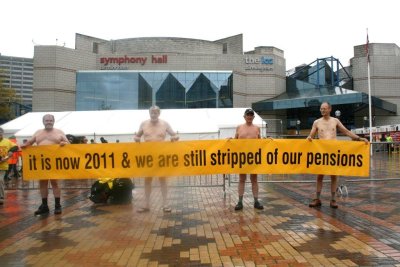
* * * * * * * * * * * * * * *
6th Annual Leadership of Pensions Summit
15th September 2011
This conference, organised by the Financial Times and held in London, was attended by Adrian Segundo on behalf of PAG.
The principal speaker was Steve Webb, Pensions Minister and Adrian was chosen to ask the first question: Given his comment on 2nd September on the Need for
Fairness with public sector pensions on ITV Tonight, what was his
view about the UNFairness when it comes to FAS/PPF? He didn’t answer the question (not of the first time), talking instead about his support for PAG when in opposition, explaining about FAS now being nearly as good as PPF (wrong: PPF’s worse!), and moving on to say how fair he thought auto-enrolment from next year will be. As questions were taken in groups of 3, Adrian was unable to press the point further.
Next up was Rachel Reeves, Labour's shadow Pensions Minister. This time Adrian got the second slot and asked "What is the Opposition policy regarding
unfair treatment of those in FAS/PPF especially when it came to lost
indexation?" She took this to mean change from RPI to CPI, but agreed to
speak to Adrian afterwards, when he was able to elaborate and arranged to write to
explain our plight.
The organisers were friendly and sympathetic and invited PAG to consider whether we would like to consider topics and speakers for a panel session next year. Adrian found that the microphone always seeemed ready to move in his direction and there was quite a bit of head nodding in the audience when the issue FAS/PPF unfairness came up. Adrian also distributed leaflets which were well circulated and not just discarded, as often happens.
It is clear from this that there is a groundswell of sympathy in the pensions industry for our situation. If we keep up the pressure, sooner or later the Government will have to improve what's on offer if they want the next generation to invest in pensions.
* * * * * * * * * * * * * * *
Exchange of Letters with Minister
6th August 2011
PAG have been in repeated contact with the Pensions Minister Steve Webb since he took office. Here is a copy of PAG's latest letter, and of the Minister's reply.
* * * * * * * * * * * * * * *
PAG Response to the WRIC Report
Press release 4th August 2011
The Pensions Action Group submitted written and oral evidence to the Workplace Retirement Income Commission, and has studied the report which was published on 1st August 2011. (A copy of the written submission is available here.)
Lord McFall and his colleagues have done well to produce such a comprehensive report on such a complicated subject within a tight timescale, and we welcome many of the recommendations.
PAG members had, however, taken many of the actions now recommended by Lord McFall to secure a relatively comfortable retirement, only to lose most, if not all, of their savings when their scheme closed, mostly due to company insolvencies, government maladministration and inadequate protection measures.
The PAG gave evidence of the extreme distress that the loss of these pensions had caused, and continues to cause, due to the lack of original scheme level indexation and other punitive clauses within the Financial Assistance Scheme.
A key part of the success of any workplace pension involves trust and confidence, as stated many times in the WRIC Report. PAG members know first hand about the inadequacies of previous pension regulations, and the slowness and unwillingness of government to remedy their mistakes. Mis-leading statements from government are still being made about the FAS and PPF protection funds paying 90% of member’s lost pensions, while the small print in the regulations dilutes the figure in many cases to nearer 50%.
The PAG also suggested in their evidence that to encourage pensions savings politics should be kept out of pensions, and that any regulatory mistakes must be immediately corrected and those affected must be fully compensated without delay.
Lord McFall quite rightly noted our comment that ‘to put things right for the future, start with the wrongs of the past’.
Finally, to encourage enrolment in a new national pensions scheme, the PAG recommended that all MPs and senior civil servants pensions should be included in any new scheme. Only then will the public be sure that their savings are safe!
(Copy of original press release available here.)
* * * * * * * * * * * * * * *
PAG news update
8th June 2011
Although the Pensiontheft site has been quiet of late it does not mean there is nothing going on. In fact a lot is still happening BUT we need your help to move things along.
Having received positive noises from the (now not so new) Pensions Minister Steve Webb we had been hopeful that, as he was sympathetic to our cause, we would see some movement consistent with his comments whilst in opposition.
We are producing a document shortly comparing what Ministers said in opposition as opposed to what they are doing now. Through the efforts of some members of the group, papers have been submitted regarding cost saving ideas (Peter Laspinkas and Kenneth Molloy) and, through Peter again, some ideas around the National Insurance Fund. All suggestions were gratefully received but received negative final responses, although we are told that some investigations are still ongoing. We are in the process of chasing for some movement.
A number of members have responded to the request for submissions from the Workplace Retirement Income Commission and Richard Nicholl is to shortly give oral evidence to the Commission.
A number of people have written to the Parliamentary Ombudsman and have involved their MP's in complaining that the Govt are not fully implementing her recommendations.
A small number of members continue to be very active with their own MP but not enough of you.
John Benson continues to be very active in south Wales and has had meetings with the Minister supported by Ros.
We have written to all members of the Government committee who debate issues affecting FAS.
We have visited PPF (FAS) to work with them on member communications and member queries.
We are in discussion with legal advisors regarding the level of benefits being paid.
We are planning demonstrations at the party conferences and we are compiling a list of statements made by current Ministers when in opposition.
You can do your part by contacting your own MP telling them the issue is not solved and tell (ask) them to raise the issue with Steve Webb as we are not getting 90%. You can also write to the Parliamentary Ombudsman. Let them all know we are not satisfied with the current situation and we will not go away until we see a FAIR settlement. Let us know if you need any help with drafting letters and finally is there anyone who has Liam Byrne as their MP?
Our major concerns are ;
- We are not getting what we paid for
- We are not even getting 90%
- We have virtually no inflation protection
- The Government are not paying through meanness benefits that were due to be paid prior to May 2004
- They are denying access for those who cannot get work over the age of 55 because their pension age is 65 whereas if it were 60 they would get access
We're not going away just yet!
* * * * * * * * * * * * * * *
FAS payments now indexed by CPI
5th April 2011
The DWP has released a short statement confirming that FAS payments will be indexed on the basis of CPI rather than RPI as from 1st April 2011. The statement, and a copy of the regulations as approved by Parliament, can be found on the FAS website. The full response to consultation can be found here).
* * * * * * * * * * * * * * *
Cardiff Demonstration at the Welsh Assembly
22nd March 2011
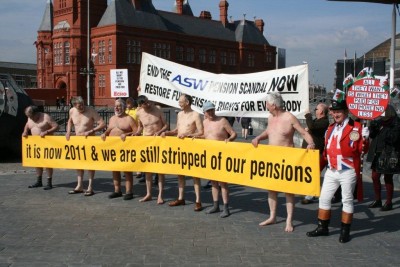
40 - 50 people joined us in the sunshine of Cardiff Bay for a successful protest outside the National Assembly of Wales today. We performed the tradional "stripped of our pensions" and had lots of photographs taken and not a goosebump in sight. John Benson, who organised the meeting, gave a heartfelt address and was warmly applauded by the AM's who came out to meet us, including John Griffiths, Jane Hutt and Chris Chapman from the Labour Party and Chris Franks and Leanne Wood from Plaid Cymru, several of whom also addressed the gathering. They all priased our on-going efforts to achieve justice and expressed admiration for our courage in continuing to campaign. They all offered their support and encouragement. Jo Thornhill from the Mail on Sunday covered the protest as did a photographer and journalist from our local newspaper.
* * * * * * * * * * * * * * *
Government to Reduce Indexation on FAS & PPF
3 March 2011
The Government has published its response to the consultation on the change in indexation from the Retail Price Index (RPI) to the Consumer Price Index (CPI) for both the FAS and the PPF. Copies are available here
A measure of the impact of this change is that the PPF will be able to reduce its levy by £120 million per year as a direct result and the savings from the FAS will be similar. This is money which will come directly out of the pensions of members, who are already receiving inadequate compensation for their losses.
PAG and its members made vigorous representations about the impact of this change and we have also been putting our case directly to the Pensions Minister Steve Webb, but he has hardened his heart. His response has been merely that he considers it to be a "... more appropriate measure of the inflation faced by pensioners." We disagree, for a number of reasons. For instance, the CPI ignores Council Tax - the average PPF pension in payment is £3,823 and the average council tax is £1,440, i.e. about 35%. CPI doesn't sound much like an appropriate measure of pensioner inflation to us.
He also points out that it is a "... more stable measure than RPI". This is true, but it means that when there is a sudden change in, say, fuel prices, the CPI moves up less than the old RPI and hence the increase in the PPF and FAS payments are less. That also doesn't sound like a good thing from our perspective.
We are not the only ones who think Mr Webb is wrong on this In a recent letter, the Vice President of the Royal Statistical Society wrote to the Chair of the UK Statistics Authority that the CPI is not a "sufficiently good measure of price inflation as experienced by households" and it does not meet the Code of Practice when used to measure household prices.
However all objections have been swept aside and the regulations have been laid before parliament. Indeed, this was done before the response to the consultation was published, which perhaps gives an indication of how much consideration was given to the responses.
The fact of the matter is that the CPI has been designed so that, over the long term, it will give a lower estimate of inflation than the RPI. It seems clear to us that this change is driven by the desire to save money by the Government, for itself and for its friends in industry, at the expense of vulnerable people who have already been damaged by Government maladministration. If it wasn't, the savings would be passed back to members in other benefits.
It's not surprising that the coalition parties kept quiet about their intentions in their manifestoes, but their day of reckoning will come.
* * * * * * * * * * * * * * *
Workplace Retirement Income Commission Seeking Views
2 February 2011
A new independent commission has been established by the National Associations of Pension Funds to review the provision of workplace retirement income in the private sector and to advise government. It is headed by Lord McFall (who was previously chair of the Treasury Select Committee in the House of Commons) and he is actively seeking views from all quarters as to how pensions should be provided in future.
A submission has already been made on behalf of PAG, pointing out that pension savings depend on trust, and that few people will trust in pensions unless they see that we are compensated properly for our losses which resulted from following Government advice.
However, much more is needed. If each of us writes to tell our story, and how the pensions debacle has affected us personally, it will amount to a body of evidence which would be very hard to ignore.
Details of their terms of reference and their approach to the problem can be found
here.
Send your response to Shiona Charlery at wric@wricommission.org.uk or you can send a letter to:
Shiona Charlery
Workplace Retirement Income Commission
6th floor
138 Cheapside
London
EC2V 6AE
You can also leave a comment (and read other comments) on the site
here.
* * * * * * * * * * * * * * *
PAG March at Conservative Party Conference
5th October 2010

In opposition, the Coalition parties pressed for improvements to the compensation schemes for workers who have lost their pensions but now that they are in Government they are planning to cut back the payments.
We had hoped that there would be no need in the future for our trademark "Stripped of our Pensions" protest but it would seem this is not to be. We therefore, yet again, performed our striptease, this time at the Consevative Party Conference in Birmingham on a bright sunny October day.
We assembled at the Council House in Chamberlain Square and marched noisily to the International Conference Centre where the conference was being held. We were joined there by union members, members of the Equitable Members Action Group and the Visteon Pensions Action Group, all of whom have lost pensions through the failures of Government.
Outside the conference we handed out leaflets to delegates as they came and went, made lots of noise, took it in turns to use the megaphone to explain to those in the conference hall why we were there, and finished off with the ever-popular strip. Competition to join the line-up is intense, so the chosen few wear their joke shorts with pride.
The PAG will continue to protest until the Coalition turns their fine words into social justice. All we want is what we paid for and we are not going away until we get it.
(See Documents page for full press release)
* * * * * * * * * * * * * * *
Coalition to reduce FAS & PPF payments
1st October 2010
The indexation on the FAS and PPF payments is pitiful enough as it is (a maximum of 2.5% pa in respect of post-1997 contributions only), but the Coalition is planning to reduce it further. by moving the basis of calculating inflation from the Retail Price Index (RPI) to the Consumer Price Index (CPI).
There are a number of reasons given for this but the essential point is that the CPI gives an estimate of inflation which is about 0.5% lower than RPI. Given that FAS & PPF indexation is capped at 2.5%, that means that we will lose at least 20% of our indexation - and an even higher proportion when inflation is lower. And each year the loss will be cumulative - we will never get it back.
Worse than this, the CPI will be used in a number of other calculations, which means that our initial payments will be lower as well. So, when we retire, we will start with less and it will grow more slowly than before. And those with the longest wait until retirement will lose the most.
The DWP itself puts it like this:
"The Government considers that the CPI will on average provide a lower rate of inflation than the RPI. This means that payments to FAS and PPF members are expected to be lower over time than if inflation continued to be measured on the RPI basis. Other things being equal, this suggests a reduction in the levy the Board of the Pension Protection Fund would otherwise be required to set and a reduction in the cost to the taxpayer of the FAS."
We encourage our members to respond and defend their payments. The consultation document can be downloaded from here
It gives full details of how to respond. The closing date is 3 November.
* * * * * * * * * * * * * * *
Liberal Democrat Conference
Liverpool
21st September 2010
In view of the support which we had received from the Libdems in opposition, and the ongoing dialogue with Steve Webb, we did not plan a high-profile demonstration for their conference, but they did not escape our attentions entirely. Willlie Riggans and his colleagues were there in Liverpool on 21 September under the Unite banner with placards and leaflets.
Over 900 leaflets were handed out and it was explained to delegates how supportive Steve Webb had been in opposition but now he was planning to cut our FAS payments. Many delegates were under the impression that CPI would be better for us than RPI, so it was good to be able to give them the correct information. On the whole, the action was well received and it sent the clear message that we are not going to lie down quietly and go away.
* * * * * * * * * * * * * * *
Pensions and the General Election
Party leaders respond to Pensions Action Group
30 April 2010
(Pensions Action Group Press Release)
The Pensions Action Group wrote to each of the main party leaders on the 15th March expressing serious concerns at the damage that had been done to the UK pensions system and the severe impact on the retirement expectations of millions of workers.
More specifically, we raised the shortcomings of the Government’s Financial Assistance Scheme (FAS) which will affect over 140,000 people who lost some or all of their pensions before 2005. This loss was as a result of the closure of their occupational schemes, usually when their employer went bankrupt. The Government had encouraged people to join these schemes and told them that “your pension will be safe whatever happens to your employer”. But whilst the savers in Icelandic banks, and the pension funds of the rescued banks have been 100% protected, these pensioners may get as little as 50% of the pensions they saved for.
Among the most serious concerns with the FAS that still need addressing are:
- An almost complete lack of inflation protection, which should reflect what each scheme would have provided.
- The lack of any compensation at all prior to May 2004 for those who retired before that date.
The responses from the politicians have been disappointing:
Nick Clegg:
The reply from his response team did not specifically answer our concerns, although we know they have been supportive in committee.
David Cameron:
No direct response but a PAG member has received a reply from Theresa May which was very supportive, but without any commitment and, ominously, referred to the state of public finances.
Gordon BrownDeafening Silence
Given the crisis facing future private sector pension provision, and in particular the suffering of those still not receiving adequate FAS compensation for the full pensions they expected (and had paid for) we are very concerned not to have received adequate proposals from the party leaders and, in particular, no response at all from Labour.
Pensions are based on trust. Why should anyone save in a pension scheme when they can see how easily an earlier generation has had their pensions taken from them?
If they are at all serious about restoring confidence in pensions they MUST resolve the few remaining issues surrounding the FAS, which simply does not deliver anywhere near the 90% headline claimed both by the Pensions Minister and the Prime Minister.
* * * * * * * * * * * * * * *
ASW Pensions Protest
Welsh Assembly, Cardiff Bay
07:45 to 10:30, 20th April 2010
(Pensions Action Group Press Release)
Ex-employees of ASW who lost the majority of their pension when ASW went into receivership will be protesting and handing out leaflets outside the Welsh Assembly from 07:45am to 10:30am on Tuesday 20th April.
The theme of the protest will be the hypocrisy of Labour's Election slogan:
"A Future Fair for All"
when in reality it is only fair for the pension funds of the failed banks, fair for the savers with offshore Icelandic banks but is most certainly NOT fair for the employees of ASW, and other companies, who lost a large part of their pensions when their companies went into receivership.
In his keynote speech at the 2009 Labour Party conference Gordon Brown claimed (exact words, our emphasis):
"Our choice was clear; we nationalised Northern Rock and took shares in British banks, and as a result not one British saver has lost a single penny."
As the protestors have all lost many pennies from their pensions savings they view this speech with some anger.
"We thought it was all over, why are you demonstrating again?"
It has become quite clear that MPs believe that the December 2007 announcement by the Government was the end of our campaign, and that our pensions had been restored. This is not the case.
We paid for, expected, and were told by the government that we were guaranteed 100% of what we had saved for, but not only are we not getting 100% we are not even getting the 90% promised by the Prime Minister! In some cases people are getting less than 50% of their pension entitlement.
So far we have seen our pensions eroded by:
- Almost no post retirement protection against inflation
- Unfair treatment for seriously ill members
- Failure to backdate the benefits before May 2004
- A restrictive CAP on our benefits which penalises members with long service
- Regulations that fail to recognise the benefits members have sacrificed
- Unfair treatment of contracted-out benefits
- Restrictions on members’ rights to draw benefits
Summary
All we ever fought for has been justice, which needed the combined strength of the Parliamentary Ombudsman, a Select Committee and the High Court to make the Government realise they HAD to respect the law of the courts and the views of the Ombudsman!
We still feel that justice has not been delivered, and given the attitude to some banks’ pension liabilities we again feel second-class citizens as far as our pensions and justice are concerned.
See our website www.pensionstheft.org for details of our campaign.
- - - - - - [ Ends ] - - - - - -
Notes for Editors
1) The Pensions Action Group is a non political organisation representing people who lost most, in some cases all, of their occupational pensions when their pension scheme was wound up, either because their employer became insolvent or the employer, (perfectly legally), decided to close the scheme. The steelmaker ASW failed in July 2002.
Such members now receive some payment from either the Financial Assistance Scheme (FAS) or the Pensions Protection Fund (PPF) depending on the date of the wind-up, but MPs and the public are being misled about the level of protection these schemes provide.
2) Under the FAS, only pensionable service between April 1997 and the start of scheme wind up qualifies for very limited increases. All schemes in the FAS by their very nature will only ever have a very limited post 1997 qualifying period even though the majority of schemes actually provided escalation on all service, both before and after 1997.
Under the PPF again it is only post 1997 service that increases in payment, but as each year passes the proportion of post 1997 service increases and in 2009 it is already potentially 12 years more than the first FAS scheme failures.
3) Unlike the Consumer Price Index and Retail Price Index pensioner inflation is greater due to their higher proportion of income being spent on energy, utility bills and council tax, and they do not benefit from the reductions that apply to some of the other components in the indices.
4) The income (pension) cap that applies to FAS penalises long service employees, and without indexation the cap reduces in value as does the FAS pension, whereas the Government told us that the cap will retain its value!
5) At a time of high unemployment it is almost impossible for the elderly (over 55) to gain employment and they are being denied access to albeit reduced pension benefits
6) The main reason that the government gives for not paying 100% is that the tax-payer cannot afford it. They have, though, paid at a stroke to restore bank pensions in full. The cost of the banks' pension was much much greater than the retoration of our pensions so this argument is plainly false.
* * * * * * * * * * * * * * *
Visteon London demonstration
31 March 2010
Congratulations to the Visteon Pension Action Group on their successfull denonstration. In the sort of financial smoke and mirrors which are becoming all too familiar, their original employer (Ford) hived their jobs off into a new company which went bankrupt and they now refuse to take any responsibility for the deficit in the pension fund. About 500 supporters gathered in Holborn and then marched to Downing Street to hand in their petition to Gordon Brown, and then on to Parliament Square where they were addressed by a range of speakers. This was an excellent turnout on a drizzly day with a bitter wind blowing, and it shows that working people will stand and fight for their pensions. It was also good to see such solid support from their union, Unite, who helped to organise the event.
A number of PAG members joined the march and PAG is supporting the VPAG in their battle to avoid being tipped into the PPF - more power to your elbow!
There is a full account of the event on Indymedia (dead link - an alternative account may be found here).
* * * * * * * * * * * * * * *
Labour Party Conference
29 September 2009
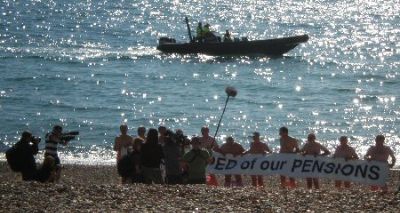
Over 200 people from all over the UK turned up at the Labour Party Conference in Brighton to protest about lost occupational pensions. The protest started with a march from the pier to the conference centre where the group stood for about 30 minutes chanting.
Eleven people then took part in the traditional "Stripped of our Pensions" which attracted the usual media interest. The strip was intensely filmed by Channel 4 for their Dispatches programme on pensions and by Sky for a programme scheduled for November
There was a very peculiar quiet atmosphere at the conference. Normally conferences are buzzing with reporters, protests & spectators but this year everything seemed very subdued. Many Labour MPs did not attend. We only saw one other protest group (post office workers who had a 24hr strike on the Tuesday) and the largest group of individuals around the conference were children from a local school who were doing a mapping exercise with trigonometry on the beach! All very weird.
As usual the weather was beautiful. In the seven years we have been protesting we have never had to do it in rain. It was so hot that several of the stripped protestors went for a swim in the sea afterwards.
In his keynote speech at the conference Gordon Brown claimed (exact words, our emphasis)
"Our choice was clear; we nationalised Northern Rock and took shares in British banks, and as a result not one British saver has lost a single penny."
As the protestors had all lost many pennies from their pensions savings they viewed this speech with some anger. Contray to popular belief the pensions have not been fully restored and there are many outstanding issues such as protection against inflation.
The group have already met with Lib Dem spokesman Steve Webb MP at their conference in Bournemouth and with Tory spokesman Nigel Waterstone MP at the Tory party conference in Manchester .
Thanks as ever to Willie Riggans and Alan Marnes who did the difficult but important behind the scenes work liaising with the police.
* * * * * * * * * * * * * * *
New Secretary of State and New Pensions Minister
5 June 2009
Following the cabinet reshuffle Yvette Cooper replaces James Purnell as Secretary of State and Angela Eagle replaces Rosie Winterton as Pensions Minister (who was only in the office for just over six months). This makes 15 cabinet changes at the DWP in the 12 years of labour rule, including several months when there was no pensions minister at all. As Peter Lapinskas says: “I love pensions ministers - I love the whooshing sound they make as they speed through on their way to other jobs”.
* * * * * * * * * * * * *
Pensions Protest at Westminster
3 June 2009

Over 100 people turned out for a protest on Parliament Square. The protest, originally planned for early May but postponed because of police problems with illegal Tamil protests, was arranged because of omissions in the proposed changes for the FAS/PPF following the recent government consultation. Given that the protest was midweek (to coincide with PMQs and take place when MPs were present) the attendance was very good with people coming from as far afield as Aberdeen, Glasgow and Wales; Kenneth Malloy, even flew over from Spain for the day!)
The main points of the protest were:
- Unfair treatment for seriously ill members
- Almost no post retirement protection against inflation
- Failure to apply the benefits before May 2004 (when the FAS started)
- A restrictive cap on our benefits (which penalises members with long service)
- Regulations that fail to recognise the benefits members have sacrificed
- Fair treatment of contracted-out benefits
- Restrictions on some members’ rights to draw benefits
- No apology from the government
John Bull (Ray Egan) attended and we performed the traditional "Stripped of our Pensions" photoshoot which drew the usual crowds of reporters, photographers, TV cameras and inquisitive tourists. We got good coverage in the press and on local & SKY TV.
Several MPs came out after PMQs to show support including (in no particular order) Sandra Osborne, Mike Penning, Paul Burstow, Bill Cash & Stewart Hosie. Apologies for any omissions, it was quite crowded. We also had many apologies from MPs who were away campaigning in their constituencies for the elections on the following day.
We should make a special mention of Alan Marne's part in the protest. For all our protests in recent years Alan has had the unenviable and unrecognised behind the scenes job of liaising with the police.
Any protest in London requires a mountain of paperwork, forms, risk assessments, interviews and planning meetings with the police and persuading them to allow events such as the Stripped of our Pension photo-shoot.
This event was complicated by the ongoing Tamil and other protests in Parliament Square. Originally the protest was organised by Alan for early May but this was moved at police request because the Tamil protestors were threatening violence. As a result Alan had to do the job twice.
It takes a lot of work, a lot of time and repeated trips to London before the event. We should thank Alan for his work.
Thanks also to Peter Wheeler and Brian Mealing who supplied the leaflets and placards, Peter Lapinskas & Adrian Segundo for the organisation on the day & the very striking yellow T-shirts and the Metropolitan police who controlled events with their usual good humour.
* * * * * * * * * * * * *
Welsh Labour Party Conference
25 April
Report by John Benson

14 former ASW workers arrived at the Conference Centre in four cars about 8:00 am with a big banner and placards, and to give out leaflets to the politicians, their staff, delegates, and union officials. In all, we gave out over 300 leaflets.
Spoke with ministers, MPs and AMs before they went in to the Conference, telling all of them that our campaign for full compensation will continue. I spoke at great length with, and gave a letter to, Paul Murphy (Welsh Secretary) together with a letter for him to give to Gordon Brown, outlining our case and asking for Gordon Brown for once to personally reply (but we won’t hold our breath on that one )
Jane Hutt (Labour AM), when told we were not going away till we get Justice, answered: “We know that.”
Glennis Kinnock was asked to give Neil our love but we continue our campaign.
Rhodri Morgan (First Minister) this time had no choice to take a leaflet from us. It was a pleasure to see his grumpy face - it was like a ripped dap. His wife Julie did find time to speak to us
Community General Secretary Michael Leahy came to speak with us. He told us we have come a long way, but he did not think we would get full compensation. He also was told that we are not going away, and he replied that he was meeting James Purnell soon.
They would not let us near the Conference entrance, but Chris Bryant (Labour MP) told me that Harriet Harman was arriving later and asked a Senior Officer if we could speak with her as she was going straight to the entrance when arriving. He said that only one person could speak with her so I spoke to her for three or four minutes, told her about how the Government could find hundreds of billions of pounds of taxpayers money to bail out irresponsible Banks, pay millions of pounds of taxpayers money to Bankers for failure etc, yet refuse to pay us our Pensions in full. I mentioned the average ASW workers Pension was £7,000.
She agreed with our anger, and then stated she was trying to sort out Equitable Life. I asked her if she could arrange a meeting with the Prime Minister, or even herself, and also whether she considered what the Prime Minister and the Government had so cruelly done to us regarding our promised pensions was morally right and fair. I would call off the Protest's here in Wales in which replied, I will see, with that she hurriedly went inside the Centre.
* * * * * * * * * * * * * * * * * *
Protest at National Assembly of Wales
17 March 2009
Report by John Benson
A great protest here in Cardiff with good coverage on BBC Wales Radio, BBC Wales Television, our local paper, and our good friend and supporter, Jeff Prestridge from the Mail on Sunday sent Toby Walne along to cover the protest.
We had good support from Assembly Members and their staff, with the Conservative and Liberal Democat leaders coming out to speak, also Plaid AMs. Plaid Cymru AM Leanne Wood made a statement in the Assembly saying that he UK Government must uphold the Parliamentary Ombudsman's recommendations.
Nick Bourne, leader of the Welsh Conservatives, and Kirsty Williams, leader of the Welsh Liberal Democrats, want me to draft a letter with all the bullet points we want brought up to support our fight for full compensation, they will then get Assembly member's to sign the letter, and then take our cause further.
Once again Rhodri Morgan and his gang declined to come out and speak with us.
Kirsty Williams is hopefully going to arrange a short meeting with Nick Clegg when he comes to Wales.
Many thanks to all who attended the protest, especially those from the South East, who must have travelled hundreds of miles.
Also many thanks to John Bull (Ray Regan), who turned up to support us, and Peter Wheeler and Brian Mealing who supplied the leaflets and placards.
* * * * * * * * * * * * *
Government publishes pension consultation document
11 February 2009
The Government has just issued the consultation document which will lead to the finalisation of their proposals to compensate us for the losses we have suffered through their maladministration of final salary pensions. There have been some substantial improvements but they still fall a long way short of full compensation. We have until 25th March to send them our views.
In December 2007, the Government announced a series of improvements to the Financial Assistance Scheme and over the last 14 months they have organised a number of public consultations and introduced various regulations to bring these into effect. However, up until now, these processes covered only the relatively uncontroversial issues – the more ‘difficult’ issues were delayed until the final round of the consultation, and this is the round which has now started.
If you have been affected by a loss to your pension resulting from the insolvency of your employer, this is what you need to do.
* Download a copy of the consultation document which is available here.
* Read it carefully, especially insofar as it affects your own position.
* If you feel that the payments on offer fall short of what you feel would be sufficient compensation, or that you will be treated unfairly relative to others, or you have other relevant points to make, write to the address below and briefly state your case. Your response will carry much more weight if you use your own words (rather than copying from other documents) and can relate your comments to your own situation.
* Send your comments (to arrive by 25th March) to:
Financial Assistance Scheme Consultation
Department for Works & Pensions
Private Pensions Policy
Adelphi 3rd Floor
1-11 John Adams Street
London WC2N 6HT
* Email a copy of your letter to PAG (contact-us@pensionstheft.org), so that we can incorporate your views into the PAG position
* Watch out for the next newsletter which will give details of the PAG position and forthcoming PAG actions.
We have fought long and hard to achieve justice and have come much further than anyone thought possible at the outset, in the teeth of determined Government opposition at every stage. Now is the time to finish the job!
Summary of the Government Proposals
(The following document has been prepared to help you to identify the key areas in the new consultation document and respond accordingly.)
PLEASE READ, UNDERSTAND AND WHERE APPROPRIATE MAKE INDIVIDUAL REPLIES. THE MORE PEOPLE THAT MAKE KNOWN THEIR VIEWS THE BETTER CHANCE WE HAVE OF OBTAINING ADDITIONAL CHANGES
Ill health and early retirement
There has been a vast improvement in both the ill heath and serious ill health terms but PAG still wish the Government to go further and to allow ill health payments within 10 years and not 5 years of scheme retirement age with a minimum of say age 55
Further we feel that, particularly in the current economic climate, voluntary early retirement on any grounds should be allowed after age 55, albeit with an actuarial reduction
PPF allows reduced voluntary early retirement pensions
Pre May 2004 service
There are no signs of movement and we are studying some figures produced by FAS comparing benefits that if paid before May 2004 would lose the revaluation up to the date of payment, and therefore people would not be any better off in the long term.
Costs
There is a statement about tax payer costs which is wrong as they are guilty and in any event the Young review generated £1.7bn and would have been more if they had listened to Ros
Revaluation pre retirement
We have been seeking scheme basis of revaluation rather that RPI with a 5% maximum but there are no signs of movement. We have pointed out that those further away from retirement may not get 90% of their accrued pension because of this.
Partners
This looks like good news and something we have fought for but we ask anyone affected to study the terms closely and let us have their comments on the proposals
People with different retirement ages in the same scheme
The approach is wrong and if a scheme had benefits payable at different ages they should be paid without reduction at that age and this is I believe where it suits FAS to act differently to PPF. There are some outstanding legal issues around this including the Foster Wheeler case ruling which for some schemes gave a right to all benefits at the earliest age
If anyone thinks they are in a position affected by this they should respond with details to FAS
Annuity Rates
We will comment here on not using the actual reduced pension for people who took tax free cash if that actual figure was available and we would also comment on the changing annuity rate market and are FAS reflecting this in their factors?
The Cap
The cap hits long-service members. It is an argument we have had but not won. But we would add that on one hand they are revaluing the cap for all the pension (subject to the cap) but not doing the same with the actual pension where only post-97 bit gets re-valued and at a lower rate than the cap
Post Retirement indexation
This has to be our main thrust and we will argue strongly with threats about resolving this. We have all seen and felt the effects of inflation and in particular the impact for pensioners
There are some aspects of the detail around the interplay between FAS post-97 service indexation and any residual scheme benefits that may carry some indexation (GMP for example )
We must fight for protection of indexation on any residual benefits and for full indexation of all service if the scheme provided it
Tax free cash
Although not ideal, following pressure from PAG we have least got FAS to allow the GMP (Contracted out benefits) to be commuted which was not the case when we started the consultation process
- - - - - - - - - - - -
This is only a brief summary - you must read the document yourself and send in your own comments.
We are considering what further action we need to take which includes meeting the Minister and the opposition spokesmen.
Please keep us informed and also copy in your MP with any responses you send.
Severe Ill-Health
Notes by Dr Ros Altmann
The regulations which were designed to give a much fairer payment system to those in severe ill-health have been laid in Parliament today.
The aim is to have them debated by March ready for payments to start in April.
This is long, long overdue and, sadly, some very ill people have died before getting the money they should have had.
After very long, tortuous negotiation, these regulations are designed to offer unreduced pensions to people with serious illnesses and severely shortened life expectancy. The regulations cater for two types of such people.
Firstly, they will help those who have already been ill for some time and who are obviously the most seriously affected by the loss of the pension they would have had from their scheme. The Government has finally agreed to backdate the pension to the date when the serious illness started (subject of course to some medical confirmation of this) after May 2004. The members who qualify under this category will receive the full FAS payment (without reduction for early payment) and the first payments will include a lump sum to reflect those payments which relate to past years not yet paid.
Secondly, the DWP has agreed that widows of those who have died will receive the payments their husbands would have had if they had lived, rather than the normal half of the FAS payment from their date of death, so again these widows will receive some lump sum back payments.
Thirdly, there will be special provisions for those who are already getting money from the FAS under the ill health scheme already in place, but whose payments have been reduced. If you are under the ill health provisions with a reduced FAS payment, then you should get back pay for the period from when you became seriously ill with severely shortened life expectancy.
Fourthly, anyone who becomes seriously ill from now on and whose medical condition leads to a severely shortened life expectancy such that they may not live more than another 5 years, will be able to claim early full FAS payments. This is far better than the existing arrangements which would only pay reduced payments to reflect taking the pension early and which would be so unfair.
All of this applies to those over age 55 as far as I can tell.
It is now important to get these regulations debated and passed in the Lords and Commons as soon as possible.
If you think these regulations apply to you, please let us know and also please write to the FAS to ensure that they have the information they need in order to assess your claim and start payments as soon as possible after the Regulations are passed by Parliament. You will need medical evidence and you will need to have contacted your trustees to let them know you are seriously ill.
The DWP response to the ill health consultation is available here.
* * * * * * * * * * * * *
2008 Labour Party Conference
Willie Riggans of UEF is organising a protest at the Labour Party Conference in Manchester on Tuesday, 23rd September 2008. Meet at Castlefields at 11:30 a.m. then march to Labour Party Conference and hold a demonstration outside at 12:00 noon. Everyone welcome.
The start location can be found here
The theme of the protest will be “Fairness for All” , namely full restoration of pensions entitlement (i.e. 100%, not 90%, indexation etc.) All that is required is the pensions we paid for.
For further details contact Willie.Riggans@bharatforgescottish.com
or via his mobile 07793-968227
The protest is preceded by a (separate) protest by Equitable Life members to which people are also invited.
* * * * * * * * * * * * * * *
FAS Payments
The FAS are now making payments to about 8,000 people who have reached their normal scheme retirement age. This includes back-payment for people who have passed their retirement date. In future the FAS will contact people a few weeks before their retirement date.
If you have reached your scheme retirement age and have not heard from the FAS you should contact their operational unit in York:
Financial Assistance Scheme
PO Box 702
York
YO32 9XR
Telephone: 0845 6019941
Further information can be found on the FAS website.
The commonest reason for non payment are trustees giving incomplete (or no) details about scheme members and people not returning the form that the FAS sends out just before retirement date. There are something like 200 people who have not returned the forms and are consequently not being paid!
Payments (including back-payments) are taxed at the standard rate. If you are in receipt of a substantial back-payment and/or have other income it is possible that the back-payments can take you into a higher rate tax bracket. You are entitled to spread the back-payments over all the years they relate to in order to reduce the tax liability, and the FAS provide details as how to do this. Do not ignore this information; you could end up paying far too much tax
The group are having constructive discussions with the DWP to resolve issues such as the tax. Other discussion points include Revaluation of benefits pre retirement, Retaining the value of the cap, Ill health provision and the current restrictions, Early retirement, Tax free cash, Protection of benefits that are in excess of FAS levels, Spouses & partners (including unmarried partners), Children's benefits, Pre 2004 benefits, Schemes with split retirement ages, Scheme retirement date definitions and the now included Solvent schemes
Everyone is aiming to have all the legislation in place by early 2009
* * * * * * * * * * * * *
Victory in the Court of Appeal
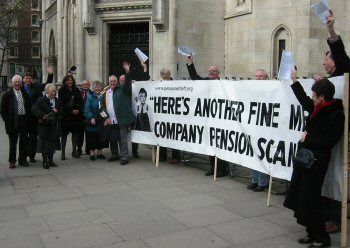 The long awaited Court of Appeal verdict was announced on Thursday 7th February 2008. The three Court of Appeal judges became the latest to condemn the unprecedented stance taken by Work and Pensions Ministers to reject a Parliamentary Ombudsman report that found maladministration and injustice in the treatment of up to 125,000 occupational pension scheme members. The language of the verdict was, if anything, more damning than that in the High Court, and causation has now been included. A detailed analysis is given below. The long awaited Court of Appeal verdict was announced on Thursday 7th February 2008. The three Court of Appeal judges became the latest to condemn the unprecedented stance taken by Work and Pensions Ministers to reject a Parliamentary Ombudsman report that found maladministration and injustice in the treatment of up to 125,000 occupational pension scheme members. The language of the verdict was, if anything, more damning than that in the High Court, and causation has now been included. A detailed analysis is given below.
The DWP immediately appealed against the verdict and asked for the case to be taken to the House of Lords. This application was refused, however the DWP can still apply directly to the House of Lords. It will be something like six months before the Lord Law’s decision to hear the appeal is known.
Press Releases from Dr Ros Altmann and our solicitor,John Halford of Bindman and partners, can be found on our Documents page and a typical press article can be found on our Media Comments page.
What did the Court of Appeal rule?
1). The Parliamentary Ombudsman has an important role in ensuring ministerial accountability - if a Secretary of State does not accept a finding of maladministration, he is obliged to provide a full, reasoned and “cogent” explanation to Parliament.
2). It is not enough for a Secretary of State to have a different, bona fide view from that of the Parliamentary Ombudsman; there must be some respect for her office and the nature of her expert investigation. In the words of Lord Justice Chadwick (para 91):
“I am not persuaded that the Secretary of State was entitled to reject the Ombudsman’s finding merely because he preferred another view which could not be characterised as irrational. As I have said, earlier in this judgment, it is not enough that the Secretary of State has reached his own view on rational grounds: it is necessary that his decision to reject the Ombudsman’s findings in favour of his own view is, itself, not irrational having regard to the legislative intention which underlies 1967 Act [which established the Ombudsman’s office]: he must have a reason (other than simply a preference for his own view) for rejecting a finding which the Ombudsman has made after an investigation under the powers conferred by the Act.”
3). Here (as Judge Bean had concluded in the High Court) it was not rational for the Secretary of State to reject the Parliamentary Ombudsman’s findings that the government material about occupational pensions was misleading. For example, Lord Chadwick commented (at para 94):
“it is impossible to suggest that the reader of leaflet PEC 3 would not have been led to think that both pensioner members and members in service were to be provided with the same degree of protection: the protection would be provided in a manner which reflected the difference between rights to a pension in payment and future rights but the degree of protection would be the same in respect of each class of members.”
4). However, Parliamentary Ombudsman findings are not ‘binding’ as the campaigners and the Ombudsman had argued, save in the Local Government Ombudsman context which is different because there is no Parliamentary accountability for Councils and the statutory intention was different.
5). It was not correct for Judge Bean to find that there was no causal link between the identified maladministration and many of the forms of injustice identified by the Ombudsman – outrage, lost opportunities to make informed choices or take remedial action, distress anxiety, uncertainty and distortion of reality. These were caused by the maladministration and it would be irrational for the Secretary of State to argue otherwise.
6). The Secretary of State was, however, entitled to conclude that the maladministration had not cause or significantly contributed to all losses, and that he had not acted maladministratively when setting the MFR level on Government Actuary Department advice.
Why is the Pensions Minister appealing to the House of Lords?
He refuses to accept that he should provide cogent reasons for rejecting the findings in any Ombudsman report, or that he was irrational to do so here, or that the maladministration identified by the Ombudsman actually caused injustice. The Court of Appeal will decide whether it will give him permission to appeal in the next few days. The Minister can ask the House of Lords for permission directly if it is refused by the Court of Appeal. Their decision may take as long as six months from now.
Are the campaigners planning to appeal on the parts of the case they lost?
Not at present. An appeal to the House of Lords could take well over a year to be decided. It is more important now that the outstanding injustices identified by the Ombudsman and the Court of Appeal are addressed in the way the Ombudsman recommends. If the case does go to the House of Lords, the claimants will want to defend their position and argue that findings are binding as they have done in the High Court and Court of Appeal.
What are the likely effects of the judgement if permission to appeal to the House of Lords is refused?
The recently extended Financial Assistance Scheme may well meet some of the financial losses identified by the Ombudsman. However, she also concluded there were non financial losses than needed to be remedied.
Specifically, the Ombudsman recommended that “the Government should consider whether it should provide for the payment of consolatory payments to those scheme members fully covered by my recommendations - as a tangible recognition of the outrage, distress, inconvenience and uncertainty that they have endured. She also recommended that “the Government should consider whether it should apologise to scheme trustees for the effects on them of the maladministration I have identified, particularly for the distress that they have suffered due to the events relevant to this investigation”.
Most likely, the DWP will need to agree to consider individual cases where additional injustice can be shown, or make a further general extension to the Financial Assistance Scheme to address the additional injustice at a general level.
* * * * * * * * * * * * *
FAS Improvements, 17th December 2007
As you no doubt know by now, the DWP has come up with a much improved settlement for the lost occupational pensions. Special thanks are due to Dr Ros Altmann who spent a great deal of time in discussions with the DWP.
We met pensions minister Mike O'Brien and his civil service team with Ros and he went through the details finalised with Ros in their meetings
The settlement is not 100%, and this will no doubt come as a disappointment to some people. However this is not a settlement like a negotiated pay deal where both sides have signed a piece of paper. There is nothing to stop anyone campaigning further for 100% or full indexing or additional compensation (as recommended by the Ombudsman) if they wish,
- The deal puts us on very similar terms to the PPF, in some cases better because this is government financed deal whereas the PPF terms includes a clause that says pensions can be reduced if the PPF finds itself short of money.
- The FAS will now pay 90% of the pension entitlement statement we that should have been received when the scheme was wound up. Note this is not 90% of the pension you would have got at retirement. The European Court verdict was not helpful here as it said protection did not have to be 100% so the government have, in my understanding, legal backing for something less.
- The FAS now recognises the scheme age of 60 or 62 for men and 60 for women (was previously 65 for both) In the case of people who have already passed their scheme age the payments will be backdated subject to a maximum backdating to the time the FAS was first agreed in 2004.
- There is inflation protection (maximum 5% pa) of your pension until you reach the scheme age. This means if you are 40 and have an entitlement of £3kpa your pension will still have £3kpa purchasing power when you reach 62
- The cap, currently £26k, is now protected against inflation (previously it was fixed)
- After retirement the portion of your pension that is post 1997 will have protection against inflation (max 2.5% pa) This is the same terms as the PPF and the 97 date is fixed because that is when indexing became a legal requirement. This is, in my opinion, the worst part of the deal, but anyone wishing to campaign on this should be aware that you would effectively be campaigning for the FAS and the PPF and as the PPF is open ended and its potential payments unknown that will be a difficult task.
- You can now take a tax free lump sum (subject to existing tax legislation) which will be very useful for people with an endowment mortgage shortfall.
- You can now take early retirement on grounds of ill health. (previously you had to be terminally ill with less than six months to live to get this). In the proposals as written this payment can only start at 60, but Ros is arguing for a discretionary scheme where it can be taken earlier with medical examination by DWP doctors. The DWP are nervous of this as they say there is a lot of invalidity benefits abuse and do not want the same to happen with the FAS, but they will discuss this further with Ros
- Solvent companies are now included. There are several companies who, quite legally, closed their schemes leaving their workers in the same position as those who lost pensions through insolvency. The government has acknowledged that this was a result of bad legislation and in future employers closing schemes have to provide a full pension buyout. Those who were caught in the past will now be compensated the same as everyone else
It would seem that Gordon Brown and Alastair Darling fought against this and there were some very heated meetings where Peter Hain and Mike O'Brien stood up for us and said something must be done. As Mike O'Brien said in our meeting, he does not think Peter Hain and Mike O'Brien will survive the next cabinent re-shuffle! The rescue of Northern Rock savers gave us a very good weapon in our discussions with the DWP as we were able to say that why can you rescue them but not us.
It has been achieved by the work of many people. Ros Altmann (who has done many hours of work over the past five years on a pro bono basis), of course, deserves special mention for her tireless work. The Pension Action Group campaigns and protests which kept the subject in the media's attention, the press, (particularly the Mail and Telegraph), the pensions professionals (who kept up pressure on the DWP because they saw it harming public confidence in pensions) and people who joined in our demonstrations have all played their part
Not a total victory, then, but probably the best we can achieve for now in the time available. Anyone who disagrees is free to continue the campaign! There have been deaths and suicides and with many people in their sixties time is not on our side.
In 2002 we met the then pensions minister Ian McCartney who told us "I can offer you little hope, in fact I can offer you no hope at all". We've come a long way since then.
* * * * * * * * * * * * *
Brown and Darling Blocking Pensions Justice
Here is the text of the press release issued by the Pensions Action Group on 9th December 2007:
MINISTERIAL ROW: BROWN AND DARLING APPARENTLY REJECT DWP PLEAS TO END PENSION SCANDAL
Hain and O'Brien want to rescue destitute pension victims before Christmas as official report points to easy affordability.
The Prime Minister and Chancellor are apparently preventing the DWP from rescuing the pensioners whose company schemes collapsed since 1997. Peter Hain and Mike O'Brien are apparently battling to persuade their colleagues to allow them to put an end to the worst pension scandal this country has ever seen. The official DWP review has shown that a proper rescue is affordable and Hain wants to announce it this week, before Christmas, but it seems Numbers 10 and 11 are standing in the way. There is still time for a change of heart, as Parliament sits this week the Review could be published and its findings accepted, in order to give the victims a decent Christmas at last. Will they show the leadership qualities required?
After the instant rescue of Northern Rock savers, at a potential cost of billions of pounds to the taxpayer, the continued delay in settling the pension wind-ups scandal is totally inexcusable. Responsible Government should be about admitting mistakes, putting them right and moving on. Sadly, it seems Gordon Brown and Alistair Darling are incapable of doing so and this lack of integrity and compassion has led to a bitter row within Cabinet.
Peter Hain told one of his constituents yesterday, a former member of the Dexion pension scheme, that the DWP Review has found there is certainly sufficient money to offer all the victims at least as much as is paid by the Pension Protection Fund 'at little or no extra cost to the taxpayer'. He also suggested that the pension campaigners should keep up pressure on the Treasury and Prime Minister, because the DWP Ministers want to settle this situation immediately. Peter Hain and Mike O'Brien want to behave decently and it beggars belief that their Cabinet colleagues are preventing them from doing so. What has happened to the 'moral compass' of Labour?
Many of the victims are desperately ill, saved for decades in employer schemes which the Government assured them were safe and protected by the law. They need their pensions now, many are past retirement age and either still working despite failing health, or have become too unwell to keep working.
The victims were promised that the latest of a long line of reports on their situation would be published by the end of November. The report is ready, but the DWP has not published it. Peter Hain and Mike O'Brien are furious that they are being forbidden from doing the decent thing, especially just before the 'festive season'. What message does this send about how our Government is functioning?
How can any responsible politician be so heartless as to refuse to end the suffering of these innocent victims, who have waited so many years for a proper rescue and have had every single independent verdict in their favour? The Parliamentary Ombudsman, Public Administration Select Committee, UK High Court Judicial Review and European Court of Justice have all laid the blame for this situation squarely on the Government and said that the Financial Assistance Scheme (the scheme set up in 2004 to rescue the victims) is inadequate. In fact, thousands of those already past pension age are still waiting for payment. This is the worst pension scandal the UK has ever seen - far worse than Maxwell - one that was created and prolonged by the Government. It represents the most shameful, cruel betrayal of hard-working, decent citizens.
Alistair Darling himself , when Secretary of State in the DWP, committed the Government to compensating people who were misled by the Government about their pensions. This is what he said, in Parliament, in 2002:
"The public rely on Government information and they are entitled to be reassured that leaflets are accurate and comprehensive. As a matter of principle, when someone loses out because they were given the wrong information by a Department, they are entitled to expect the Government to put it right. It is important that Governments should be honest about what they do. Whatever else they do, they should not put people in a position in which they do not have adequate pension cover."
For more information contact:
Dr. Ros Altmann - 07799 404747
Peter Humphrey - 01442 403356
* * * * * * * * * * * * * * * *
All Night Vigil 20th/21st November 2007
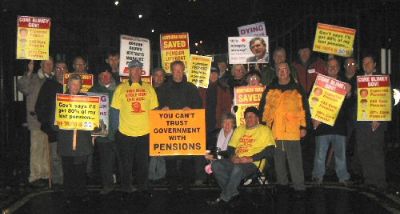
The weather in November is not really suitable for our traditional “Stripped of our Pensions” protest, so it was decided to organise an overnight vigil timed to draw media attention to the imminent publication of the Young Review. Over sixty people took part in shifts allowing us to run from 4pm on the Tuesday afternoon to 10am on the Wednesday morning. Despite the absolutely foul weather people came from all over the UK to join in, notably John Benson from Cardiff who actually managed two demonstrations (in Cardiff and London) in one day, Mike Marsden from St Helens, and Keith and Pat Sargent from Gainsborough.
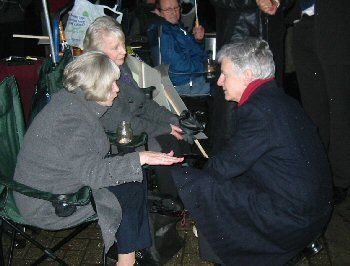 The vigil was held in Whitehall directly opposite the entrance to Downing Street. We were pleasantly surprised when Pensions Minister Mike O’Brien visited us early on the Tuesday evening. He spoke with everyone present and spent some time with widows Jean Wade (front) and Marlene Cheshire. He said he sympathised with our position, but could not say anything further until the review had been published. The vigil was held in Whitehall directly opposite the entrance to Downing Street. We were pleasantly surprised when Pensions Minister Mike O’Brien visited us early on the Tuesday evening. He spoke with everyone present and spent some time with widows Jean Wade (front) and Marlene Cheshire. He said he sympathised with our position, but could not say anything further until the review had been published.
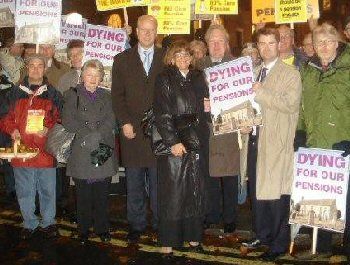 The Shadow Secretary of State Chris Grayling also appeared (and left a very welcome bottle of malt whisky to help fight the cold). The photo shows on the front row from the left, Dave Allen, Marlene Cheshire, Chris Grayling MP, Dr Ros Altmann, Mike Penning MP, David Gauke MP and Alan Marnes. During the vigil many other MPs arrived to give support including Jenny Willott, Bill Cash, Julie Kirkbride, Nigel Waterston, Paul Rowan, Derek Wyatt, Alan Simpson, Danny Alexander and Liberal Democrat peer and campaigner Lord Oakshott. Apologies for any omissions, it was hard to track who came to see us in the heavy rain! The Shadow Secretary of State Chris Grayling also appeared (and left a very welcome bottle of malt whisky to help fight the cold). The photo shows on the front row from the left, Dave Allen, Marlene Cheshire, Chris Grayling MP, Dr Ros Altmann, Mike Penning MP, David Gauke MP and Alan Marnes. During the vigil many other MPs arrived to give support including Jenny Willott, Bill Cash, Julie Kirkbride, Nigel Waterston, Paul Rowan, Derek Wyatt, Alan Simpson, Danny Alexander and Liberal Democrat peer and campaigner Lord Oakshott. Apologies for any omissions, it was hard to track who came to see us in the heavy rain!
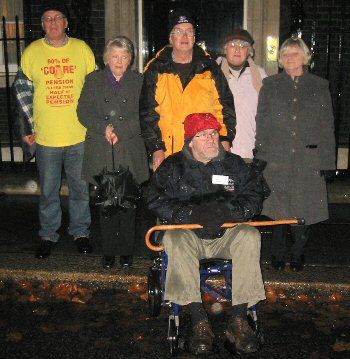 During the vigil a letter was delivered to Number 10 Downing Street. The letter assured Gordon Brown that the protests will not end until the pensions are restored, and said his actions were causing great harm to peoples' trust in pensions. Numbers accessing Number 10 are limited and the letter was delivered by (Back Row from left) Pete Humphrey (Dexion), Marlene Cheshire (Dexion), Andrew Parr (ASW Sheerness), Carol Herring (Bradstock), Jean Wade (ASW Sheerness widow) and at front (in the wheelchair) Phil Healy (ASW Sheerness). Phil is currently awaiting a replacement hip operation. Disappointingly a standard reply was received just two days later which thanked us for the letter and said the government had noted the contents. On the way out Jean & Marlene suddenly wondered if Gordon Brown was in, and returned to Number 10, knocked on the door and asked to see him. The rather surprised official who answered assured us he wasn’t. During the vigil a letter was delivered to Number 10 Downing Street. The letter assured Gordon Brown that the protests will not end until the pensions are restored, and said his actions were causing great harm to peoples' trust in pensions. Numbers accessing Number 10 are limited and the letter was delivered by (Back Row from left) Pete Humphrey (Dexion), Marlene Cheshire (Dexion), Andrew Parr (ASW Sheerness), Carol Herring (Bradstock), Jean Wade (ASW Sheerness widow) and at front (in the wheelchair) Phil Healy (ASW Sheerness). Phil is currently awaiting a replacement hip operation. Disappointingly a standard reply was received just two days later which thanked us for the letter and said the government had noted the contents. On the way out Jean & Marlene suddenly wondered if Gordon Brown was in, and returned to Number 10, knocked on the door and asked to see him. The rather surprised official who answered assured us he wasn’t.
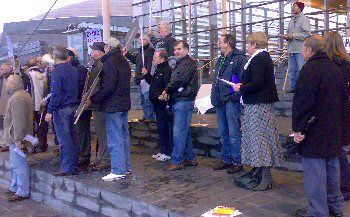 A simultaneous protest was held outside the Welsh Assembly building in Cardiff. Amazingly John Benson, the organizer, was present for the Cardiff start then came up to London by bus for the overnight shift. Assembly Members from the Conservatives, Lib Dems, and Plaid Cymru came out to speak to the protesters, but as usual Rhodri Morgan and the Labour members never appeared. A simultaneous protest was held outside the Welsh Assembly building in Cardiff. Amazingly John Benson, the organizer, was present for the Cardiff start then came up to London by bus for the overnight shift. Assembly Members from the Conservatives, Lib Dems, and Plaid Cymru came out to speak to the protesters, but as usual Rhodri Morgan and the Labour members never appeared.
There was excellent press, radio and TV coverage of both events. Special mention should be made of Jeff Prestridge from the Mail on Sunday who came and spent the overnight shift with us. Jeff has publicised our campaign for over five years and we would like to acknowledge his continuing support
Overall, then two very successful, if rather damp, protests. Thanks to everyone who came, particularly Dr Altmann who rearranged meetings to join us, the Metropolitan Police for their usual good humour, Alan Marnes for doing all the police paper work, Andrew Parr for the liaison with Number 10, Richard Nicholl for arranging a nearby hotel to allow comfort and rest breaks during the night and Adrian de Segundo for the gas fire (even if it did go out at 2:30 am!)
* * * * * * * * * * * * * * * *
Labour Party Conference 25th September 2007
The by now traditional annual protest took place at the Labour Party Conference in Bournemouth on Tuesday 25th September
The day started with an unusual event; a Conservative fringe meeting at a Labour party conference. This was well attended by the media. Chris Grayling, shadow Secretary of State for Work and Pensions, organised the meeting to give the Conservative view on the subject. He started by outlining the history of the lost pensions and then said that the Tories, if elected, would re-establish the lifeboat scheme recently rejected in the Commons
Andrew Parr (ASW Sheerness) then described how the loss of his pension had affected him and his family. Despite having a serious heart condition he would have to keep on working for three years past his retirement date
Dr Ros Altmann then spoke referring to the injustice that had been caused and the methods the government could, indeed should, take to restore the pensions. She said this is the worst pension scandal the UK has ever seen and we heard on Monday from the new Prime Minister about British values. These values have been violated by his handling of this scandal and his abandonment of those whose lives are in ruins because they did what the Government encouraged them to do. She also compared the many years that have passed with the days that the government took to respond to Northern Rock
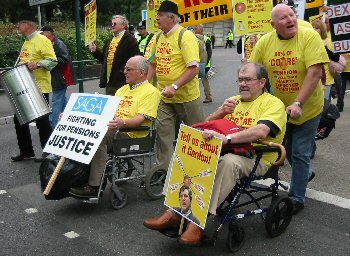 After the meeting, the 250 or so protestors formed up in Exeter Crescent and, led by eight (!) police horses and Pete Humphrey (Dexion) and Phil Healy (ASW) in wheelchairs, marched to the conference centre. Chris Grayling and the local Bournemouth East MP Tobias Ellwood accompanied us on the march. After the meeting, the 250 or so protestors formed up in Exeter Crescent and, led by eight (!) police horses and Pete Humphrey (Dexion) and Phil Healy (ASW) in wheelchairs, marched to the conference centre. Chris Grayling and the local Bournemouth East MP Tobias Ellwood accompanied us on the march.
The protest at the centre lasted about twenty minutes when we moved on to the beach for the traditional strip. As usual this caused much media interest, particularly as Val Day and Jacquie Humphrey joined in!
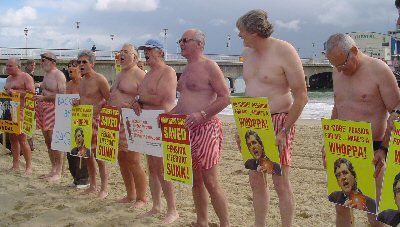
 To everyone’s surprise, Neil Kinnock came down from the conference to talk with us. The reasons for this are very unclear, but he was surrounded by a crowd who accused him of letting us down by voting against the lifeboat scheme in the Lords. This meeting was reported widely in the media, with many reporters comparing Neil Kinnock’s pension, said to be over £75k from his time as an MP and from his post as transport commissioner in the EU, with the pensions of the protestors. The photo shows Kinnock being harangued by Jacquie Humphrey To everyone’s surprise, Neil Kinnock came down from the conference to talk with us. The reasons for this are very unclear, but he was surrounded by a crowd who accused him of letting us down by voting against the lifeboat scheme in the Lords. This meeting was reported widely in the media, with many reporters comparing Neil Kinnock’s pension, said to be over £75k from his time as an MP and from his post as transport commissioner in the EU, with the pensions of the protestors. The photo shows Kinnock being harangued by Jacquie Humphrey
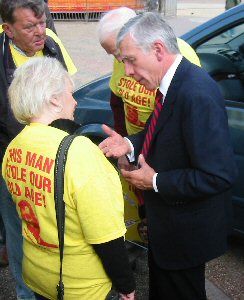 As we were dispersing from the beach, Jack Straw MP was walking down the road to his car. With Allan Pollock in the lead, the group surrounded Jack Straw, asking him for help and also asking him to arrange a meeting with Gordon Brown. For the record, he said he could not do this. Allan quietly leaned on the car door, and Jack straw had the look of a rabbit caught in the headlights of a car. Surprisingly his minders simply stood by and did not intervene. The photo shows Marlene Cheshire laying down the law. Eventually Jack Straw, and his minders, simply walked back into the conference centre As we were dispersing from the beach, Jack Straw MP was walking down the road to his car. With Allan Pollock in the lead, the group surrounded Jack Straw, asking him for help and also asking him to arrange a meeting with Gordon Brown. For the record, he said he could not do this. Allan quietly leaned on the car door, and Jack straw had the look of a rabbit caught in the headlights of a car. Surprisingly his minders simply stood by and did not intervene. The photo shows Marlene Cheshire laying down the law. Eventually Jack Straw, and his minders, simply walked back into the conference centre
According to press reports Gordon Brown had planned a walkabout photo-shoot, but cancelled it when he saw us outside.
In the evening, the Fabian Society was holding a meeting which pensions minister Mike O’Brien was attending. A small group stayed on in Bournemouth to lobby outside the meeting. Surprisingly they were invited in for a short talk with him after the main meeting had finished. The meeting went well and he was left in no doubt of how we all feel.
All told a very good day. We got excellent media coverage and were yet again lucky with the weather; in fact it was so warm that Allan Pollock and Adrian Segundo went for a swim after the strip!
Thanks to everyone who turned up and took part, and to the Dorset police for their usual good humour and common sense. Particular thanks to Alan Marnes for doing all the paperwork and liaising with the police and local authority.
* * * * * * * * * * * *
Northern Rock
The failure of the Northern Rock and the subsequent run on the bank, the first for over 100 years was a salutary lesson and an example of Government hypocrisy. The sight of many queues of worried people outside the branches lead to the government “guaranteeing” (that word again) deposits and pledging within days what could be £21bn of tax-payers’ money to solve the problem.
Many people think that with the public having seen how we have been treated they do not trust the government’s promises. Five DAYS and a bucket load of tax-payers’ money is found to sort out Northern Rock. Over five YEARS and we are still waiting for restoration of our lost pensions.
* * * * * * * * * * * *
Judicial Review Appeal
The government’s appeal against the Judicial Review verdict was heard in the Court of Appeal on 25th to 27th July 2007. The verdict will be given in the Autumn. It seems highly likely that the case will proceed to the House of Lords whatever the verdict as the case clarifies the role of the Parliamentary Ombudsman and as such is wider than just our pensions saga. A Press release from Dr Ros Altmann can be found on our Documents page.
* * * * * * * * * * * * * * * * *
Pensions Bill Receives Royal Assent
The Pensions Bill received Royal Assent on Thursday 26th July 2007. Although the Lords’ amendments for a lifeboat fund were rejected (using the 1911 Parliament Act) this does bring several improvements to the FAS which should be noted:
1. The Government has passed its own amendment to the Pensions Bill which puts the annuity purchases of FAS schemes on hold for nine months and trustees are only allowed to buy annuities if they first get permission from the FAS. That is great news, because at last the Government has listened to the points I have made since 2003 about the waste of annuitising as at present and, once the Young review identifies the savings that can be made by not annuitising, the money will still be there!
2. The announced extensions to the FAS come into force straight away. This means
a. Anyone currently getting the so-called 60% initial payments will receive higher payouts at the (so-called) 80% of core. You should contact the FAS if you are getting 60% to ask for your increase and also contact your trustees.
b. The higher cap will apply straight away, so if you were capped at £12,000 before your cap will now increase to £26,000.
c. Trustees are being urged to make sure that they tell FAS about all members over age 65, so FAS can start paying as soon as possible. PLEASE contact your trustees and ensure that they are now providing the data to FAS and that they recognise this is really urgent.
d. The £10 a week minimum is removed, so even if you are entitled to less than £10 a week from FAS, you should still get it.
Nowhere near PPF yet, but at least much better than before. Still nothing from scheme pension age and no inflation linking.
If you are in a scheme that is in wind-up, contact your trustees to ensure they know about the need to inform FAS of anyone over age 65 straight away.
* * * * * * * * * * * * * * * *
Pensions Bill Returns to the Commons
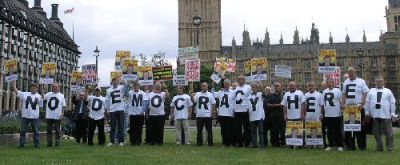
The Pensions Bill, complete with the Lifeboat Fund amendments from the Lords, returned to the House of Commons on Tuesday 17th July 2007. We had very short notice but managed to organize a small group of protesters who demonstrated in Parliament Square. We must thank the Metropolitan Police for rushing through the paperwork for this in record time, the “Serious Organised Crime and Police Act” makes protests with little or no notice very difficult to organize. Thanks also to Graham Nuttal for the photograph.
There was three line whip on the day, and we were hampered by the lack of support from Northern Ireland MPs who were at a meeting in Belfast. There was a very strong debate and on logic alone our case was won, but insufficient Labour MPs rebelled and the vote was lost by 303 votes to 253.
Normally the Bill would now have returned to the Lords for further debate but the Government used an obscure bit of legislation called the 1911 Parliament Act to ignore the Lords and go straight to Royal Assent. This Act is rarely used, the last time was for foxhunting, and like the rejection of the Ombudsman’s report, its use seems to becoming more common. Further comments on this can be found on our media page.
* * * * * * * * * * * * * * * *
Young Review
The interim Young Review was published on 12th July 2007. The final report will be published at the end of the year. Basically it was a mixture of good news and bad news. The good points were the suggestion of putting annuity purchase on hold, and the suggestion that there was sufficient money in unclaimed assets in banks and building societies, commenting on the events in Eire where this had been done. There were no comments on solvent employers, more will follow in the final report.
More detailed comments from Dr Ros Altmann can be found on our Document page.
* * * * * * * * * * * * * * * * * * * * * * * * * *
Commons Vote Tuesday 17th July 2007
The Pensions Bill, with Lords’ amendments, returns to the House on Tuesday 17th July. It is critical that everyone seizes the moment to lobby MPs as hard as possible, and a small static demo is planned in Parliament Square at noon. The short notice has made it this difficult to organise, both for travel arrangements and police approval.
This represents the best chance of achieving improvements on FAS as it currently stands and one of the critical things to get over is that the government must do better. The FAS, even as amended, is not addressing the injustice the Ombudsman identified. That is being challenged in the second judicial review (see below).
It is instructive to compare the FAS & PPF. In essence, the FAS 'core' pension takes the members' expected pension and then:
* deducts all the inflation linking
* deducts the whole tax free lump sum (which many people planned to use to pay endowment mortgage shortfalls). It also means the FAS and PPF are subject to different tax rules.
* deducts some of the revaluation
* deducts the early retirement allowance
* deducts most of the ill-health cover
* deducts much of the widow's benefit
* deducts all the dependent children's benefit
* ignores the scheme pension age (even for women who have to wait from 60 until the age of 65)
and then takes 80% of that figure as the basis payment.
By contrast the PPF (on which the lifeboat proposals are based) takes 90% of the members' expected pension that:
* includes some inflation linking
* includes the tax free lump sum
* includes an early retirement and ill-health allowance
* includes more widow's benefit
* includes dependent children's benefit
* fully recognizes scheme pension age.
What is more, the proposed FAS extensions do not benefit a great many of those who had their complaints upheld by the Ombudsman and who won the first judicial review.
Very unusually the Public Administration Select Committee (PASC) (which last year produced a damning report) published another report on Friday 13th July calling for MPs to support the Lords’ amendments. The committee (chaired by Labour MP Dr Tony Wright) has several Labour MP members including Cardiff MP Julie Morgan
* * * * * * * * * * * *
Judicial Review in the Court of Appeal
This is listed for three days beginning on 25 July 2007. It will take place at the Royal Courts of Justice on the Strand and the hearings each day will run from 10.30 am until about 4.30 pm with an hour for lunch. The Court will hear from the DWP (probably first – though we are contesting that), our barrister Dinah Rose QC, the Ombudsman’s barrister, James Maurichi, and (hopefully only briefly) a barrister representing the Attorney General.
We do not know the court number – we will only find out the day before. As many of you that can attend on all three days will be welcome. It is very important that the Court is confronted with the scheme members its decision will affect.
* * * * * * * * * * *
Second Judicial Review
This challenges the scope of the extensions to FAS by arguing that the reconsideration of the Ombudsman’s first finding and first recommendation has not been undertaken lawfully. The case has been listed to be heard on 24th and 25th October 2007, again in the High Court. But the DWP is threatening the four claimants with over £70,000 of legal costs it expects to spend in its defence. We will be applying to the court for an order to protect the four by limiting those costs or directing that they cannot be recovered in a public interest case like this one.
* * * * * * * * * * * *
Success in the House of Lords
The important amendment which was defeated in the Commons by just 22 votes was re-introduced in the Lords and debated on Weds 6th June 2007. It won by a striking majority:
For 181
Against 126
Majority 55
The Lords are traditionally less affected by party politics and this showed.

We did our trademark striptease outside parliament and there was excellent TV, radio & press coverage. John Bull (Ray Egan) came all the way from Birmingham to assist us despite not having lost his pension and he even joined in the striptease (complete with union jack underpants).Several press photographers wanted us to do the stripped act outside Downing Street and surprisingly the police gave permission so many ran with the story of our Downing Street protest.
What happens now is the bill, with the amendment, will go back to the House (probably in July) and be re-considered by MPs. They can reject it again and it will go back to the Lords again and a game of ping-pong can develop. Ultimately the government can use something called the Parliament Act to discount the Lords' ruling, so it's not over by a long way.
If included in the bill he amendment would:
a) Bring payments up to 90% of pensions entitlement (unfortunately the European Court of Justice verdict blew the chances of 100% out of the water).
b) Pay pensions from the scheme age (60 for women, 62 for men at Sheerness) rather than from the FAS age of 65
c) Dispense with the slow and laborious FAS payment scheme and allow trustees to start paying pensions locally
d) Remove the requirement to buy annuities
e) Include employees of solvent companies (not relevant here but very important for those affected)
f) Improve payment to surviving partners
g) Give some (but not total) protection against inflation
h) Achieve all this in the short term with a Treasury loan which will be re-paid from unclaimed assets
The annoying thing is all this was proposed four years ago in a Private Members bill from Frank Field MP which was never called
The Lords' amendment does not affect any possible union legal action, the two High Court Judicial Reviews or the Andrew Young review of the FAS. These are all still ongoing
The next part of our campaign will be to persuade MPs not to reject the amendment for a second time.
The score is now five-nil:
The Parliamentary Ombudsman has found in our favour
The Select Committee found in our favour
The European Court found in our favour
The Judicial Review found in our favour
and now
The House of Lords has found in our favour
Add this to all the media pressure, how long can the government still say it is nothing to do with them?
* * * * * * * * * * *
Cardiff Demonstration 28th April 2007
Nearly 100 people took part in a demonstration in Cardiff on Saturday 28th April
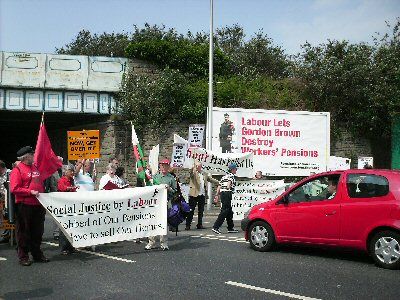
The group assembled in Adam Street by the infamous poster of Gordon Brown and did a sit-down protest in the middle of the road. After a near miss with a car the police arrived and suggested that we had made our point and said they would assist with a march into the centre of town. They escorted the march to Cardiff’s pedestrianised High Street where leaflets were handed out to the shoppers.
Thanks to everyone who turned out (including the Welsh choir!) & Plaid Cymru Assembly Member Jon Owen Thomas. Special mention should be made of John & Sally Hayter who drove down from Kent to join in.
The protest was widely reported in the South Wales media
* * * * * * * * * * * * *
Pensions Bill Amendments April 18th 2007
There were three proposed amendments for the Pensions Bill which is currently passing through Parliament. The first, union supported, from Julie Morgan (Lab MP for Cardiff), one from Dr Tony Wright (Lab, and chairman of the select committee which found in our favour) and a cross party one with proposers David Cameron, Menzies Campbell and Frank Field. All the amendments were aiming for 90% PPF levels, but with variations in how this was achieved.
The best proposal (in terms of what it could deliver and when) was the cross party amendment which proposed that pension funds started paying pensions once a member reached scheme age (as the PPF does), with a lifeboat fund set up initially with a Treasury Loan which would be repaid with money from unclaimed assets. This lifeboat fund would then top up the scheme funds as and when required. The cross party amendment also gave limited indexing which the others didn't. The mechanism was very similar to the Mirror Group rescue fund which was up and running in six months, compared with the five years we have been fighting.
There were long discussions in the morning between the unions, Julie Morgan and the government which resulted in Julie Morgan withdrawing her amendment on promise of a review of the working and funding of the FAS. Tony Wright’s amendment was mainly aimed at getting solvent company employees included and was withdrawn when the government said they would examine this
The cross party amendment went to a vote and was lost by 22 votes. If 12 MPs had changed sides we would have won.
Several Labour MPs we thought would support us didn't. For example, Derek Wyatt, Kevin Brennan, Sandra Osborne, and Anne Begg all abstained or voted against the amendment. Anne Cryer deserves a wooden spoon, she signed all four EDMs but still voted against the amendment.
We should acknowledge the fifteen Labour MPs who voted for the amendment:
Frank Cook, Jeremy Corbyn, David Drew, Frank Field, Mark Fisher, Kate Hoey, Kelvin Hopkins, John McDonnell, Michael Meacher, Bridget Prentice, Alan Simpson, Gisela Sturat, Robert Wareing, Mike Wood and Tony Wright
The Pensions Bill now goes to the House of Lords where we will have a further chance of making changes. It will return for the final reading in the House in late June.
Two small good points came out of the debate. Some solvent employees where a compromise agreement was reached are now included in the FAS, however others are still excluded, and the FAS payments will start at 80% regardless of whether the scheme has completed wind-up.
Part of the reason that Julie Morgan withdrew her amendment was the announcement that a review of funding for the FAS. This will be chaired by Andrew Young, Directing Actuary at the government’s Actuary’s Department. An interim report will be given in the Summer of 2007 and a final report at the end of 2007. It will, however, be late 2008 / early 2009 before any proposals take effect. Topics that will be examined include additional funding (i.e. unclaimed assets and levies) and whether it is sensible to force the purchase of annuities. Comments can be sent by e-mail to:
Pensions Bill Amendments
A new Pension Bill is going through Parliament in this session. There have been several amendments proposed which, if accepted, will improve on the current level of payments from the FAS to something like the PPF. Changes would include 90% level of payment (as opposed to the 80% level of the FAS), scheme age being used instead of 65, ability to take a tax free lump sum etc. The best amendments are those tabled by Dr Tony Morgan (the chairman of the Select Committee which produced such a damning report) and Cardiff MP Julie Morgan. These also have LibDem support. Unfortunately a Tory amendment, whilst offering improvements, is less good, only offering money (from unclaimed assets) at some time in the future when the Tories are in power and when (they say) they can view the full finances of the state.
The amendments will be debated on Wednesday 18th April. Please contact your MP by phone (02072-193000) or better still come to the House of Commons on the morning of 18th April, to lobby (speak personally to) your MP and ask them to vote for the amendments tabled by Dr Tony Wright and Julie Morgan. The debate can be seen on the Parliament Channel on Sky or Freeview
* * * * * * * * * * * *
Pensions Action Group Posters
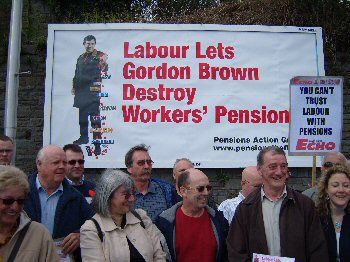 The forthcoming local elections in England and the Assembly elections in Wales and Scotland are expected to show a large swing against Labour. The Pensions Action Group have paid for posters to be put up in Cardiff (City centre) and Edinburgh (city centre and Waverley station) linking Gordon Brown to our plight. The timing of the posters could not have been better with the news about Gordon Brown’s action over the removal of ACT broke just a week before the posters were erected. The posters themselves, planned & designed over a month ago, were fortuitously spot on. The forthcoming local elections in England and the Assembly elections in Wales and Scotland are expected to show a large swing against Labour. The Pensions Action Group have paid for posters to be put up in Cardiff (City centre) and Edinburgh (city centre and Waverley station) linking Gordon Brown to our plight. The timing of the posters could not have been better with the news about Gordon Brown’s action over the removal of ACT broke just a week before the posters were erected. The posters themselves, planned & designed over a month ago, were fortuitously spot on.
Thanks to John & Sally Hayter for the original idea, John Benson for co-ordinating the Cardiff posters and Marcus Stout for the Edinburgh posters. Thanks also to Richard Nicholl for negotiating with the poster board owners.
The unveiling of the posters was a media event and was widely reported on TV and in the national press. Tony Blair visited Cardiff a few days after the posters were unveiled and was so angered by what he saw that he contacted the local press and gave a statement about the government’s position. The paper rang John Benson who said that if Tony Blair was so concerned the Pensions Action Group would be delighted to meet with him and Gordon Brown for discussions. We wait to see if this offer is taken up, but we won’t hold our breath.
* * * * * * * * * * * *
Gordon Brown and ACT Revelations
One of Gordon Brown’s first acts when Labour came to power was the removal of something called Advance Corporation Tax relief. This highly technical procedure meant that dividends which pension funds used to receive tax free would now be liable for tax. This was a real stealth tax as who, apart from experts, would think that removal of ACT could do anything to their pensions? Wrong. It initially took £5bn out in the first year (think, it would take about £3bn to restore our lost pensions) and has grown now to something like £8bn per year. Pension funds have lost something like £100bn in the ten years of Gordon Brown’s management of the economy. Very serious money. The removal also meant that pension investments were taxed twice, once each year on the growth, and once more when the investor retired. In addition ACT removal meant that it was advantageous for pension funds to move out of shares and in to bonds. This movement of funds was a factor in the fall of the FTSE in the late 1990s.
There have long been rumours that this was done against expert advice, and for over two years the Times has been trying to get access to the relevant papers under the Freedom of Information Act. The Treasury strongly resisted, saying it was not in the public interest. Surprisingly, they suddenly released them on a classic “good day to release bad news” with Gordon Brown out of the country and all MPs just having left London for the Easter break. The released papers show that all the experts, civil servants, Bank of England, actuaries, NAPF, were appalled by the suggestion and pointed out the potentially dire side effects.
This advice was ignored, ACT relief was removed and from there it was all downhill. Final salary occupational pensions have literally been decimated. Returns on private pensions are at a historic low. In 1997 our pension system was, in the government’s own words, “the envy of Europe”. In ten years Gordon Brown has destroyed it.
A press release by Dr Ros Altmann can be found on our Documents page, and a typical media comment can be found on our Media Comments page.
* * * * * * * * * * * *
Stripped of our Pensions March 21st 2007
Wednesday 21st March was Gordon Brown’s last budget before he almost certainly takes over from Tony Blair as Prime Minister, so as Gordon is perceived as the block on our campaign it was decided to hold our traditional “Stripped of our Pension” on Parliament Square before his budget speech. Alan Marnes did the usual negotiations and paperwork with the Metropolitan Police who, because they had a lot going on that day, imposed an upper limit on numbers.
 Despite truly awful weather conditions on the preceding day (2oC, strong icy Northerly winds and snow showers) nine brave souls (from the left, Graham Dodds, Alan Marnes, John Benson, Andrew Parr, Pete Humphrey, John Hunt, Roger Day, Keith Sargent and Adrian Segundo) turned up and stripped off. Somebody must like us, because just as we did the striptease the sun came out, the wind dropped and the temperature of 4oC seemed almost balmy. Numerous MPs from all political parties came and joined us, holding up placards for a media photo-shoot. Amongst these was Conservative Shadow Spokesman for Work and Pensions Phil Hammond MP and Lib Dem shadow spokesman David Laws MP. Ros came along to offer welcome advice and support. After the photo shoot the strippers circled all round Parliament square to the delight of the tourist. We gather a police escorted limousine that passed contained Princess Anne, but we don’t know what she thought! Despite truly awful weather conditions on the preceding day (2oC, strong icy Northerly winds and snow showers) nine brave souls (from the left, Graham Dodds, Alan Marnes, John Benson, Andrew Parr, Pete Humphrey, John Hunt, Roger Day, Keith Sargent and Adrian Segundo) turned up and stripped off. Somebody must like us, because just as we did the striptease the sun came out, the wind dropped and the temperature of 4oC seemed almost balmy. Numerous MPs from all political parties came and joined us, holding up placards for a media photo-shoot. Amongst these was Conservative Shadow Spokesman for Work and Pensions Phil Hammond MP and Lib Dem shadow spokesman David Laws MP. Ros came along to offer welcome advice and support. After the photo shoot the strippers circled all round Parliament square to the delight of the tourist. We gather a police escorted limousine that passed contained Princess Anne, but we don’t know what she thought!
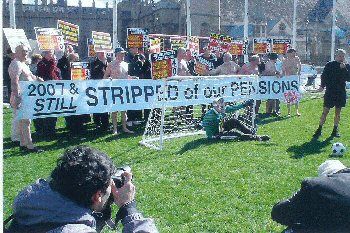 We also did a football penalty shoot stunt on the grass in Parliament Square, based on the four government defeats from the Ombudsman, the Select Committee, the European Court and the High Court. A score of four nil as the placards said We also did a football penalty shoot stunt on the grass in Parliament Square, based on the four government defeats from the Ombudsman, the Select Committee, the European Court and the High Court. A score of four nil as the placards said
 With Bob Forty dressed as a Gordon Brown goalie, Roger Allen dressed as a referee (complete with whistle) and Peter Wheeler dressed as a very imposing judge a mock penalty shoot-out took place where Pete scored four conclusive goals to chants from the strippers of “FOUR – NIL” With Bob Forty dressed as a Gordon Brown goalie, Roger Allen dressed as a referee (complete with whistle) and Peter Wheeler dressed as a very imposing judge a mock penalty shoot-out took place where Pete scored four conclusive goals to chants from the strippers of “FOUR – NIL”
The imminent budget speech mean there was a media scrum present so we had good coverage on TV and radio and in the following day’s newspapers.
Thanks to everyone who turned up, Alan Marnes for the paperwork and the Metropolitan Police for their usual good humoured control of the proceedings.
* * * * * * * * * *
Budget Announcement 21st March 2007
Gordon Brown’s surprise announcement in the budget caught everybody by surprise, not least of all ourselves. Everyone had retired to The Sanctuary in Tothill Street after the demonstration for warmth food and drink, and we were watching the budget speech on News 24 in the pub when we suddenly saw that Gordon had made an announcement about us. Then the mobiles started to ring and it was media mayhem for the rest of the day!
As usual you have to treat the figures with some cynicism and not be awed by the sums involved. It is peanuts in government terms. For example the quoted £8bn is given in cash terms over sixty years, in reality it is £33m a year (in today's money) for sixty years. This is money down the back of the sofa in terms of government spending. For example the DWP paid out over £700m in error last year which cannot be re-claimed and has been written off!
Three important changes to the FAS were announced:
1) When a scheme closed, everyone should have received a pension statement of their entitlement from their scheme administrators. Until yesterday the FAS topped up on a sliding scale to 80% of the core pension for those who were near scheme retirement age, down to 50% for those who were fifteen years for retirement when the FAS started. From yesterday the 80% band applies to everyone, i.e. the pension you will receive from age 65 will be 80% of the core pension. Core pension is a rather imprecise term and is roughly the entitlement you had when the scheme closed, excluding cash lump sums, indexing, retirement through ill health, early retirement and other similar extras. Payment is also made from age 65, even if your scheme had an earlier age of 60 or 62
The 80% figure is, as far as we can see, protected against inflation until you are 65, then freezes once you retire. Inflation will then decrease the value of the pension at about 3% per year. This lops off about a third over eight years and halves the value over twenty years
2) The old FAS had a cap of £12k. This meant that anyone with a higher entitlement than £15k would hit the cap and not get 80% (0.8 * 15 =12). People with long service and/or high salaries were thus losing out. The cap has been raised to £26,000 which means people will get 80% of their pensions up to £32k5 (26 / 0.8 =32.5). There is, though, one caveat which is unclear. The old FAS cap was not protected against inflation so those, say, 20 years away from retirement could hit the cap even though their original pension entitlement was much less than £12k. The PPF cap (which is also £26k) IS protected against inflation and increases every year. It is not clear whether the new FAS cap is now protected. If not, a sub £26k pension could hit the cap by time you reach retirement.
3) The minimum cut off of £520pa has been removed, so everyone gets 80%. This will benefit people with short service, but how a pension of, say, £100pa will be handled is unclear. At this level the pension will cost more to administrate than it is worth so there may be a lump sum buyout of small pensions.
Whilst welcome, the improvements do not restore the lost pensions in full, and the lack of indexing after retirement means pensions will decrease annually (3% halves an income over 20 years, compare this with what happens to council tax and energy costs which are the main expenditures for a retired person). There is also the delay in payment from scheme age (commonly 60 or 62) to 65.
Other things like commutation for a lump sum, early retirement through ill health and partner's benefits on death before retirement are all missing
Employees of solvent companies which, quite legally, closed their schemes are excluded. Some people have lost all their pension and do not get a penny from the FAS or the PPF.
The Pensions Action Group are therefore continuing their campaign, and the appeals in the High Court will probably be heard at the end of June 2007.
We also gather that Community & Amicus are not happy with the budget statement and are lobbying MPs to come up with something better. Their court action is still on the cards
There is currently a Pensions Bill going through the House, and Julie Morgan (Labour MP for Cardiff) and others have tabled amendments calling for an increase in the FAS to at least PPF levels with indexing. This will be debated before October 2007
A press release from Dr Ros Altmann can be found on our documents page
* * * * * * * * * * * * * *
Judicial Review Appeal
The government have appealed against the Judicial Review verdict that the Ombudsman’s findings cannot be rejected. Our legal team has appealed against the findings on causation, the way that changes to the MFR were made and the Human Rights issues. The government refused to support an application for the case to be fast tracked to the House of Lords so the appeal will be heard in the High Court, probably in late June or early July. We gather that the verdict has increased the power of the Ombudsman which has caused concern in all government departments, not just the DWP
Secretary of State John Hutton stated in the House that the Government will meet our costs for the appeal and will not claim costs if they win. The statement was not clear, however, as to whether this will extend to our appeal or just the single point of the government’s appeal. Clarity on this point has been requested
* * * * * * * * * * *
Judicial Review Verdict Wednesday 21st February 2007
 We had expected to hear the verdict within four to six weeks of the hearing, but unexpectedly the judge, Mr Justice Bean, delivered his judgement much earlier. We had expected to hear the verdict within four to six weeks of the hearing, but unexpectedly the judge, Mr Justice Bean, delivered his judgement much earlier.
There are four parts to the judge's ruling. As the photo of Jacquie Humphrey clearly shows we were very pleased with the outcome:
1) The judge upheld that the information produced by the government was misleading and the government was guilty of maladministration. He went on to say that a government could not reject an Ombudsman's finding of maladministration (i.e. the government cannot be judge and jury on itself), save in very narrow, exceptional circumstances. If the government disagrees with the Ombudsman, the case has to be resolved in court. Outside the issue of our pensions this is a very important constitutional judgement which affects the way the government must operate. As a result of the judgement, the proper role of the Ombudsman as an independent arbiter of whether or not there is maladministration has been protected and strengthened.
He also took apart the government’s defence of the various booklets. The defence barrister had said:
[..] the MFR is described as being “aimed” at making sure schemes have enough money. It “is intended” to ensure schemes are protected. Adherence to the MFR entails that there “should” (not “will”) be enough assets. Nowhere does the leaflet state or imply that adherence to the MFR provides a guarantee that all liabilities will be met
To which the judge replied:
[..] Such minute textual analysis of a pamphlet aimed at the general public can in my view only give comfort to those who consider that it is unwise to believe anything one reads in a government publication. It is particularly ironic when applied to a leaflet whose back cover boasts that it has been awarded a Crystal Mark for clarity by the Plain English Campaign. PEC 3, especially page 15, gives the clear impression that following the enactment of the new law scheme members can be reassured that their pensions are safe whatever happens. I have no doubt that this is what it was designed to do. I agree with the Ombudsman that it was inaccurate and misleading
For these reasons the judge quashed the government’s rejection of the Ombudsman’s first maladministration finding.
The second part of the win was the judge’s rejection of the government’s argument that it would have done nothing, even if maladministration had been admitted. He said he could not accept the response politically would necessarily be the same. The judge therefore went on to quash the rejection of the Ombudsman’s first recommendation. The government therefore now has to re-consider the Ombudsman's report, but it will be doing so under an intense media and political spotlight. We will be pressurising them along the lines of:
• The Ombudsman found in our favour
• The Select Committee found in our favour
• The European Court found pensions in the UK were not adequately protected
• The High Court have found in our favour.
It's normally three strikes and you are out, the government have had four, when will they see sense?
2) The judge gave a mixed view on causation, (showing that the misleading information actually caused loss). The Ombudsman had ruled that the government should take a broad brush approach (as it had in relation to very similar maladministration in inherited SERPS) and consider compensating all those who had lost their pensions. The judge said this went too far. His words were:
If the First Finding had been limited to the causation of injustice to any scheme member who had read the offending leaflets, or who relied on advice from colleagues or others who in turn relied on the leaflets, it would not be open to challenge. But I cannot follow the logic of the Ombudsman’s finding that everyone who between 1995 and 2005 suffered losses on the winding up of their pension scheme was the victim of injustice in consequence of maladministration
This is actually helpful – up to a point - as its says that where it could be demonstrated that an individual had done research and influenced other people it can be assumed that the other people have suffered loss.
We will need to see how the government responds to this. If the judge’s approach is correct (we have permission to appeal against this part of the ruling, so his word may not be final), it still does not let the DWP off the hook as a strict approach to causation could lead to up to 125,000 individual complaints, or even that many judicial reviews.
3) The judge did not agree that the changes to the MFR were maladministration. This is debatable and we may appeal. Again, we have permission to appeal against this part of the ruling.
4) The judge dismissed the human rights case outright. Again, we can appeal this if we wish. The human rights point is particularly important for those wholly excluded from the FAS, as the government cannot say it has made proportionate arrangements to compensate everyone when they are excluded.
Notes from Dr Ros Altmann
The government should be pressed in parliament to answer the question whether they now accept that the information that they provided to the public was misleading, and that they were responsible for maladministration. Or are they still maintaining the position which the judge has said that the judge said no reasonable secretary of state could rationally adopt?!
WHAT WE ESTABLISHED IN YESTERDAY’S RULING
Government is guilty of maladministration by providing inaccurate information about the security of final salary pensions
Its information for the public misled people into believing their pensions were safe, when they weren’t
The Government’s decision to reject the Parliamentary Ombudsman’s finding of maladministration was unlawful
The Secretary of State’s reasons for rejecting the finding of maladministration were not reasonable or rational, so this decision was unlawful
The Government must reconsider its rejection of the Parliamentary Ombudsman’s recommendation to compensate people and restore their full pensions
The Government agreed to pay all the costs of the case and also the costs of any future appeals
WHAT WE DID NOT WIN ON - The Government’s figleaf!
The judge said that, in law, he could not accept that compensation must be paid to ALL victims of failed pension schemes, because they have not 'so far’ ALL established that they relied on the official information
The judge said he was not convinced that the decision to weaken the MFR in 2002 was taken with maladministration. The judge did not agree that the Government has violated the Human Rights Act
My comments on these points are as follows (also checked with the barrister):
On causation, the court has made the point that it is hard to see how it could be said that everyone who lost pension rights between 1997 and 2004 has suffered injustice in consequence of maladministration. For some people, official misinformation may have had nothing to do with it, and they may not have had remedial steps open to them (paragraph 70).
However, at paragraph 85 he goes on to say that the first recommendation must be reconsidered on the basis that “maladministration occurred, but that causation in individual cases has not so far been established”. Of course, many indiciduals will have no difficulties in establishing causation. They can do this by explaining how they read leaflets themselves, in hard copy or on line, or that they were told that their money was safe by others who had read leaflets - such as trustees who had read the OPRA leaflets - or that they understood from press reports (also influenced by misleading press releases and the 1996 leaflet) that their money was safe. They would then need to just explain how they at least lost chances of remedial action as a result (for example they could have diversified their savings, tried to negotiate higher contributions from their employer, retired at the first opportunity, not put AVCs into their scheme etc etc). In theory, all 125,000 or so could lodge individual claims for compensation with the DWP on this basis. This will be impossible for DWP to process. Therefore, there is a strong incentive for DWP to reach a global deal - as they did in the inherited SERPS case, where the causation issues were closely comparable. The key point we need to stress on causation is that the judge has said that the recommendation for full compensation must be reconsidered on the basis that causation has not yet been established in each individual case - in other words, he is not saying that it could not be.
The rejection of the Ombudsman’s finding about the 2002 MFR decision is not the Central issue. The Ombudsman made it clear that her recommendations for redress did not turn on the third finding in any event. In any case, I am quite sure that we would win on Appeal on this issue too, it is just that we did not spend time explaining the detail of how the MFR calculations worked, since it was not crucial to our case. Unfortunately, as the judge says in his ruling (point 76) he found the Ombudsman unclear on this matter. The explanation we would give is that the decision to weaken the MFR in 2002 was taken on the basis of only looking at the investment markets and the effect of those on the MFR calculation assumptions for ONGOING schemes, but failed to check what would happen on wind-up to members’ for a 100% MFR-funded scheme. Given that the original intention of the MFR was to protect members’ pensions ON WIND-UP (this was admitted by John Hutton in his response to the Ombudsman report) the fact that the Government did not bother to check what was happening to annuity rates, nor consider the impact of the priority order and cost of annuities on pensions of non-pensioner members on wind-up, is clearly maladministrative. We did not have the opportunity to go into the detail of this in court, but may do if there is an appeal. Importantly, however, the Ombudsman’s recommendations were not based on this finding.
* * * * * * * * * * * * * * *
Government response
John Hutton made a statement on the judgement in the House on Thursday 22nd February. Essentially he said they need time to consider, and have not decided on what grounds, if any, they might appeal. He did, though, make the welcome announcement that they would not pursue the claimants for costs in this case or in any appeal. The Hansard report and the subsequent short debate can be found here. His statement, and comments by Dr Ros Altmann and John Halford, can be found on our documents page.
* * * * * * * * * * * * * *
Judicial Review, 8th to 10th February 2007
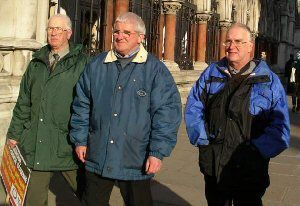 The long awaited Judicial Review took place in Court 1 of the Royal Courts of Justice over the three days 8th to 10th February. Four claimants, Henry Bradley, Robin Duncan, Andrew Parr and Thomas Waugh, claim that the government, in particular the Secretary of State for Work and Pensions, did not correctly consider the contents of the ombudsman’s critical report. The photo shows, from left to right, Tom Waugh, Robin Duncan and Andrew Parr. Henry Bradley, who lives in Northern island, was unable to attend, but this does not affect the hearing which was consisted almost entirely of presentations from the DWP’s and our barristers. A detailed description of the proceedings by Dr Ros Altmann can be found on our documents page. The long awaited Judicial Review took place in Court 1 of the Royal Courts of Justice over the three days 8th to 10th February. Four claimants, Henry Bradley, Robin Duncan, Andrew Parr and Thomas Waugh, claim that the government, in particular the Secretary of State for Work and Pensions, did not correctly consider the contents of the ombudsman’s critical report. The photo shows, from left to right, Tom Waugh, Robin Duncan and Andrew Parr. Henry Bradley, who lives in Northern island, was unable to attend, but this does not affect the hearing which was consisted almost entirely of presentations from the DWP’s and our barristers. A detailed description of the proceedings by Dr Ros Altmann can be found on our documents page.
Costs are a potential problem; although Bindmans (our solicitors) and Blackstone Chambers (our barristers) are working on a no win no fee basis, the four claimants are still liable for the DWP’s costs, estimated to be over £125,000, if we lose. Although everyone thinks the chances of this are remote (think of the publicity) it is still a worry for the claimants
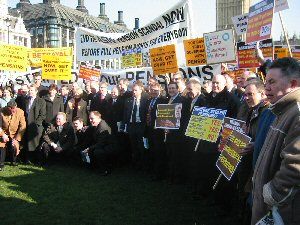 The day started with a demonstration by over three hundred people in Parliament Square. The demonstration was timed to coincide with the end of Prime Minister’s Question time, and we had asked MPs to come out and support us. Over fifty MPs joined us and showed their support. The day started with a demonstration by over three hundred people in Parliament Square. The demonstration was timed to coincide with the end of Prime Minister’s Question time, and we had asked MPs to come out and support us. Over fifty MPs joined us and showed their support.
We were all rather annoyed by a simultaneous event taking place in the House. Big Brother winner Shilpa Shetty was visiting the house, and many MPs decided it was more important to meet with her. We have been trying for five years to meet with Tony Blair without success, but he deigned to meet Shilpa and gave her a signed photograph. We obviously have to get somebody into the Big Brother house if we want to make an impact. The action of these MPs drew a lot of media criticism, typical is the article from Ian Cowie of the Telegraph which can be found on our Media Comments page.
 After the MPs joined us the demonstration moved up Whitehall where John Benson delivered a 5,000 signature petition initiated in Cardiff, and the Saga petition (which achieved 12,235 signatures via their web-site and magazine) were both delivered to number 10. The petition from Alan Simpson MP will be delivered in a few weeks before the end of this parliamentary session After the MPs joined us the demonstration moved up Whitehall where John Benson delivered a 5,000 signature petition initiated in Cardiff, and the Saga petition (which achieved 12,235 signatures via their web-site and magazine) were both delivered to number 10. The petition from Alan Simpson MP will be delivered in a few weeks before the end of this parliamentary session
We had excellent media coverage, possibly the best to date. Jacquie and Peter Humphrey were interviewed on GMTV, Dave Allen was interviewed on BBC Breakfast TV, Andrew Parr Jean Wade and Marlene Cheshire were interviewed for lunchtime ITN news and there was extensive coverage on Radio 4 Today, Sky News and many local radio and TV stations. Apologies to anybody who has been omitted from this list. There was very supportive press coverage, a typical example, from the Telegraph, can be found on our media comments page.
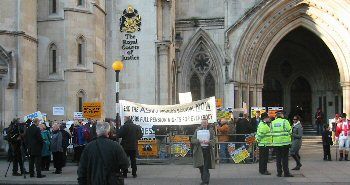 The demonstration then moved to the Royal Courts of Justice for the end of the afternoon session. In the photograph Jean Wade and Marlene Cheshire are being interviewed by ITN at the extreme left and Ray Egan, who always comes along dressed as John Bull, can be seen on the right. The police split us into two groups either side of the door, so apologies to the right hand group who are missing from the photo! The demonstration then moved to the Royal Courts of Justice for the end of the afternoon session. In the photograph Jean Wade and Marlene Cheshire are being interviewed by ITN at the extreme left and Ray Egan, who always comes along dressed as John Bull, can be seen on the right. The police split us into two groups either side of the door, so apologies to the right hand group who are missing from the photo!
The verdict is expected in four to six weeks, but this is not guaranteed. Even if we win, it is possible, even probable, that the government will appeal and we will have to go to the appeal court and possible even the House of Lords. However each of these steps will bring much bad publicity for the government.
Thanks to everyone who turned out. As it was mid week most people had to take time off work and incur high traveling costs. The fact that we got people from all four countries in the UK was wonderful. Particular thanks to Alan Marnes who handled all the paperwork with two police divisions for the demonstrations outside parliament and the Royal Courts of Justice. The Metropolitan Police, who displayed their usual common sense and good humour, must now have a large file on our group!
* * * * * * * * * * * * * * * *
European Court Verdict 25th January 2007
This is a mixture of good and bad news, and both the unions and government are reporting it with different spin. The verdict says, in full legalese:
1. On a proper construction of Article 8 of Council Directive 80/987/EEC of 20 October 1980 on the approximation of the laws of the Member States relating to the protection of employees in the event of the insolvency of their employer, where the employer is insolvent and the assets of the supplementary company or inter-company pension schemes are insufficient, accrued pension rights need not necessarily be funded by the Member States themselves or be funded in full.
2. A system of protection such as that at issue in the main proceedings is incompatible with Article 8 of Directive 80/987.
3. If Article 8 of Directive 80/987 has not been properly transposed into domestic law, the liability of the Member State concerned is contingent on a finding of manifest and grave disregard by that State for the limits set on its discretion.
The full verdict, with the discussion of the various points considered, can be found here.
The full interpretation, no doubt, will be drawn by the lawyers, but it seems that a common sense interpretation is:
Point 1 seems to say that Article 8 does not require full 100% compensation, although it does not say what the compensation should be. This issue would be resolved in the UK Courts
Point 2 is the good bit. It says that protection in the UK, including the FAS, is inadequate. This is the part that the unions are pushing (see press releases). However, the government say that the investigation took place before the recent widening of the scope of the FAS and would argue that (under point 1) that it is now adequate
Point 3 is the really difficult bit. It says, correctly, that the issue must be resolved in the UK courts but, and it is a very very big BUT, the court has to find there has been a “grave and manifest disregard”. This is a legal expression and makes a very difficult setpoint for the lawyers to reach. It is not sufficient that the UK government has breached Article 8 (point 2 makes that clear). The verdict (and the preamble) seems to suggest that the UK court has to decide this was done with something like malice or total incompetence
In the preamble the request for temporal limitation is dismissed.
We must also note that this case does nothing for those people who have lost their pensions with a solvent employer
It will take some time for the dust to settle, but it seems that the unions are currently trying for a political solution before going to the court again. Julie Morgan (Lab Cardiff North) has tabled an amendment to the pending pensions bill which goes before the House in this session. The amendment calls for the FAS to be considerably improved
As (at the time of writing, 28/1/07) almost half of the House has signed one of the three EDMs this amendment must have a significant chance of success.
* * * * * * * * * * * * * * * *
Date for Judicial Review
The date for the Judicial Review, in which the High Court will rule on the Government’s handling of the scathing Ombudsman’s and Select Committee’s reports, is fast approaching. It will be held on 7th and 8th February 2007, although the verdict will not be announced for another four to six weeks. A demonstration will be held in Parliament Square on 7th February (see below)
The preparations for the review have been a real Judge John Deed plot. The government said it did not have time to prepare its defence (this means our legal team would not have much time to study it). The court granted an extension, which was missed by the government, then, pushed by our team, issued a final date by which the papers had to be received. The government said it could not meet this date and asked for the whole case to be delayed for some months, so our team asked the High Court to intervene and the review to be heard undefended. Literally at the very last minute the defence papers mysteriously appeared. The court awarded costs to our team for the work incurred in fighting the delay
In addition, our solicitors are hounding the Government for a firm decision on whether or not they will seek ‘unlimited costs’ from the brave pensioners named in the documents should they lose. The Government are still prevaricating and a formal complaint is being considered.
* * * * * * * * * * * * * * * *
Protest in Parliament Square Wednesday 7th February 2007
We will be holding a protest and photo opportunity in Parliament Square (outside the House) from 1pm on Wednesday 7th February to coincide with the start of the Judicial Review. We are asking MPs to come and join us after Prime Minster’s Question Time. Please contact your MP and demand they come outside and join us. Inform your local media of the event and your MP’s response.
Later in the afternoon we will be moving on to the High Court for a second protest. Both protests have been approved by the police (a major paperwork exercise conducted by Alan Marnes)
Please inform your media contacts of these events, they are probably the most important demonstrations we have held. We need a very good turnout so book a day’s holiday now and come and join us.
* * * * * * * * * * * * * * * *
Dr Ros Altmann Campaigner of the Year Award
The Daily Telegraph, its year-end issue of 27 December 2006, awarded a series of ‘prizes’ to the heroes and villains of 2006 in the financial world. It was enormously gratifying to see our own Ros Altmann at the top of the list, nominated as ‘Campaigner of the Year’ for her tireless efforts on our behalf. The Telegraph wrote: “The plight of 120,000 pensioners who are without a pension because their company scheme went bust has been propelled into the spotlight thanks to the tireless campaigning of Ros Altmann. Altmann, a former Treasury adviser and a governor of the London School of Economics, has also been lambasting ministers for their outright rejection of the report from the Parliamentary Ombudsman that found the Government had misled thousands of workers into thinking their occupational pensions were safe. Altmann wants a compensation package for victims and is not giving up without fight.”
You can read the full story here
Another of the nominations went to Gordon Brown, for ‘U-turn of the year’! Perhaps we can persuade him to do it again in 2007 by agreeing to pay us the compensation we deserve?
The Telegraph itself deserves a vote of thanks for all the support and publicity which they have given to our campaign over the years. They have taken on board the seriousness of our situation and have used every opportunity to cover our actions and put forward the arguments.
 Richard Nicholl (ex Burgess) found this Toby jug of Gordon Brown dressed as a highwayman which was too good to miss, so PAG presented Ros with one as a memento of her year’s campaigning. The text on his red box says, rather aptly, "Stand and Deliver" Richard Nicholl (ex Burgess) found this Toby jug of Gordon Brown dressed as a highwayman which was too good to miss, so PAG presented Ros with one as a memento of her year’s campaigning. The text on his red box says, rather aptly, "Stand and Deliver"
* * * * * * * * * * *
European Court of Justice, Article 8
The European Court of Justice was asked last year by the High Court to clarify the meaning of Article 8 of the Insolvency Directive for the claim being brought by the unions Amicus and Community on behalf of workers at ASW who had lost their pension entitlement. We heard in July that the Advocate General had given the Court advice which was favourable to us, but no date was set for the final hearing. We now know that this will be held on 25th January 2007 in the Second Chamber. The verdict, including the implementation of any temporal limitation, can be found here from 9:30am. Don’t worry that it says it is about Freedom of Movement, that is the very broad category in which it lies
The verdict is by no means the end of the story. If the verdict is favourable the unions will return to the High Court later this year. Even if that case is successful the Government could, in theory, appeal to the Court then appeal again to the House of Lords.
* * * * * * * * * * *
EDMs 241 & 106
An Early Day Motion, or EDM, is a form of internal House of Commons petition which can be signed by MPs. They have no effect in themselves, but if an EDM carries a large number of signatures, the Government is likely to note the strength of feeling and modify its policy accordingly to avoid possible trouble from backbenchers. They are also keenly watched by the media.
There are 646 members in the Commons but, traditionally, those with Government responsibilities (ministers, whips, PPSs etc) and opposition front bench spokesman don’t sign EDMs, which leaves about 500 backbenchers as the maximum number of signatories. Those with ministerial ambitions are also markedly reluctant to sign EDMs which are critical of the Government.
250 signatures therefore shows that you have the support of the majority of backbenchers
Two EDMs have been tabled in support of our cause.
EDM 241 is a cross-party motion proposed by Tony Wright, who is chair of the Public Administration Select Committee which recently found in favour of compensation for lost pensions. This EDM has received 222 signatures at the time of writing.
The second EDM (106) is very similar but specifically requires the use of “Unclaimed Assets” and was tabled by the Conservative Shadow Secretary of State for Work & Pensions, Phillip Hammond, who was concerned that the earlier EDM might contain specific expenditure commitments which would be contrary to his parties current economic strategy. This EDM has been signed by 125 members.
When the duplicates are removed almost 300 MPs have expressed support for our case. This is tremendous news! It means that a majority of backbenchers support us, and we almost have an absolute majority of all MPs, even when ministers are taken into account!
The bandwagon is rolling and so we need to apply pressure to those MPs which have not signed in order to persuade them to add their names or justify their refusal. The next target is to get 324 signatures, the majority of the House. This is where you come in. As a constituent, you will have much more influence on your MP than an outsider.
Check if your MP has signed either of the EDMs
Look here for the progress of EDM 241
Look here for the progress of EDM 106
If they have not signed either, write and ask them to, explaining why you think they should.
You can write to your MP at:
<Joe Soap> MP
House of Commons,
London, SW1A 0AA
* * * * * * * * * * * * * * * *
Solvent scheme news
We have had notification from the DWP that the eligibility date for inclusion in the FAS, for what that is worth, has been extended to the 28th February 2007. That means if your company becomes insolvent before that date you may be eligible for assistance from the FAS. If your company is still solvent after that date you have entered No Man's Land as there is no protection or assistance available at all. You will not qualify for the PPF either.
It is important that you let your MP know about this, and push for an indefinite extension to FAS eligibility, as this will give us recognition. This lack of protection is a major headache for the government, as the EU Court's judgement may be influenced by any lack of protection, as demanded in Article 8, which the Unions case highlights.
Otherwise please make sure your local media is involved in the run up to the Judicial Review. January and early February are crucial months and we must gain as much publicity and awareness as possible.
Following several company closures our revised calculations now show that there are now only 20 'solvent company' schemes with about 5,000 people affected. Again push your MP to correct this injustice. The Ombudsman and the PASC found no distinction between solvent and insolvent company scheme members, so why does the DWP keep denying us any help?
Richard Nicholl
* * * * * * * * * * * * * * * *
Demonstration 13th December 2006
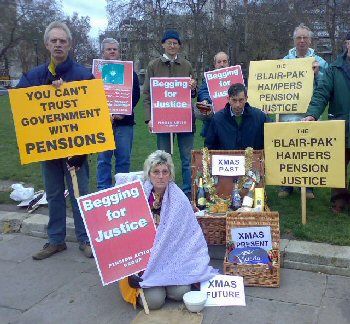 We held another demonstration outside the House of Commons on 13th December, timed to coincide with Prime Minister’s questions. The theme was ‘begging for justice’ and linked our plight with that of the Farepak victims. They have lost several hundred pounds of their savings and faced a bleak Christmas this, one, year. Most of us have lost thousands of pounds and face a bleak Christmas each and every year, but there was no sign of Gordon Brown giving up a day’s pay for us, or of sending any of his affected constituents a hamper as he did for Farepak victims. We held another demonstration outside the House of Commons on 13th December, timed to coincide with Prime Minister’s questions. The theme was ‘begging for justice’ and linked our plight with that of the Farepak victims. They have lost several hundred pounds of their savings and faced a bleak Christmas this, one, year. Most of us have lost thousands of pounds and face a bleak Christmas each and every year, but there was no sign of Gordon Brown giving up a day’s pay for us, or of sending any of his affected constituents a hamper as he did for Farepak victims.
* * * * * * * * * * * * * * * *
Judicial review update - 5th December 2006
The Department of Work and Pensions was supposed to have submitted its defence to the High Court by 22 November but failed to do so and, when asked, said that it would be ready by 13 December. Our lawyers challenged this and the judge, Sir Andrew Collins, responded forcefully: "I shall require a full explanation why the 35-day time limit was not met . . . The rules are there to be obeyed and an application to extend time should have been made before it expired . . . simply announcing there would be non-compliance is hardly acceptable." He then summoned them to appear before him on 5 December.
Miraculously, the DWP lawyers were able to produce their defence just before the hearing and, through making profuse apologies and some serious grovelling, were able to persuade the judge to accept it and not disqualify them from the hearing. Our team were awarded costs.
However, the Government have still not withdrawn the threat of seeking 'unlimited costs' from the brave pensioners who are undertaking the action. This could amount to hundreds of thousands of pounds if the case goes to appeal. The Pensions Minister James Purnell was directly challenged on this by Richard Burden in the parliamentary debate and this is what was said:
Richard Burden: "My hon. Friend said that the Government were waiting to hear from the pensioners' representatives, but it has now been established that it is the other way round. When will the representatives of the pensioners be hearing from the Government? "
James Purnell: "That has not been established. I said - this continues to be the situation - that the representatives have not made the case that the matter fits into the normal precedent whereby the Government would waive costs. We have said not that we will enforce costs, but that we will consider them, as we always do, at the end of the case."
In fact, our legal team have written at least nine times to the DWP asking for the threat of costs to be dropped and have met only with evasion and prevarication.
* * * * * * * * * * * * * * * * * * * * * * * * * *
Parliamentary debate - Government remains defiant Thursday 7th December 2006
The long-awaited debate on lost pensions and the Government’s defiance of its regulators has now taken place in the House of Commons.
There was a powerful opening speech by the chair of the Public Administration Committee Tony Wright, who made the case clearly and eloquently for Government to recognise the authority of Parliament and to organise appropriate compensation for those affected. Although the debate was curtailed through lack of time, he was followed by speaker after speaker who all (bar one) supported and amplified the case he was making. Throughout the speeches there were a series of interruptions by members who had not been able to get on the list of speakers but who still had important and supportive points to make.
The one dissenting MP was the last to speak. Having heard all the arguments, who was it who could not see that the Government was at fault, and who believed the Parliamentary Ombudsman, the entire Parliamentary Select Committee and all of the previous speakers were misguided? It was the Minister for Pensions Reform, James Purnell. He looked a lonely figure as he insisted that everyone was out of step apart from him.
Because (in spite of all evidence to the contrary) he does not believe that the Government was at fault to the slightest degree, he does not feel that compensation is appropriate. Such help as he is prepared to offer is therefore merely a recognition of hardship rather than righting a wrong done by Government. And he feels that the Financial Assistance Scheme is the very best that can be offered, given the Government’s duty to be frugal with taxpayers’ money.
You can read a full transcript of the debate in Hansard here: http: //tinyurl.com/ydoeaq
There was no vote at the end of the debate, so Parliament has not yet delivered its verdict on the Government’s behaviour. We must therefore redouble our efforts to persuade MPs of all parties to convince the Government that it must change its mind.
* * * * * * * * * * * * * * * * * * * * * * * * * *
Protests in Parliament Square - 6th & 13th December 2006
Two small protests were held on Parliament Green outside the House of Commons on consecutive Wednesdays, timed to coincide with Prime Minister's Questions. The theme of the first protest (which coincided with the pre-budget presentation) was 'Budgeting for Justice' and the second was based around Christmases past, present and future, with hampers of rapidly decreasing munificence.
Both were well received, with many passing vehicles sounding their horns in support and several MPs came out to see us, including Phillip Hammond, the Shadow Secretary of State for Work & Pensions.
* * * * * * * * * * * * * * * * * * * * * * * * * *
London Protest March Sunday November 5th 2006
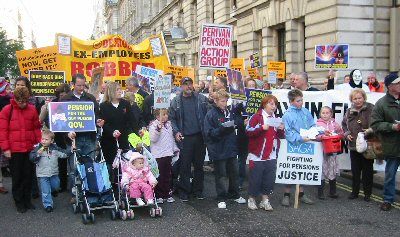 Over 300 people took part in a protest march in London on Sunday 5th November . The theme of the march was Guy Fawkes (the only man ever to enter Parliament with honourable intent). In addition the marchers had brought along their children and grandchildren from all over the country to demonstrate that the loss of a pension affects not just the workers but also many generations Over 300 people took part in a protest march in London on Sunday 5th November . The theme of the march was Guy Fawkes (the only man ever to enter Parliament with honourable intent). In addition the marchers had brought along their children and grandchildren from all over the country to demonstrate that the loss of a pension affects not just the workers but also many generations
 The grandchildren had all written individual letters to Gordon Brown and Tony Blair. These were collected in a mock up red postbox by suitably attired postman Bob Duncan (Dexion). The letters were marked for the attention of Tony Blair and Gordon Brown and delivered to 10 Downing Street by, at the back Mick Eaglestone’s granddaughters Maya Lewis (11) and Ruby Lewis (13) with John Benson’s grand daughter Danielle Benson (7) and Alan Marnes’ grandson Aaron Carter (3) holding the bag. Peter Humphrey and Dr Ros Altmann escorted the children. The grandchildren had all written individual letters to Gordon Brown and Tony Blair. These were collected in a mock up red postbox by suitably attired postman Bob Duncan (Dexion). The letters were marked for the attention of Tony Blair and Gordon Brown and delivered to 10 Downing Street by, at the back Mick Eaglestone’s granddaughters Maya Lewis (11) and Ruby Lewis (13) with John Benson’s grand daughter Danielle Benson (7) and Alan Marnes’ grandson Aaron Carter (3) holding the bag. Peter Humphrey and Dr Ros Altmann escorted the children.
After the letters had been delivered the march continued past Parliament to St Johns Smith Square where there were speeches from pensions expert Dr Ros Altmann, Adam Price MP, Jo Thornhill (from the Mail) and Sittingbourne and Sheppey Tory candidate Gordon Henderson. Dr Altmann also read out a letter from Tim Bull of Saga. This letter can be found on our Documents page. For the record, the use of a loudhailer for the speakers meant we had to pay Westminster Council £150 for a license.
Thanks as ever to the Metropolitan Police for the slick organisation and their unfailing good-humour and common sense.
There was a very good media turnout and excellent reports appeared in many newspapers. We were covered, with interviews, on local TV and radio but unfortunately the Saddam Hussein trial verdict pushed us off the nationwide TV news channels.
* * * * * * * * * * * * * * * *
Farepak
The distribution company Farepak went out of business at the beginning of November, leaving, as an odd co-incidence, about 100,000 people without the Christmas goods they had saved for during the year. This was a tragic event for those affected who will, as a result, face a bleak Christmas.
The government’s response, though, was very interesting. Gordon Brown said it was a “National Disaster” (his own words) and wrong that people “could lose the money they had conscientiously saved”. A fund was started and MPs were asked to donate a day’s pay to the fund. Most are apparently complying. In addition the government leaned on the High Street chains of Tesco, Sainsbury, Morrison, M&S etc to make donations. They have also had quiet words suggesting help from Farepak’s bank.
All this is very fair and honourable, but does it not jar with the way the government had treated us? The Farepak customers have lost one Christmas and a few hundred pounds. We have lost all the Christmases for the rest of our lives and hundreds of thousands of pounds.
The government had no liability whatsoever for Farepak’s trading, yet it has acted responsibly. What is the difference? The cynical may think that it is a clever low cost media spin exercise to make Gordon Brown seem human.
* * * * * * * * * * * * * * * *
Judicial Review
The Pensions Action Group have been granted a Judicial Review of the government’s rejection of the Ombudsman’s report. The hearing is scheduled for the High Court on 7th February 2007. The Group are represented on a no win no fee basis by solicitors from Bindmans and barristers from Blackstone Chambers. The four brave named claimants, through, do risk being liable for the government’s costs if we lose. The government are trying to bully us into withdrawing by refusing to agree the case should be heard on a pro bono basis.
* * * * * * * * * * * * * * * *
Labour Party Conference Manchester, September 27th 2006

Party conferences are normally held in seaside conference centres such as Brighton, Bournemouth or Blackpool, so the venue of the GMEX centre, the old railway station in the centre of Manchester, was unusual. The day started early with Alan and Jenny Marnes along with Richard Nicholl handing out stickers and our “Pensions Big Issue” to passers by and targeting anybody wearing a conference pass. We only just missed speaking with Bob Geldoff
Meanwhile Pete Wheeler and the Kalamazoo crew were negotiating the maze of city centre roads in the their advertising trailer decorated with enormous posters kindly provided by Saga who are supporting our campaign. Saga also provided the excellent hand held placards which can be seen in all the photographs
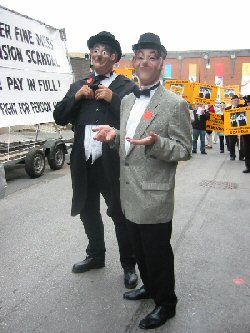 Over 200 people turned up for the march itself which had a Laurel & Hardy theme. (“Another fine mess you’ve got me into”) Many people dressed accordingly, the photo shows Peter Wheeler (left) and Roy Dutton from Kalamzoo. Led by the advertising trailer we set off at 1pm for the half mile march to GMEX. The route of the march took us under a long tunnel which passes under he GMEX centre so we took advantage of the situation to make as much noise as possible. We gather we were heard in the conference itself. Over 200 people turned up for the march itself which had a Laurel & Hardy theme. (“Another fine mess you’ve got me into”) Many people dressed accordingly, the photo shows Peter Wheeler (left) and Roy Dutton from Kalamzoo. Led by the advertising trailer we set off at 1pm for the half mile march to GMEX. The route of the march took us under a long tunnel which passes under he GMEX centre so we took advantage of the situation to make as much noise as possible. We gather we were heard in the conference itself.
We were guided into a demonstration area outside GMEX where we performed the traditional “Stripped of our Pensions” (even the press now call it “traditional”). It is rather different doing this on city centre pavements to doing it on seaside beaches, so many of the performers wore their socks and their Laurel & Hardy bowler hats; with Manchester’s reputation for weather you can’t be too careful at our age as we didn’t want to have to call on Jacquie Humphrey’s girl guide first aid skills! Our three striptease circuits attracted a lot of interest from the media and TV crews including a team from ITV who are preparing a programme on us which will be shown early in 2007. This crew had spent the day with us and travelled up with the protestors from Dexion, ASW Sheerness and BUSM. The filming of the bus on the busy M6 by a camera car blocking the outside lane was “interesting”
The police allowed us to stay for about a noisy hour during which time many people, including Tony Benn and many MPs crossed over the road to speak with us.
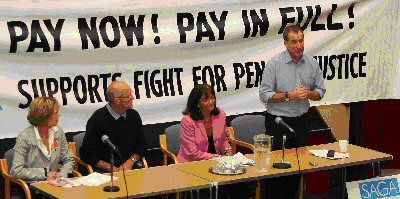 After our demonstration Saga had arranged a press conference in the nearby Friends Meeting House. The conference was chaired by Dr Ros Altmann and other speakers included Emma Soames (Saga Editorial Director), Darrel Watkins (who worked for BUSM for over forty years then lost his pension) and Alan Simpson MP (Labour, Nottingham South) who is collecting signatures for a House of Commons petition (see our home page for how to download this petition). A copy of Ros’ speech can be found on our Documents page. After our demonstration Saga had arranged a press conference in the nearby Friends Meeting House. The conference was chaired by Dr Ros Altmann and other speakers included Emma Soames (Saga Editorial Director), Darrel Watkins (who worked for BUSM for over forty years then lost his pension) and Alan Simpson MP (Labour, Nottingham South) who is collecting signatures for a House of Commons petition (see our home page for how to download this petition). A copy of Ros’ speech can be found on our Documents page.
Our thanks go to all those who turned out for a weekday protest (including Ros who flew home early then travelled up by train on the morning), those who helped to organise such a successful and enjoyable day out; to Saga for their encouragement and support, the Manchester Quakers who allowed us to use their meeting house at short notice; and to the Manchester Police for their friendly and sympathetic guidance. Our police contact wrote afterwards: “It was a pleasure to meet you all and your 'cheeky' stunt was well appreciated by all the Event Control Room. It brought some well needed light relief to the staff working in there all week!“
Our next protest is Whitehall in London at 1pm on Sunday 5th November when we expect the ITV crew to join us again. See you there!
* * * * * * * * * * *
Support from Saga
Saga have added their support to our cause, giving us excellent coverage in their magazine and on their web-site.
The web-site can be found here where you can add comments and stories
They also are running an on-line petition which can be found here. Please sign this petition and ask you friends, neighbours, relatives, work colleagues, MPs etc to do the same. (Note: these links are dead as at 2019, but there is some information here.)
* * * * * * * * * * * * * * *
Bindmans Claim
All the bills for this have now been sent out, via e-mail where possible or by post where no e-mail address was given. If you sent in a form to Bindmans and have not received a bill please contact us as we do know of some e-mail requests having been filtered out by the spam filter in the recipient’s service provider
If you have not paid please do so as soon as possible. We will be sending out reminders in the near future as the Pensions Action Group are liable for the bill, but chasing will cost us time and money we can ill afford. Please help us by paying promptly
Several people who sent in forms just after the closing date have been included on the writ and have therefore been sent bills. Bindmans promised they would process every form received by close of business on the Friday, and they took on extra staff to achieve this. They put late forms on one side in date order and, once all the in time forms had been done, they processed as many of these late forms as possible. The payment requests have only been sent out to people whose names are on the writ, so if you have received a request for payment you have been included on the claim.
* * * * * * * * * * * * * * *
PASC criticises government on the pensions promise—and warns about constitutional threat to the Ombudsman
In its report, ‘The Ombudsman in Question: The Ombudsman’s report on pensions and its constitutional implications’ (HC 1081), the Public Administration Select Committee criticises the government for breaking the 'pensions promise' and failing to respond appropriately to the Ombudman's report on the issue. A copy of the report can be found on the PASC website. A press release from Dr Ros Altmann can be found on our documents page
The Ombudsman published her report ‘Trusting in the pensions promise: government bodies and the security of final salary occupational pensions‘ in March 2006. The Government rejected both the finding of maladministration and her recommendation that the Government should consider whether it should make arrangements for the restoration of full pensions to those affected.
The PASC concludes that:
* Once the Government had chosen to give information about the pensions system, that information should have been complete and accurate. Instead, they failed to mention one of the greatest risks. The Ombudsman’s finding of maladministration was correct.
* The Government cannot simply abandon people who have lost significant sums of money. It should work with others who share responsibility to find a solution.
* The Government has become far too ready to question the Ombudsman’s findings of maladministration. She is Parliament’s Ombudsman, and Government must respect her. There is now a threat to the Ombudsman’s consittutional position.
Tony Wright, Chairman of the Committee, said:
“It was entirely reasonable for people to put trust in government information on the safety of their occupational pensions. The pension leaflets neglected to warn of a substantial risk; people have lost significant sums of money. This was clearly maladministration and the Ombudsman was right to say so. The Government should stop quibbling over this and act to find an acceptable solution for the thousands affected. As the Ombudsman herself has said, it’s maladministration – get over it!
"If government became accustomed simply to reject the Ombudsman's findings of maladministration in this way, it would raise fundamental constitutional issues about the position of the Ombudsman and the relationship between Parliament and the Executive."
* * * * * * * * * * * * *
European Court Announcement 13th July 2006
The Advocate General of the European Court of Justice (ECJ) has given her legal opinion on the trade unions' case brought under Article 8 of the Insolvency Directive. It is not good news. The conclusions, shown below, effectively say that British law controlling pensions does not fully comply with EU law, but the shortcoming is not sufficient to require compensation to be paid (that is the meaning of “serious breach”). The full verdict can be found online here. Select Court of Justice since 1989 and scroll down to C-278/05 Robins & Others (near the end) and click on the link
This is not the end of the ECJ route. This is only the opinion of the court’s legal officer; the final result will only be known in the Autumn when the court itself delivers its verdict. The court will be influenced by the Advocate’s opinions, but does not have to comply with them
There was no mention of temporal limitation. This, again, is something the court will resolve in the Autumn.
The Pensions Action Group is continuing its campaign for a settlement around the Ombudsman’s report, the Judicial Review, the findings of the PASC and public pressure on backbenchers. The ECJ verdict has no influence on our case which contends government mal-administration
A press release from Dr Ros Altmann can be found on our Documents page.
Extract from the Advocate General’s Conclusion
100. On the basis of the foregoing considerations, I propose that the Court reply as follows to the questions referred to it by the High Court of Justice of England and Wales, Chancery Division:
(1) Article 8 of Directive 80/987/EEC in principle requires full protection of employees’ interests with regard to their acquired or prospective rights to benefits under company or inter-company old-age benefits schemes. The protection afforded by Article 8 of Directive 80/987 also extends to adverse effects resulting from the under-financing of the benefits scheme, if those adverse effects are attributable to insolvency.
(2) Article 8 of Directive 80/987 does not oblige Member States to guarantee the protection of employees’ interests by means of their own payments.
(3) According to the Court’s case-law, a breach of Community law will be sufficiently serious where, in the exercise of its legislative powers, a Member State has manifestly and gravely disregarded the limits imposed on the exercise of its powers. The mere infringement of Community law may be sufficient to establish the existence of a sufficiently serious breach if, at the time when it committed the infringement, the Member State in question was not called upon to make any legislative choices and had only considerably reduced, or even no, discretion.
* * * * * * * * * * * *
Updated 12th July 2006
On 1st June, the European Court of Justice heard the test case presented by the unions Community and Amicus, who are claiming that the UK Government is in breach of EU directives by failing to protect our pensions. It apparently went very well (but see above!) The initial summary from the Advocate General will be made on July 13th and this will be followed by the court's judgment in the Autumn.
However the British and Irish government have thrown a spanner in the works with an application for what is called a temporal limitation (TL). The effect of this, if granted, would be that any ruling from the court will only apply to people who have issued a writ before the date of granting. This could be as early as July 13th.
In other words, if you have lost part or all of your pension through insolvency of your employer, you need to have a claim lodged in your name in the High Court before 13th July or you may not receive any compensation which results from the ECJ case.
This is not as scary as it sounds. The cost of lodging the claim is about £1,000, with maybe another £1,000 in fees, but a claim may have any number of names on it so the cost can be brought under control. There are basically four options.
1) If you are member of Community, Amicus or T&G then they will add you to the list of names associated with the existing court case, so contact them now to ensure that this is done. If you have any concerns about this speak with your local union officials. If you are a lapsed or retired member it is still worth contacting your union as they may let you rejoin. If you are a member of another union, try them first as they may also be prepared to act for you.
2) Talk to your independent trustee. Via their collective body TACT some trustees are submitting claims on behalf of all their members (including transferred-out members), paying the cost from the pension fund. They consider this to be a valid use of funds as the cost is low relative to the possible benefit to large numbers of their members.
3) Join a group claim. The solicitors Bindmans have run a group claim on behalf of everyone who contacted them by close of business on Friday 7th July, however it is now too late for further applications. Because the temporal limitation may not apply until the court's verdict in the Autumn there may be a second writ issued in the Summer for those who missed the July writ. Watch this space.
4) Cross your fingers and hope the Temporal Limitation is not granted
Notes:
a) There are three possible outcomes of the ECJ case:
i) The ECJ find for the government, temporal limitation is irrelevant
ii) The ECJ find for the unions but do not grant the temporal limitation
iii) The ECJ find for the union and grant the temporal limitation
We will not know the outcome, and hence whether we have won compensation (or wasted our money) until the announcement is made.
b) If the temporal limitation is granted, (which is not certain), the earliest date could be the 13th July but later dates are possible.
c) Even if the ECJ finds for the union the award may not be 100% of your lost pension, the ECJ has a history of fuzzy judgements (e.g. a phrase like 'reasonable compensation' may be used whch then has to be resolved in a British Court)
d) None of us have any legal training so we cannot give advice and the decision you make must be your own.
Please, please, complain to your MP about what a dirty trick this Temporal Limitation is. Point out the worry and cost that it is causing to people who cannot afford it. Point out that with the short time we do not have a hope of contacting everyone affected so many people will be left out. Point out that the government dismissed the Ombudsman's highly critical report and with this legal trick they are trying to do the same with the European Court of Justice.
* * * * * * * * * * * * * * * * * * * * * * * * * *
Select Committees - June 2006
Ros Altman, Andrew Parr (ASW) and Bob Duncan (BUSM) gave evidence to the Public Administration Select Committee on 22 June 2006 regarding the Government's rejection of the Parliamentary Ombudsman's report and gave an excellent account of themselves. You can find the transcript here. By contrast John Hutton (Secretary of State for Work and Pensions) who gave evidence on 28 June 2006 was given a real roasting. The transcript is available here.
James Purnell (Pensions Minister) gave evidence to the Work and Pensions Standing Committee on the Financial Assistance Scheme, also on 28 June, but had a relatively easy time without being seriously challenged. The transcript should be available soon.
Sound or video footage is available of all sessions for one month afterwards. They can't be linked to directly but you can find them by going to http://www.parliamentlive.tv and clicking on 'Archive'. Then set the date, click on 'committees' and enter the name of the committee in the search box. The results page will give the option of watching or listening to the session. (Note: the video is no longer available but a transcript can be found here.) (Ros Altman's evidence starts at about 1hr 35 mins into the recording of that session.)(A transcript of Ros Altmann's evidence may be found here.)
* * * * * * * * * * * * * *
Judicial Review
Papers have been lodged in the High Court of Justice on Wednesday 14th June 2006, against the Secretary of State for Work and Pensions - John Hutton - requesting a Judicial Review of the Government’s decision to reject the findings and recommendations of the Parliamentary Ombudsman’s report ‘Trusting in the Pensions Promise’.
This case is being brought on behalf of all those who have suffered injustice and loss when their company pension scheme wound up and was found to have insufficient assets to meet the payment of their expected pensions, even though Government assured that public that such schemes were safe and protected by law.
A Press Release by Dr Ros Altmann can be found on our Documents page
* * * * * * * * *
European Court of Justice (ECJ) 1st June 2006
The trade unions legal action in the ECJ was heard in the Thomas Moore building of the ECJ in Luxembourg in the morning of Thursday 1st June. The unions were represented by Ivan Walker, solicitor, and David Anderson (QC) who argued that pensions legislation in the UK does not comply with Article 8 of the 1982 Insolvency directive which reads:
“Member States shall ensure that the necessary measures are taken to protect the interests of employees and of persons having already left the employer’s undertaking or business at the date of the onset of the employer’s insolvency in respect of rights conferring on them immediate or prospective entitlement to old-age benefits, including survivors’ benefits, under supplementary company or inter-company pension schemes outside the national statutory social security schemes.”
The unions were opposed by the UK government (Professor Wyatt QC) and barristers from Holland and the Southern Ireland government.
The hearing was largely controlled by the Attorney General (AG) who is an officer of the Court rather than a judge, and her opinion "guides" the Court on how they should decide the case. She will have gone into the detail of the case more than the judges before the hearing. The AG's opinion is followed by the Court in about 80 - 85 % of cases. The AG asked what minimum floor of guarantee exists in the UK. Professor Wyatt’s answer was effectively "none" although he went all around the houses to say so. The AG was not impressed
A question from the President of the Court was perhaps more revealing. He asked the Commission's counsel whether the Commission was saying that Art 8 required 100% protection, or whether they were saying that, without committing themselves to saying what it requires, 20% is not enough. The Commission went for the latter option. That might set up a classic ECJ fudge if the Court says the same thing.
The AG said that she will produce her opinion by the 13th July. It will be delivered very briefly in Court but more to the point will be available on the ECJ website at 9.30 a.m. The Court will deliver its judgment in the early Autumn. There is no fixed date for this and we will only find out the day before. Again, it will be published on the website
Rather worryingly the UK, Dutch and Irish barristers have asked for the court to apply a temporal limitation to its judgment. Effectively this would mean a union win would only apply to those people who have submitted a writ to the UK government before a specified date. If granted (and this is by no means certain) the earliest date that could apply is the 13th July. Members of Amicus and Community unions should be having their names submitted automatically. Other unions may be doing this as well, but union members should check what is being done for them. The PAG is looking at what can be done for non union members but time is short. People should certainly complain to their MP about this dirty trick, and contact their independent trustee to see if they can submit names; they have a duty to protect scheme member’s interests
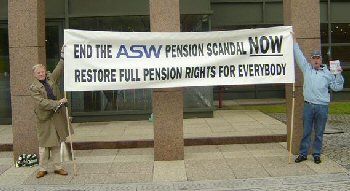 John Benson, Phil Jones, (both ASW) and Owen John Thomas, Plaid Cymru AM, (Welsh Assembly Member) attended the Court Hearing.. They stood outside holding up a big banner which stated Pension Justice for the ASW workers and Full Pension Justice for everyone, and handed out Big Issue leaflets to staff of the European Court and members of the media. John Benson, Phil Jones, (both ASW) and Owen John Thomas, Plaid Cymru AM, (Welsh Assembly Member) attended the Court Hearing.. They stood outside holding up a big banner which stated Pension Justice for the ASW workers and Full Pension Justice for everyone, and handed out Big Issue leaflets to staff of the European Court and members of the media.
They achieved coverage from BBC Radio, BBC Wales television, and HTV Wales and the press.
The trip was financed by collections in Cardiff. The photo shows and Owen John Thomas (left) and John Benson (right) outside the court
* * * * * * * * * * * * *
Notch Meeting
 A Notch meeting was held on Sunday 11 June in North London. The main decisions taken that we would proceed with the Judicial Review, that we would encourage as many submissions as possible to the Work & Pensions and the Public Administration Select Committees in Parliament, and that we would keep up the pressure through MPs and the local press. Various people also undertook to find out the background to the Temporal Limitation in the ECJ and to alert people as soon as possible (see above). A Notch meeting was held on Sunday 11 June in North London. The main decisions taken that we would proceed with the Judicial Review, that we would encourage as many submissions as possible to the Work & Pensions and the Public Administration Select Committees in Parliament, and that we would keep up the pressure through MPs and the local press. Various people also undertook to find out the background to the Temporal Limitation in the ECJ and to alert people as soon as possible (see above).
* * * * * * * * * * * * * *
European Court of Justice 1st June 2006
Amicus and Community unions’ legal action in the European Court of Justice (ECJ) will now start on Thursday 1st June. A press release from Community can be found on our documents page
* * * * * * * * * * * * * *
John Hutton Announcement 25th May 2006
John Hutton announced in Parliament that the FAS will be extended to cover more people. Those within seven years of retirement as of May 14th 2004 will get 80% of their entitlement, those within eleven years will get 65% and those within fifteen years will get 50%. Beyond that not a penny. The expansions of the scheme is welcome news, but the same comments still apply: many people are excluded including those from solvent companies, 80%, payment from state age not scheme age and no protection against inflation
Another bizarre anomaly has come to our attention. A woman with a scheme age of 60 and a state age of 60 will not be eligible for the FAS until the male state age of 65. Yet another examples of how the DWP are making up the rules as they go along
* * * * * * * * * * * * * *
Protest in the House 25th May 2006
A small group comprising Phil Healy, Jean Wade, Marlene Cheshire and Brian Mealing held a protest in the public gallery of the House of Commons at the end of John Hutton’s speech. They were rapidly, but politely, evicted by “the men in tights”. They were warned but no charges were brought. The protest was not covered on TV, but led to an interview and full page story in the Daily Mail.
* * * * * * * * * * * * * *
Parliamentary Administration Select Committee (PASC) 2nd May 2006
The Parliamentary Ombudsman comes under the remit of the Parliamentary Administration Select Committee (PASC) who have decided to review the report and the government’s response to it. They have started by formally questioning Ann Abrahams and the minutes of her testimony can be found here. It would seem that the PASC is as doubtful as we are about the government’s response
* * * * * * * * * * * * * *
£15 billion? A back of an envelope calculation
In Parliament on March 16th 2006 Tony Blair came up with a remarkable estimate of £15 billion to meet the recommendations in the Ombudsman’s report. This figure is totally ridiculous and seems to have been deliberately chosen to scare back-bench MPs
The main reasons for this high figure seem to be:
• They have included the 40,000 people previously excluded by the £500pa lower limit, taking the number of claimants up to 125,000
• They have assumed everyone lives to 95, increasing the cost by 50% (a more accurate figure is 85)
• They have incorrectly allowed for inflation by using gross rather than net present value (NPV) figures. This has increased the cost by a factor of two
• They have made no allowance for the money that will not be paid in benefits or money that will be reclaimed by taxation.
Calculations have been done by several experts, and these all agree that the total (NPV) cost is between £4bn and £5bn over fifty years, an average of around £100million per year.
Accurate calculation requires a large spreadsheet and considerable time, but there is a quick and simple reality check. Note that we are not proposing this as a solution, just as a way of giving a quick ballpark figure:
The DWP say the average loss is £1815. To receive this from an annuity with rates of 3.5% would require a lump sum of 1815/0.035 = £51,857. The total capital required to do this would therefore be 125,000x 51,857 = £6.5bn. For people yet to retire the capital would be invested to cover inflation. This method significantly over-estimates the cost as annuities are not efficient and, again, tax and benefits claw back has been ignored.
* * * * * * * * * * *
Welsh Labour Party Spring Conference 25th March 2006
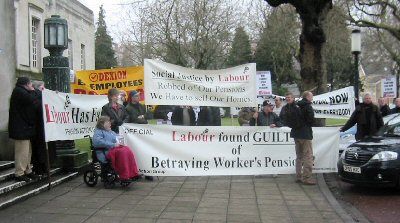 Members from Dexion & ASW Cardiff/Sheerness protested outside the conference held at the Brangwyn Hall in the Swansea Civic Centre. Jean Wade and Lesley Kelleher handed out Pension Big Issues to attendees and the media. Sally Hayter used a megaphone to lead the continuing chants of “Labour is GUILTY” and “Guilty as Charged”. We gather our chants could be heard inside the hall. Most attendees took the handouts and many commented that they agreed with us. Members from Dexion & ASW Cardiff/Sheerness protested outside the conference held at the Brangwyn Hall in the Swansea Civic Centre. Jean Wade and Lesley Kelleher handed out Pension Big Issues to attendees and the media. Sally Hayter used a megaphone to lead the continuing chants of “Labour is GUILTY” and “Guilty as Charged”. We gather our chants could be heard inside the hall. Most attendees took the handouts and many commented that they agreed with us.
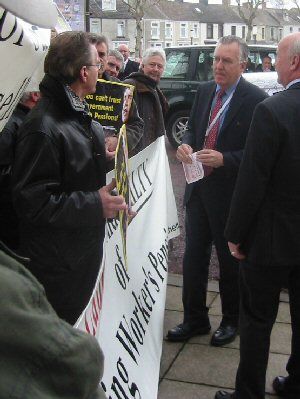 We asked to speak with First Minister for Wales Rhodri Morgan but he would not speak with us. Peter Hain, Secretary of State for Wales, stopped both on the way in and out, and is shown speaking with Phil Jones & Chris Dacey. He seemed sympathetic and expressed surprise at the very limited number of FAS payments that have been made. He promised he would speak with John Hutton on our behalf We asked to speak with First Minister for Wales Rhodri Morgan but he would not speak with us. Peter Hain, Secretary of State for Wales, stopped both on the way in and out, and is shown speaking with Phil Jones & Chris Dacey. He seemed sympathetic and expressed surprise at the very limited number of FAS payments that have been made. He promised he would speak with John Hutton on our behalf
Community union had promised that local area organiser Steve McCool would come and speak with us, but he made no effort, and was only spotted by someone who recognised his face. The conversation was not very productive
There was good media coverage, including BBC TV news, and John Benson’s local knowledge and contacts proved very useful. A Norwegian reporter travelled down to speak with us for articles he is writing for several Scandinavian magazines. He spoke at length with Peter & Jaquie Humphreys about the Dexion Norwegian connection.
Thanks to John Benson for organising the day, and everyone who came from all over England and Wales. With a 9:00am start this meant very early starts or overnight stops for those coming from Hemel Hempstead and Kent. Thanks also to the local Swansea police and the staff at the Brangwyn hall for their continuing good humour and common sense.
* * * * * * * * * * * * * * * *
Pensions Briefing held 21st March 2006 at Portcullis House Westminster.
Based on notes from Peter Odell & Alan Marnes
The meeting was organised by Sandra Osborne, MP for UEF workers from Ayr, in conjunction with Amicus trade union. The purpose of the meeting was to brief Amicus sponsored MPs and others. Rather bravely, pensions minister Stephen Timms came along and was the first speaker
Stephen Timms The government understands how difficult the situation is, they do not misunderstand why you are so angry. But the government cannot agree to use taxpayer's money to fund your future pensions. It was not the government leaflets that caused the down fall of our pensions. The government have done the right thing, in setting up the FAS. The government blame the trustees for not getting the info to them quickly enough. There will be a review of the FAS and they hope to do that before too long. The FAS. is to pay out as quickly as they can. There is money in the budget, and the government is embarrassed that it is not paying out to the most needy, the over 65, ill health etc. the DWP is pressing the Trustees to know who needs the funds now. They are currently paying 60% of expected entitlement to those identified. But the Government need to process the numbers more quickly. He went on to explain why the government reject the ombudsman's recommendations.
Bryan Freak (Amicus)The unions have continually campaigned that the funds put into the FAS was not enough, but we had to start somewhere, we had to protect pensions, it is unfortunate that only 15000 people will currently benefit from the FAS that is only 20% of those we think have had their pensions stolen from them, we will fight on. We don't like the 3 year limitation, it is unjust, how can anyone of those affected plan for retirement. We welcome the promised review, but it is not clear what the subject of the review is. There should be no restriction on solvent groups as they are as important as the insolvent group. The PO report has stated that successive governments are at fault. And they should consider compensating those affected, and we support with that. The government weakened the MFR The government makes no recognition that the 85000 did the right thing. It's not satisfactory for the government to reject the finding of their own independent body. The £10 delimiting rule is unacceptable. They must look into the Ill health situation quickly. We will fight on to get the situation resolved. We say to MPs you did a job to get the FAS start up phase, but must continue the fight.
Sue Andrews (Trustee acting on behalf of many scheme in wind-up) There are today 32 people in the FAS, she represents 25 of the pensions schemes in wind up, of those 27 people are in the FAS There are 52 bits of info for each member to be filled in on the forms for submission, the forms are complex. But we do not accept that it is the trustees fault for the delay in processing members, that is not true. She went on to explain the intricacies of the FAS form. The annuity costs are such that the deferred members are financing their already retired members. The government should redesign the FAS to compensate all & compensate for loss. She explained that a huge group of individuals fall into the <£520 pa group so will get no help. This explains the difference between our 85,000 and DWPs 125,000 figures, the extra 40,000 are all in the de minimis group. This may also explain the £1815 figure as so many are due less than £10 per week. She went on to say how the bureaucratic costs are more in many cases than the actual pay out to the individual
Stephen Timms We have set up a working group to see what else we can do, we want to speed up the way we pay out the assistance. It was not the tax on schemes shares that caused the problem, it was the returns from the stock market that triggered the demise of pension schemes. The reported £5b never was that, it was nearer £2.5b. Mr Timms left the meeting.
Brian Gallagher (Press Officer Amicus). This is not just a labour problem it is a government problem, we will continue to fight for the pension rights. These people have no chance to regain there losses, we recognise that the FAS is really poor, we also supported Frank Field when he 1st outlined the use of orphaned assets to compensate the victims of this pensions disaster. We do not accept that it would take £15bn to put things right, it would be nearer £3bn to £5bn do the job and that over 50 years
Terry Roonie MP Spoke in support of the governments setting up of the assistance scheme. and that they are working to make it better.
Alan Marnes Spoke against the use of Annuities and that they were an utter waste of the funds resources. When the return on the funds end up being given to the share holders of the providers ,rather than for those there were paid in by and for the provision of our pensions.
UEF Member. stated this situation had taken his job, pension and heath, it was up to this government to put it right.
Pete Wheeler asked about the PO report and how can this government be so dismissive of the Ombudsman, their own independent body. This report was asked for by the people affected, but the government still refuse to abide by the findings. Sandra Osborne Outlined the EDM she was proposing to table that night to try and get the assistance of all sides of the house to correct this injustice. That the government were not getting off Scot free as she will pursue the issue as far as she can.
Rt Hon Frank Field MP What is needed is a political strategy that the government can accept and made an impassioned plea to not push the government on complying with the PO's report with taxpayers money as he felt they will not change their minds. He feels we should pursue the unclaimed bank money route. 10 years ago I put forward that Occupational pensions were unsafe, they will accept reasoned demands and we must push for the use of unclaimed assets, the more proposals that are made the easier they are to dismiss. Using some of the unclaimed assets would still leave over many billions of pounds still for the government to use for other causes. The government know things have gone wrong, and are trying to put things right, but in order to do so, we must use the strategy wisely. Sandra’s EDM 1868 (see above) follows Frank Field’s advice, does not criticise the government and proposes using unclaimed assets.
Ivan Walker (solicitor acting for Amicus in connection with the ECJ action) spoke about the PO report. There were several instances where the Gov were told of inadequacies of pensions. Then went on to outline the unions ECJ case, he said If we win the Government can’t back out of the decision. They will consider:- Did the UK government protect pensions in insolvency, and if the UK does not comply was it significant enough to require compensation? The time table for events is likely to be a one day hearing by the end of this year, Preliminary decision back by early 2007. Decision from ECJ. mid to late 2007. Back to the UK Law Lords, then to the House of Lords. That is likely to be 2009/10
Ken Penton (Press Officer Community trade union) We have always believed that successive governments have been at fault. The unions took the FAS deal, but no one not even the government realised how few people it would actually help in the short term, the unions as well as everybody else were initially bewildered by the response of the government. There was as we all now know the FAS deal to save the government. From the unions position the Ombudsman. was not the strongest case to put to try and get the justice for the people affected. That is why we went straight to the ECJ route, which if successful will restore the pensions in full. We must keep the pressure up on the government in order to get this matter solved, that is why we support the use of a new EDM and we must keep up with the parliamentary campaign. there followed a series of questions by affected people from all over the country, all along the lines of their personal situation. All left the MPs, in no doubt that we are not going away and we will keep on at the government until our pensions are restored to us.
* * * * * * * * * * * * * * * *
Pensions Debate Saturday 18th March 2006
The DWP held a National Pensions Day on Saturday 18th March. Randomly selected members of the public were invited to whole day seminars where the future of pensions were debated. The seminars were held in London (Canary Wharf); Newcastle (St James' Park Football Stadium); Birmingham (NEC); Glasgow (Holiday Inn); Swansea (Aberavon Beach Hotel); and Northern Ireland (Waterfront Hall). Speakers included John Hutton, Stephen Timms and Adair Turner. It was a very high tech affair with all the locations linked by satellite
We targeted the London, Birmingham, Glasgow and Swansea events, protesting outside and handing our copies of the Pensions Big Issue to the public entering the events.
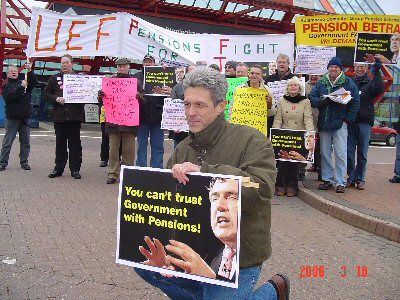 Report by Richard Nicholls on Birmingham where the protestors came from a variety of companies and organisations including UEF, Amicus, Kalamazoo and Burgess. The group were not allowed inside the meeting hall to either protest or to attend the forum, despite asking, so had to stand outside in the very cold weather! Copies of our protest leaflets and the first Big Issue were handed out. Patricia Hewitt arrived and took copies of all these, but was not prepared to discuss anything or to comment. We found out that there were about 250 members of the 'public' inside the event, and these had been chosen following street interviews in and around Birmingham. Radio 4 interviewed Peter Wheeler from Kalamazoo, for their Money Box programme. The photo shows Brian Mealing (Kalamazoo) Report by Richard Nicholls on Birmingham where the protestors came from a variety of companies and organisations including UEF, Amicus, Kalamazoo and Burgess. The group were not allowed inside the meeting hall to either protest or to attend the forum, despite asking, so had to stand outside in the very cold weather! Copies of our protest leaflets and the first Big Issue were handed out. Patricia Hewitt arrived and took copies of all these, but was not prepared to discuss anything or to comment. We found out that there were about 250 members of the 'public' inside the event, and these had been chosen following street interviews in and around Birmingham. Radio 4 interviewed Peter Wheeler from Kalamazoo, for their Money Box programme. The photo shows Brian Mealing (Kalamazoo)
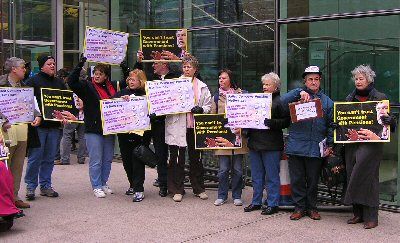 The London briefing was held at the Winter Gardens at Canary Wharf, a vast rambling maze with incredibly fierce cold gales blowing round the towers. It took us quite a while to find the venue! As at the NEC we were not allowed inside, so we stood at the entrance handing out Big Issues and briefing sheets to the attendees, several of whom stopped to talk with us. Amongst the speakers at Canary Wharf was John Hutton and we were hoping to speak with him as he arrived. Unfortunately he had been notified of our presence and entered the building by a back door. The media were in attendance at the event and came out to talk with us The London briefing was held at the Winter Gardens at Canary Wharf, a vast rambling maze with incredibly fierce cold gales blowing round the towers. It took us quite a while to find the venue! As at the NEC we were not allowed inside, so we stood at the entrance handing out Big Issues and briefing sheets to the attendees, several of whom stopped to talk with us. Amongst the speakers at Canary Wharf was John Hutton and we were hoping to speak with him as he arrived. Unfortunately he had been notified of our presence and entered the building by a back door. The media were in attendance at the event and came out to talk with us
Thanks to all those protestors who attended the various venues
* * * * * * * * * * * * * * * *
Report from the Parliamentary Ombudsman
The long awaited report from the Parliamentary Ombudsman was published on Wednesday 15th March 2006. As expected the report was scathing about government’s actions, in particular the content of advisory booklets. The report, nearly 300 pages in length, and a shorter summary, can be found on the Ombudsman’s website. The report recommends full restoration of lost pensions plus conciliatory payments for stress, effects on health and worry. At Prime Minister’s Question Time, Tony Blair said the government would reject the report, which leads to some constitutional questions such as what is the point of the Ombudsman if her findings are ignored.
Reports in the media support our case and are highly critical of the government’s decion to reject the report
OMBUDSMAN'S FINDINGS
* Government information on the security of final salary pension schemes was “inaccurate, incomplete, unclear and inconsistent”
* The Government’s failure to tell people about the risks to their pensions robbed a large number of people of the opportunity to make informed decisions about saving for retirement
* Two changes made by the Government to the minimum funding requirement decreased the safety of pensions
* The Government should replace in full the money and associated benefits lost to workers whose company went bust with a deficit in its final salary scheme
* The Government should offer additional compensation for the “outrage, distress, inconvenience and uncertainty”
* Compensation should be offered to workers who lost their pensions in similar circumstances between April 2004 and April 2005
* The Financial Assistance Scheme is inadequate and must be rethought
THE RESULTS FOR WORKERS
* Employees did not realise that final salary scheme contributions were not guaranteed to be returned to them in retirement
* Nor did they know that if their employer went bankrupt and their scheme was underfunded, they could lose all of their savings
The DWP's response can be paraphrased
* No one reads official leaflets anyway.
* But if they did, they should know they are meaningless
* It's trustees fault if people believe official leaflets, as the trustees should have told members to ignore Government leaflets
* Or maybe it's the actuaries fault, as they advise the trustees
* But it's not our fault! We act on advice, but not when we disagree with it
To which the Ombudsman bravely replied: "Nothing in the DWP’s submissions persuades me otherwise". At the end of the report she has taken the unusual step of laying the report before both Houses to denote that, in the words of the report: “I have found injustice in the consequence of maladministration which the Government does not propose to remedy.”
We trust backbench MPs will listen
* * * * * * * * * * * * *
Press Conference organised by Dr Ros Altmann
at The House Of Commons March 14th 2006.
Report by Paul Witton
Pensions Action Group spokesperson, Dr Ros Altmann welcomed all to the Pensions Action Group press conference, on the eve of the publication of the Parliamentary Ombudsman’s report on pensions. A full copy of her speech can be found on our Documents page
Ros explained that the report was independent and the facts therein cannot be disputed.
It affected a finite number of people, totalling around 85,000 who had lost part or all of their company pensions through no fault of their own. The cost to rectify, therefore, could be defined and was not an open ended figure.
These people understood that their pensions were guaranteed and protected, and was backed up by successive Government publications and statements. To put the cost into perspective Ros estimated that the Chancellor, Gordon Brown, could recoup the costs of restoring the pensions to 85,000 deprived members simply by eliminating the tax relief given to 200 international tax lawyers. (£100m to £150m per year )
Another option was to use the unclaimed assets in accounts nationwide. However Gordon Brown prefers to give it to other projects.
Ros summarised the opening statement by stating that, responsibility now lies with the Chancellor, and he is the one who should put it right.
A number of speakers then highlighted own plight to the gathered press:
1) Dave Baker - Dave was one of the four cases which were considered by the Parliamentary Ombudsman. He is a member of a pension scheme whose business remains solvent, and is therefore not covered by the Financial Assistance Scheme. He was told that the assets of his pension fund were safe and secure. The Governments IR2 booklet backed up this belief, still promising guaranteed pensions. Following wind up of his scheme in 2000, Dave and his colleagues are yet to learn what their funds will provide for them.
2) John Benson – John is a member of the Allied Steel & Wire (ASW) pension fund, and was based at their Cardiff plant. He paid into the company pension fund for 38 years prior to the demise of the company and the fund with it. He invested in the scheme because he felt it was the right thing to do, backed up by the experiences of other former employees, who had retired with healthy pensions previously. He lost his whole pension, and has tried to make ends meet by, amongst others means, shelf –stacking for Marks & Spencer. The whole pension fiasco has put strain on his health and personal relationships, and John feels it’s about time that the Government looked after those who had contributed to society by paying taxes.
3) Marlene Cheshire – Marlene is the widow of Dave Cheshire, who was a member of the pension fund at Dexion. Dave had paid into the scheme for 32 years - it was company policy that the employees joined and paid into the scheme. Dave could have retired at 60, but opted to stay on at Dexion a further 2 years to help the company out with his expertise. In that time Dexion went bust, and his pension was lost. Marlene told the harrowing story of how, after he was diagnosed with a terminal illness, Marlene had to lie to Dave to assured him that his pension was safe – in order that he could die in peace.
4) Stan Carpenter – Stan was a member of the Perivian Press pension scheme and paid into it for 35 years. The scheme went bust 3 years before Stan was due to retire, and his pension was totally lost. He is currently getting £17 per week from the state, and has tried to supplement his income by doing gardening jobs. However, he pointed out that he is getting too old for such physical work. Had Stan not contracted out of SERPS, he would presently be at least £40 per week better off.
5) Dave Tipton – Dave was a member of the BUSM scheme which failed in 2000. He believed that the scheme he joined was a good scheme, and contributed into it for 40 years. He was also a shop steward at the plant, and recalled the time immediatelyu following the Maxwell Pensions scandal. Following this, he was asked by fellow union members if their pension fund was safe. He asked all the right questions to all the right people and assured that it was indeed secure – he relayed that information onto his members. The fact that he relayed the info to others still haunts him – effectively he was accused of telling lies to other members. Dave is certain he needs to work past 65 years of age and fears he may need to sell his house to survive. He feels totally misled by successive governments. One of his pension Trustees, Bob Duncan, was instrumental in forwarding the misleading Government details as evidence to the Parliamentary Ombudsman.
6) Audrey Eaglestone - Audrey represented her husband, Mick, who was a member of the Dexion scheme. He could have retired at 60, but didn’t and lost his whole pension. He is now stacking shelves at the age of 64 to earn a wage. The Government has completely overlooked his plight.
7) Barry Duddy – Barry worked for a Irish Fertilisers, a fertiliser firm based in Northern Ireland, and was another complainant whose case was put forward by the Parliamentary Ombudsman for her report. Over 200 people were affected by the insolvency of their employer in October 2002. To make matters worse, the pension scheme to which these loyal, long serving workers had joined was also in dire straights. Some members have been forced to sell their houses, and they are yet to have their pensions finalised. Ironically, the company also had a plant in the Irish Republic, which was also closed following insolvency. However, the members in that plant had their pensions restored and protected by the Government south of the border.
8) Tom Waugh – Tom is 67 years old and a member of the Burgess Pension scheme, which has a solvent employer, and therefore exempt from the limited funding the FAS offers. He retired at 65 and is currently getting GMP +0%, as his scheme closed. He was forced to drive a heavy goods vehicle to make ends meet, but had to give that up due to the stress associated with such a job. He then turned to jobs with lighter duties and part time work, and highlighted the fact that low pay and unsocial hours were part of the package. He wanted to enjoy his retirement but can’t do anything other than try and make up his pensions shortfall. To make matters worse, his wife’s pension has now been compromised.
Following the individual presentations, a question and answers session was opened with several key points highlighted and explained in response to the press questions.
Ros formally closed the conference by indicating that she was confident that the Ombudsman would rule favourably with those who sought to have their pension rights reinstated. She thanked everyone for attending.
* * * * * * * * * * * * * *
Treasury Demonstration - 14th March 2006
 After the Press Conference twelve brave souls did our trademark “Stripped of our Pensions” outside the Treasury. This attracted all the usual media coverage and the resulting shots were used in most of the press reports and also on BBC & ITV News After the Press Conference twelve brave souls did our trademark “Stripped of our Pensions” outside the Treasury. This attracted all the usual media coverage and the resulting shots were used in most of the press reports and also on BBC & ITV News
The strippers were Pete Humphrey, Phil Healy, Andrew Parr, Roger Marsh, John Benson, Tony Brown (sometimes masquerading as Tony Blair), John Hayter, Keith Sargent, Allen Marnes, Roger Day, Barry Duddy and Dave Allen. Thanks also to Ian Bruce who guarded our clothes and belongings during the performance. Photograph by Victor Brash
The quick change was performed down some steps that went underground at the side of the Treasury, only for us to discover we were using the exit from Churchill’s Cabinet War Rooms museum to the great delight of a load of Japanese tourists who came out of the museum to be confronted by twelve men in varying states of undress
It was a bitterly cold day, and the streets of London really chilled the bare feet. We also acquired a great dislike of people who spit gum on pavements!
Thanks as ever to the police who, because it was within the designated area, had been notified of the event. We were actually involved with two forces, the Met and the Royal Parks, as they cover different sides of the Treasury
We gather Gordon Brown was in the building during our strip but, alas, we do not know if he watched!
* * * * * * * * * * * * * *
Protest at the Opening of the Welsh Assembly
 About 40 people took part in an occupational pensions protest at the opening of the new Welsh Assembly at Cardiff Bay on Wednesday 1st March 2006. Despite the appalling weather conditions of freezing temperatures and snow showers they stood for six hours at the front of the crowd and were just 25 meters away from the official party which included the Queen, Prince Philip, Prince Charles, the Duchess of Cornwall along with Rhodri Morgan (First Minister for the National Assembly for Wales), other ministers plus MPs and AMs from all political parties. One wonders what was said about the protest over the champagne lunch, in particular what questions were asked about the “Labour has failed us” banner About 40 people took part in an occupational pensions protest at the opening of the new Welsh Assembly at Cardiff Bay on Wednesday 1st March 2006. Despite the appalling weather conditions of freezing temperatures and snow showers they stood for six hours at the front of the crowd and were just 25 meters away from the official party which included the Queen, Prince Philip, Prince Charles, the Duchess of Cornwall along with Rhodri Morgan (First Minister for the National Assembly for Wales), other ministers plus MPs and AMs from all political parties. One wonders what was said about the protest over the champagne lunch, in particular what questions were asked about the “Labour has failed us” banner
As usual there was nothing but support from the public who could not believe that the problem of occupational pensions has not been solved. Two senior police officers came over to talk to the protesters, and said the government’s treatment of us was scandalous. There was excellent media coverage of the protest
Thanks to John Benson (ex ASW Cardiff) for organising the day and to everyone who came along and made it such a success despite the freezing conditions. Photograph by Denis Kelleher
There was a bizarre follow up the following day. The trade union Community, which represents many of the ex ASW Cardiff workers, issued a press release dissociating themselves from the protest and calling the group “mavericks”.
* * * * * * * * * * * * * * * *
Notch Group Meeting
The next 'Notch Group’ meeting will be held at 11:00am on Saturday 4th March 2006. All welcome
The venue will be Leverstock Green Cricket Club in Hemel Hempstead, three to four minutes from Junction 8 on the M1. Leave the motorway and proceed towards town centre and at the second roundabout fork left to Leverstock Green. The cricket club can be located on the RH side in about 1/2 mile where the road forks to Watford (Bedmond Road). Car parking available
* * * * * * * * * * * * * * * * *
Parliamentary Ombudsman’s Report
Initially promised for July 2005, then October 2005, it is now expected before the end of this parliamentary session (i.e. end of March). It is hoped there will be no further delays
* * * * * * * * * * * * * * * * *
Andover Protest 18th February 2006
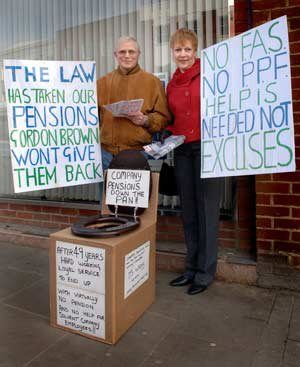 Bill and Sue Warman (members of the pension scheme for the solvent company Croydex) went to Andover Town Centre on Saturday 18th February 2006 to hand out copies of the Big Issue and demonstrate about the lack of help from the government for solvent companies employees. They were accompanied by reporter Jenny Cuffe from the BBC Radio 4 who interviewed passers-by along with Bill & Sue. Her report on Occupational Pension Wind-ups will be on Radio 4 in March. The local press also took photographs and covered the protest Bill and Sue Warman (members of the pension scheme for the solvent company Croydex) went to Andover Town Centre on Saturday 18th February 2006 to hand out copies of the Big Issue and demonstrate about the lack of help from the government for solvent companies employees. They were accompanied by reporter Jenny Cuffe from the BBC Radio 4 who interviewed passers-by along with Bill & Sue. Her report on Occupational Pension Wind-ups will be on Radio 4 in March. The local press also took photographs and covered the protest
Bill and Sue held two big placards; one read “NO FAS, NO PPF for solvent company employees HELP IS NEEDED NOT EXCUSES" the other one read "THE LAW HAS TAKEN OUR PENSION Gordon Brown won't give them back” (a slogan nicked from the Big Issue) They also had a mock up toilet complete with mahogany seat; across the lid there was "Company pensions DOWN THE PAN FOR SOLVENT COMPANY EMPLOYEES" and across the front it read "After 49 Years LOYAL HARD WORKING SERVICE TO END UP WITH NOTHING".
There was a good response from people, many of whom also had final salary pensions and were horrified that it could happen to them. The age group we targeted were very interested and all wanted leaflets and asked lots of questions. It was well worth the effort despite freezing to death on what was the coldest day of the year! "
* * * * * * * * * * * * * * * *
Media Coverage
There has been a lot of press coverage over the past few weeks, with supportive articles in the Times, Telegraph, Independent, Guardian, Daily Mail, Mail on Sunday and even the Sun. These have all focused on “Whitehall Sources” saying that that the Parliamentary Ombudsman’s report, expected at the end of March, has found in our favour. There has been speculation that the bill could be of the order of £5bn. The news is tempered, however, by the fact that some of the articles say that the Treasury (Gordon Brown again) is determined to fight the report all the way, so even if the “Whitehall Sources” are correct the battle is far from over. A typical newspaper report can be found on our media comments page.
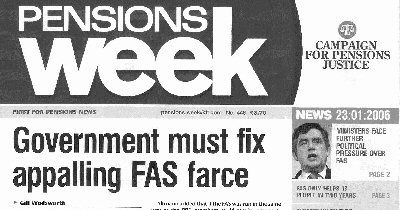
We have also had considerable support from the professional pensions magazines. Pensions Week are started a “Campaign for Pensions Justice “ with the last two issues each carrying four pages of articles on our plight. One issue devoted the whole of the front page to the FAS Headlines have been “Government must fix appalling FAS farce”, and “Government continues to hide behind FAS as thousands remain without compensation”.
Other supportive articles have appeared in Professional Pensions and Pensions Management. A typical article can again be found on the media comments page.
Other media coverage included an excellent programme by Liam Halligan on Channel 4 on 27th January which strikingly compared our position with people employed by the government and local authorities. Jenny Cuffe, a reporter from BBC Radio 4, has also been following our events and interviewing people for a programme on occupational pensions which will be broadcast sometime in March.
Thanks to all the editors and reporters who are fighting our cause.
* * * * * * * * * * * * * * * * *
European Commission Report
The European Commission have published a report saying that the well known Article 8 has not been implemented by the British Government, and this report will be submitted as evidence in the case being brought to the European Court by Amicus and Community trades union. A press release from these unions can be found on our documents archive. It is worth reading section 3 (Article 8) and section 4 (the government’s case) in the editors notes at the end of the press release. The report even says that the PPF is inadequate.
The report has again had widespread media coverage, but it is important to note that only the European Court of Justice can make a binding decision. The case is scheduled for Spring 2007. As observed above the government seem determined to fight it all the way and will apparently not support an application for an earlier hearing
* * * * * * * * * * * * * * * * *
March & Demonstration at the Labour Party Spring Conference Blackpool
Saturday 11th February 2006
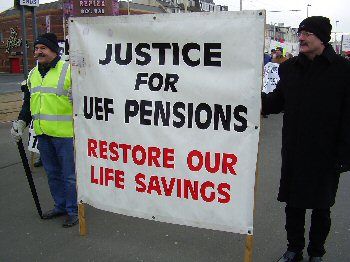 About 250 people from all over the United Kingdom met at Blackpool to protest outside the Labour Party Spring conference. The event was organised by Willie Riggans, (UEF), with coaches converging from Glasgow and Birmingham. The photograph shows Ronnie Mackowski (left) and Peter McQuade from UEF About 250 people from all over the United Kingdom met at Blackpool to protest outside the Labour Party Spring conference. The event was organised by Willie Riggans, (UEF), with coaches converging from Glasgow and Birmingham. The photograph shows Ronnie Mackowski (left) and Peter McQuade from UEF
 The march started at Central Pier, Blackpool and proceeded down the promenade past the Winter Gardens where the conference was being held. The march went on to Talbot Square where it did a U turn (difficult with 250 people) then proceeded back to conclude at the Winter Gardens where the participants were able to voice their disgust at the way that the Government had treated “working class” people whose only fault was to take the Governments advice and recommendation to join a Company Pension Scheme. That we were informed was “safe and guaranteed” and protected by law, As usual marchers were making themselves heard by utilising whistles and loud hailers. The march started at Central Pier, Blackpool and proceeded down the promenade past the Winter Gardens where the conference was being held. The march went on to Talbot Square where it did a U turn (difficult with 250 people) then proceeded back to conclude at the Winter Gardens where the participants were able to voice their disgust at the way that the Government had treated “working class” people whose only fault was to take the Governments advice and recommendation to join a Company Pension Scheme. That we were informed was “safe and guaranteed” and protected by law, As usual marchers were making themselves heard by utilising whistles and loud hailers.
Report based on notes and photographs from Richard Nicholls and Mike Hazlewood.
UEF are planning further protests at:
Scottish Labour Party conference Aviemore Saturday 25th February
Scottish Trade Union Conference Perth 10th to 12th March
NAPF Conference Edinburgh 15th March
Contact Willie Riggans on 07793-968227 for further details of these events.
Finally we should note that Willie Riggans will have reached the magic age of 65 and will be retiring on 6th March, albeit on a greatly reduced pension. He will though, still be campaigning and will now have more time. Watch this space.
* * * * * * * * * * * * * * * * * * * * * * * * * * * * *
Meeting with John Hutton Monday 30th January 2006
John & Sally Hayter (ASW) organized a meeting with Secretary of State John Hutton. A report of this rather spirited meeting will be posted shortly, but it is worth noting that during the meeting John Hutton admitted we’ve been "robbed" and said that in our position, he too "would be protesting at a huge injustice".
Liam Halligan, financial correspondent for Channel 4 News and financial columnist for the Telegraph heard about this remarkable statement and was so intrigued that he directly approached the minister for confirmation. When asked if he used the word "robbed", Hutton’s answer was remarkably honest.
"Yes," he said, and added: "The scheme is a first attempt to try to correct this problem. It is not the last word. We will look at this again." In an article in the Telegraph Liam Halligan commented, “I hope the Treasury is listening. Mr Brown, you have been warned.”
* * * * * * * * * * * * * * * * *
Dexion Meeting with Secretary of State for Works & Pensions John Hutton at Richmond House, Whitehall, Tuesday 6th November 2005
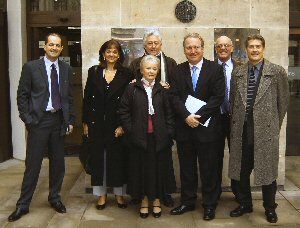 The meeting was organised through Mike Penning, MP for Hemel Hempstead which was the main site for Dexion. People attending were, from the left, Tony Humphrey, Dr Ros Altmann, Marlene Cheshire, John Hayter (ASW Sheerness), Mike Penning MP, Peter Humphrey & Brian Selwood. Report by Peter Humphrey The meeting was organised through Mike Penning, MP for Hemel Hempstead which was the main site for Dexion. People attending were, from the left, Tony Humphrey, Dr Ros Altmann, Marlene Cheshire, John Hayter (ASW Sheerness), Mike Penning MP, Peter Humphrey & Brian Selwood. Report by Peter Humphrey
Mike Penning opened the meeting thanking the Minister for his time and introducing the group, mainly his constituents who had worked for Dexion in Hemel Hempstead.
Peter started by saying that with respect to the Minister, this was the fourth time we have come to put over our case of being robbed of our pensions. Explained how he had worked in the same company for nearly forty years and paying into the company scheme, only to find out he has not yet received any pension, that he should have had 2 years ago, and will now have to wait until he is 65. Peter also asked that he was keen to see that this injustice sorted as soon as possible.
John Hayter added that the group had been lied to, robbed and finally betrayed by this Government. Mr Hutton felt that these comment were a bit strong but John explained in more detail:
Lied to...because we had been told our pensions were safe.
Robbed... because our pensions had been taken to pay others.
Betrayed... as his Government had failed to resolve this injustice.
The Minister agreed that it was an injustice that people could pay into schemes all their working lives and have nothing to show at the end. John also went into detail about how the MFR has been lowered twice and that his own scheme had been 104% funded to MFR. To the man on the street 100% meant whole, what it actually means is 20%. John also added apart from all that was going on own his wife Sally, although suffering deteriorating health, was counselling people phoning her contemplating suicide. Why was Sally having to deal with this when the situation was not of her making?
Dr Ros Altmann explained the background to this situation and why this is a huge injustice, for which the Government is responsible. She outlined how members had all believed and trusted Government assurances that their pensions were safe and protected by law. They had been mislead and, although this surely was not deliberate. If Government is responsible for accidents then it must compensate those affected properly. The FAS is not a suitable vehicle, Mr Hutton asked what it might cost to rectify the situation and Ros said it would probably be in the region of around £100million a year and although that sounds a lot of money, in Government terms it wasn't.
The Secretary of State said he understood and sympathised that the situation faced by members was disgraceful, but he added that his current budget didn't allow any more money to increase FAS payments. He again expressed sympathy and a willingness to consider allocation of extra funds at the next spending review in 2007. He also added that his department would need to see the recommendations and outcome of the Parliamentary Ombudsmen's inquiry.
Brian Selwood added that whilst we are here to represent actual scheme members, we should not forget about those that have helped and supported those members over the years, namely the spouses. Without them to support us our careers and success would have been much more difficult to achieve. Therefore we must have all our rights restored, especially the rights of spouses under our original schemes.
Widow Marlene Cheshire again explained her ordeal and the fact that she has yet to receive any financial help from FAS, despite promises from Malcolm Wicks way back in August, and promises from the DWP that she would receive payment before the end of the year.
Mr Hutton summarised the meeting, saying he had taken on board our individual comments, that it was an injustice, and that we had put our views strongly. He would be looking into the financial set up within the FAS, but like previous Minister did not want to raise our hopes and make promise
* * * * * * * * * * * *
Dexion Meeting with Members of the Conservative Party Wednesday 7th December 2005
Dave Allen, Roger Day, Jenny Allen, Vic Brash, Terry Griffin, Marlene Cheshire, and Mo Kham met Nigel Waterson MP, Conservative spokesman for Pensions along with local Hemel Hempstead MPs Mike Penning and David Gauke. Report by Dave Allen
The overall impression of the meeting was that The Conservative Party remain supportive of the principles and aims of the Dexion group.
Mike Penning M.P. for Hemel Hempstead, reported on the meeting the previous day with John Hutton MP the new Secretary of State for Works and Pensions.
The Financial Assistance Scheme
It was stated that the original amount of finance £400m over 20 years was inadequate. This was highlighted at the time Malcolm Wicks launched the scheme in May 2004 by the opposition front bench, and they continue to attempt to get this amount increased. Nigel Waterson M.P. stated that if they were in control they would have amalgamated the PPF and FAS administration. Their role is similar and would preserve more of the original funding for claimants.
Regarding EDM 980 it was strongly denied by all MPs present that it undersold the aims of claimants. It was stated that EDM’s were not an effective tool in achieving results, anyway.
There was concern from the M.P’s of the exclusions from the scheme. This was reinforced by the fact that of 1005 deferred Dexion pensioners, only 147 were eligible for FAS.The point was made that Dexion was a company where most employees stayed for most of their working life. For example, the people in the room represented over 200 years service with the company, and as yet no sign of any compensation, or even how much to expect was evident from FAS. The M.P’s stated that they had been informed that the trustees of the schemes were responsible for the delays in progress.
Compensation.
The Conservative Party policy remains not to use finances from taxes, They will continue to pursue Gordon Brown to use unclaimed bank and building society assets. Only a part of the estimated total amount would be required and the general public would find its allocation to this cause just as acceptable as the announcement for gap year funding for under privileged juveniles announced by the Chancellor last Monday. The affordability of The Liberal Democrat claim to 90% compensation (as PPF) from existing budgets is questionable and needs to be challenged.
Ombudsman’s Report.
Nigel Waterson expressed the view that claims of the report being deliberately delayed were in his opinion unfounded. The group was reminded that there was no obligation on the Government to implement the recommendations, but it would be unprecedented if they ignored them. The Conservative Party will do all that they can to ensure that any recommendations are acted upon. With moderate Labour back bench support this is achievable.
European Court Action.
Nigel Waterson explained that he had been unable to obtain a progress report. However he did state that the compensation claims involved in the action appeared to be very expensive.
Additional Voluntary Contributions
Dave Allen raised the question of reports from some members that were being informed that their AVCs were being held back to be used to buy back their SERPS. Have the DWP made any statements on this?
Conservative members were unaware of this allegation. Mike Penning M.P. will write to The Treasury for clarification.
Thanks were extended to all three M.P’s for their time and continued support.
* * * * * * * * * * * * * * * * * * * *
Announcement from Parliamentary Ombudsman
The Ombudsman, Ann Abraham, originally said in March 2005 that her report would be published in early July 2005. In July 2005 we were told that the report had been delayed because of additional information which they had only just received. The report was then scheduled to appear after Parliament re-convened in October. On Thursday 17th November a letter was received by complainants saying the report would not now appear until late March 2006. A copy of this letter can be found on our documents page, along with a response from Dr Ros Altmann
Needless to say this news is devastating, and the media view it with distinct suspicion. A typical example is the article from Patience Wheatcroft in the Times which can be found on our media comments page
* * * * * * * * * * * * * * * * * * *
EDM 980
EDM stands for Early Day Motion and is a form of internal House of Commons petition for MPs. Although EDMs have no chance of being debated, and many are really trivial (e.g. congratulating the local football team) they can be a powerful tool if they can achieve around 300 signatures (i.e. about half the House) The Lib Dems, via Danny Alexander MP, has tabled EDM 980. Whilst this only calls for the FAS to be extended to everyone and does not demand complete restoration, it is a step in the right direction. The rather tortuous wording arises from the fact that and EDM must be a single sentence. Please ask your MP to sign this EDM
EDM 980 FINANCIAL ASSISTANCE SCHEME
That this House notes with concern the anomalies and injustice caused by the operation of the Financial Assistance Scheme, and in particular that the sharp cut-off date has left many people who miss that date by just a few days without any compensating retirement income whatsoever, and that some people aged 58 years at the time their company scheme collapsed qualify for support while others aged 62 years do not; and calls upon the Government to consider urgently adapting the scheme to address these anomalies and to ensure that the scheme provides at least some assistance to those least able to replace their lost pension entitlements.
You can follow the progress of this EDM on the House of Commons website
* * * * * * * * * * * * * * * * * *
Which Magazine
John Hayter, Pete Humphrey and Andrew Parr met with a reporter from Which magazine who was writing a series of articles on pensions for Money Which and found details of us from our web-site. She did interviews with us and more detailed interviews with John Benson and Jean Wade. The article has just been published and also appears on their website here (dead link - 2019). As can be seen, Which clearly support our case
* * * * * * * * * * * *
Protest March 30th October 2005
Of ghoulies & ghosties & long legged beasties & things that go bump in the night
This was the first march we have organised in the “designated area” under sections 132-138 of the Serious Crime & Police Act 2005. This act was primarily written to deal not with terrorists, but the protestors who have camped for more than a year in Parliament Square protesting about Iraq. It is, perhaps, worth noting that the Act has failed to do this because it cannot be applied retrospectively, but it imposes a large amount of beaurocracy on organisers of events in Westminster. The organisation took several weeks and involved a meeting with the Metropolitan Police, numerous phone calls and e-mail exchanges with the House of Commons Estate Office, Westminster Council and the Royal Parks plus talks with Number 10 security and Charing Cross police about delivering a letter in person to Number 10 Downing Street. The system does not make life easy, but we eventually did get permission to hold the march with whistles and horns, but not loud-speakers, which scuppered the plans for speakers at the end of the march.
The date was chosen in the hope that the march would coincide with the publication of the Parliamentary Ombudsman’s report scheduled initially for July, then delayed to the re-assembly of Parliament at the start of October. It was intended to hand a letter in to Number 10 in response to this, and several letters were prepared ready for different outcomes. Rather surprisingly the report has not been published, so the letter was written around the theme of “Why are we waiting”. A copy of the letter can be found on the documents page.
 Mark Robinson (T&N) pointed out that the date was very close to Halloween so it was decided to use this as the theme of the march with slogans such as “Stripped to the Bone”, “Pensions will Haunt You” and “Our Pensions have been Spirited Away”. The costumes of the protestors amplified this theme, and the march, from Whitehall Place, down Whitehall, past Parliament to St John’s Smith Square was suitably spooky. Mark Robinson (T&N) pointed out that the date was very close to Halloween so it was decided to use this as the theme of the march with slogans such as “Stripped to the Bone”, “Pensions will Haunt You” and “Our Pensions have been Spirited Away”. The costumes of the protestors amplified this theme, and the march, from Whitehall Place, down Whitehall, past Parliament to St John’s Smith Square was suitably spooky.
 Only six people were allowed to deliver the letter to Number 10, and we had to submit names several weeks in advance for security checks. For reasons explained shortly only four people actually delivered the letter. The picture shows, from left to right, Andrew Parr, (ASW), Pat Sargent (Dexion), Richard Nicholls (Burgess) and Paul Gill (BUSM). It was all rather unimpressive, after security checks, (photo id needed and a body scan and a search), we marched up to the door, knocked, it opened a fraction and a hand came out, we handed over the letter and the door closed. Thanks to our police liaison officer, Constable Kevin England, who took the photograph. Only six people were allowed to deliver the letter to Number 10, and we had to submit names several weeks in advance for security checks. For reasons explained shortly only four people actually delivered the letter. The picture shows, from left to right, Andrew Parr, (ASW), Pat Sargent (Dexion), Richard Nicholls (Burgess) and Paul Gill (BUSM). It was all rather unimpressive, after security checks, (photo id needed and a body scan and a search), we marched up to the door, knocked, it opened a fraction and a hand came out, we handed over the letter and the door closed. Thanks to our police liaison officer, Constable Kevin England, who took the photograph.
Dr Ros Altmann and Peter Humphrey were originally nominated to be members of the party delivering the letter, but Ros was asked to speak on the BBC Politics Show and it was felt that it was better for her to speak on national television than take part in a media photo shoot. As it happened this was the correct decision. The BBC did an excellent job reporting on our march with a pre-filmed slot on Peter & Jacquie Humphrey (Dexion). Ros debated forcefully with two indifferent spokespersons from the NAPF and the Institute of Directors.
 Peter Humphrey was originally nominated as a member of the Number 10 letter party, but he had chosen a superb costume as a skeleton (shown here with his wife Jacquie). Security at Downing Street refused point blank to let anyone in who was wearing a costume. Andrew, Pat, Richard and Paul easily divested them of their apparel, but, because the skeleton outfit was very hot, Pete was only wearing underpants underneath. Possibly expecting a repeat of our “Stripped of our pensions” trademark, Downing Street security refused to let him in, either with, or without, the skeleton outfit. The rest of the march had to wait whilst the letter was delivered, and a quick head count showed there were about 250 people present, including Alan & Jennie Marnes’ grandson dressed as a devil (whenever he could be persuaded to wear the hat). Peter Humphrey was originally nominated as a member of the Number 10 letter party, but he had chosen a superb costume as a skeleton (shown here with his wife Jacquie). Security at Downing Street refused point blank to let anyone in who was wearing a costume. Andrew, Pat, Richard and Paul easily divested them of their apparel, but, because the skeleton outfit was very hot, Pete was only wearing underpants underneath. Possibly expecting a repeat of our “Stripped of our pensions” trademark, Downing Street security refused to let him in, either with, or without, the skeleton outfit. The rest of the march had to wait whilst the letter was delivered, and a quick head count showed there were about 250 people present, including Alan & Jennie Marnes’ grandson dressed as a devil (whenever he could be persuaded to wear the hat).
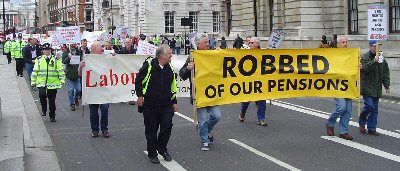 The march then proceeded down Whitehall, past Parliament to Millbank then into to St John’s Smith Square where we dispersed. The ban on loud-hailers meant that once the police had left it sort of fizzled out and after some general socialisation people dispersed. It was at this point that we discovered that pubs in the Westminster area (particularly the Marquis of Granby we have used before), do not open on Sundays, and it took some searching to find a place for post march relaxation and refreshment. The march then proceeded down Whitehall, past Parliament to Millbank then into to St John’s Smith Square where we dispersed. The ban on loud-hailers meant that once the police had left it sort of fizzled out and after some general socialisation people dispersed. It was at this point that we discovered that pubs in the Westminster area (particularly the Marquis of Granby we have used before), do not open on Sundays, and it took some searching to find a place for post march relaxation and refreshment.
As already mentioned, Ros and Peter were interviewed at length for the BBC Politics Show. In addition Andrew Parr did an interview for London Tonight and Ros & John Benson did a live studio interview for BBC Wales. Many media photographers and reporters also attended the march
Thanks to Andrew Parr & Alan Marnes who did the negotiations with the police and numerous public bodies, Peter Wheeler and Brian Mealing for the placards and publicity material (made at the last minute because we did not know if the PO report would come out on the Friday), Matt Wheeler for the photographs and, of course, everyone who came along from all over the United Kingdom
As ever the police deserve our thanks for their courtesy and good humour. The new legislation puts an added burden on them, and we must praise their slick organisation on the day. Particular thanks are due to Inspector Price (who was the lead officer) and Constable Kevin England (who was the Metroplitan Police liaison officer). If our case is not recognised in the near future they will no doubt see us again. . . . . .
* * * * * * * * * * * * *
Protest March Brighton Monday 26th September 2005
Based on reports from (in no particular order) Robin & Val Hatfield, Alan Marnes, Peter Wheeler, Jacquie & Pete Humphrey, Sally & John Hayter, Peter Wheeler, Paul Gill, Richard Nicholl and Pat Sargent
Photographs courtesy of professional photographer Jason Harris and Money Which who are running a story on our plight in the near future.
The protest was based on our almost trademark theme “Stripped of our Pensions” and to remind Gordon Brown of his statement at the 2004 conference when, whilst talking about pensions wind ups, he said it was “Simply wrong” that people should lose the pensions they have saved for over the years.
Alan Marnes arranged a classic open topped bus for the day (a 1962 Leyland Titan in the livery for the then local Southdown bus company) and did all the work liaising with the police and council for timings, route, schedule etc.
 Peter Wheeler & Brian Mealings, as ever, did superb banners, posters and fliers and, assisted by Alan Marnes, Pat & Keith Sargent, Val & Robin Hatfield and Richard Nicholls, spent the morning decorating the bus. The route number was set to “65” and the destination board, rather aptly, to “Poverty Street”. Peter Wheeler & Brian Mealings, as ever, did superb banners, posters and fliers and, assisted by Alan Marnes, Pat & Keith Sargent, Val & Robin Hatfield and Richard Nicholls, spent the morning decorating the bus. The route number was set to “65” and the destination board, rather aptly, to “Poverty Street”.
Banners on the side proclaimed:
DESTROYED PENSIONS: “SIMPLY WRONG” – GORDON BROWN, 2004 and
STILL STRIPPED OF OUR PENSIONS, 2005
The bus was being decorated by the side of the road out of town, and a drunk got on board, sat down and asked did the bus go to the centre. It took some persuasion to convince him it was not a service bus!

There were actually two strips on the beach. Our protest was scheduled to start at 2pm, but the BBC wanted shots for the lunchtime news so the first strip took place at very short notice. There were ten brave individuals:
John Hayter; John Benson Alan Marnes, Peter Humphrey, Tony Brown, Roger Day, Phil Healy, Brian Mealing, Keith Sargent and Gordon Dodds.
Despite the chilly wind these gentlemen marched off across the pebbly beach for the BBC film crew.
 The group then re-convened by the pier and formed up with about 30 people on the bus leading about 200 people marching behind. Dr Ros Altmann, who had been speaking at a fringe meeting alongside pensions minister Stephen Timms, joined the march. The group, escorted by the police, then proceeded down the promenade to the Brighton Conference Centre The group then re-convened by the pier and formed up with about 30 people on the bus leading about 200 people marching behind. Dr Ros Altmann, who had been speaking at a fringe meeting alongside pensions minister Stephen Timms, joined the march. The group, escorted by the police, then proceeded down the promenade to the Brighton Conference Centre
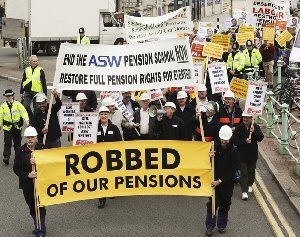 The march was noisy but good humoured with whistles, horns, drums, megaphones etc. The, by now famous, chant of “What do we want: Our Pension, When do we want it: Now, What do we want: All of it” accompanied the march. Leaflets were handed out along the way to people on the pavements. Passing drivers tooted their horns in support The march was noisy but good humoured with whistles, horns, drums, megaphones etc. The, by now famous, chant of “What do we want: Our Pension, When do we want it: Now, What do we want: All of it” accompanied the march. Leaflets were handed out along the way to people on the pavements. Passing drivers tooted their horns in support
Arriving at the conference centre the chants changed to invite the three Bs (Blair, Brown & Blunkett) to come on down and talk to us. Needless to say they did not appear.
The brave strippers then had to do a repeat performance at the scheduled time for the rest of the media. The bus was the obvious place to change, but whilst the strippers were on the beach performing for the media the police ordered the bus to move off, complete with everyone’s clothes! With the photo-shoot over the strippers were getting rather cold and Brian Mealings started a new chant of “What do we want: Our trousers, When do we want them: NOW!” Fortunately the police relented and allowed the bus to come back before anybody suffered from hypothermia.
Several MPs came from the conference to talk with the group, including Jim Dobbin and the previous Pensions Minister Malcolm Wicks.
The demonstration then dispersed and about forty people boarded the bus to publicise our plight with many noisy circuits of the town
There was a lot of media interest in the event, BBC lunchtime news had their own private strip. Dr Ros Altmann was interviewed for BBC news, Radio 5 Live and Today. Peter & Jacquie Humphrey, Tony Brown and others were interviewed for Radio 5 Live, BBC 3 Counties, Daily Mail, Daily Telegraph, BBC On-Line, Spanish State TV, Pensions Management, Professional Pensions and Pensions World where reporter Mic Wright gave us superb full page coverage as the lead article in their November issue. BBC Radio Kent followed Sally & John Hayter for the day, starting and finishing at their home. We even made the daily news letter on the QE2 as it was cruising in the Mediterranean!
A very successful day. Thanks to all of those involved in the organisation and those who travelled from all over the United Kingdom to support us. Thanks also to the Southdown Historic Vehicles Group for the use of their bus and finally thanks, as ever, to the police from many forces who worked with us in their usual efficient and good natured way.
* * * * * * * * *
Protest March Brighton Wednesday 28th September 2005
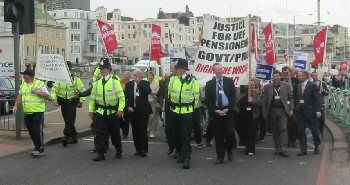 A second protest, organised by Willie Riggans of UEF, was held on the Wednesday in conjunction with Amicus and T&G unions. Before the march started BBC2 did live interviews with several people for their lunchtime conference report. As before a crowd of about 200 people congregated at Brighton Pier and, escorted by the police, marched to the conference centre where there were the usual shouts, megaphones, whistles etc. A second protest, organised by Willie Riggans of UEF, was held on the Wednesday in conjunction with Amicus and T&G unions. Before the march started BBC2 did live interviews with several people for their lunchtime conference report. As before a crowd of about 200 people congregated at Brighton Pier and, escorted by the police, marched to the conference centre where there were the usual shouts, megaphones, whistles etc.
The protest dispersed after about 20 minutes and people went to a fringe meeting at a local hotel. Speakers included Willie Riggans, Derek Simpson, Brian Gallagher, Graham Goddard and Kevin Brennan MP. The speakers emphasised that the unions were well aware of the failings of the FAS, were working on restoration of full pension entitlements and, in any case, expected a successful outcome from the Article 8 European Court action.
* * * * * * * * * * * * * * * * * * * *
David Blunkett Meeting 7th September 2005.
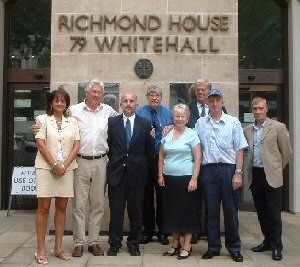 A group of PAG members shown in the photograph met with David Blunkett at the DWP Headquarters Richmond House Whitehall. A professional journalist, Chris Panteli from Professional Pensions also attended The group members who attended were, from left to right: A group of PAG members shown in the photograph met with David Blunkett at the DWP Headquarters Richmond House Whitehall. A professional journalist, Chris Panteli from Professional Pensions also attended The group members who attended were, from left to right:
Dr. Ros Altmann, John Hayter (ASW Sheerness), Barry Tilson (Perivan),
Alan Marnes (Samuel Jones), Marlene Cheshire (widow, husband ex Dexion),
Richard Nicholl (representing solvent companies), John Benson (ASW Cardiff)
and Tony Brown (Dexion Hemel Hempsted)
Full minutes of the meeting can be found on the Documents page
* * * * * * * * * * * * * * * *
New DWP Website for National Pensions Debate
The public have been urged to log on and have their say in the National Pensions Debate as Minister for Pensions Reform, Stephen Timms, launched the department's new website pages that are devoted to the debate.
The website, click here, contains an inter-active section where people can send the department their views on the key issues surrounding the debate.
Pensions minister Stephen Timms said: "The future of pensions will affect us all in some way and the new website will allow everyone to make their voice heard in the National Debate. Ministers have already started taking the debate out to the country and more events are planned throughout the course of the year but the website will help us reach those people who may not be able to attend those specific events. David Blunkett has spoken of our desire to reach a consensus on the way forward, but also of ensuring as many people as possible understand the issues involved and the implications of any future solution. This website is an invaluable tool in achieving this."
Users will be able to register on the website for further information on the National Pensions Debate as well as gain access to parts of the DWP and Pensions Service websites that provide information on pension provision for people of all ages and access to the Pensions Commission report on their site.
* * * * * * * * * * * * * * * *
Financial Assistance Scheme opens for business
The Financial Assistance Scheme Operational Unit in York opened for business on 1st September 2005
Guidance and information for pensions professionals and scheme members can be found on the FAS website
A press release from the DWP can be found on the Documents page along with comments and advice from Dr Ros Altmann
* * * * * * * * * * * * *
Shiphams (Hull) Protest at Presentation of Queen's Award to Industry Friday 8th July 2005
Shiphams are a solvent company who closed their final salary pension scheme at considerable loss to its current and former employees. Report by David Skinner
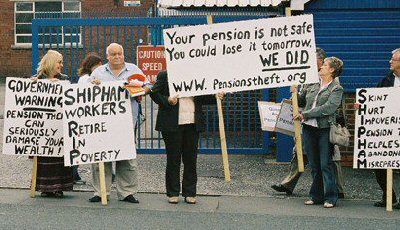 Despite abuse from the company director and the presence of five huge bouncers employed by the company with the purpose of intimidating us, a peaceful protest was held by former employees of Shiphams & Co., Hull. The photograph shows Linda Muir (wife of a Shipham pensioner), David Skinner (with Dianne Skinner behind the board), Lorna Litherland and John Litherland. Despite abuse from the company director and the presence of five huge bouncers employed by the company with the purpose of intimidating us, a peaceful protest was held by former employees of Shiphams & Co., Hull. The photograph shows Linda Muir (wife of a Shipham pensioner), David Skinner (with Dianne Skinner behind the board), Lorna Litherland and John Litherland.
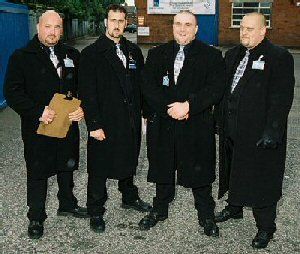 The protest was so peaceful that the group managed to persuade the “Men In Black” bouncers to pose for a photograph. The protest was so peaceful that the group managed to persuade the “Men In Black” bouncers to pose for a photograph.
The Company's Queen Award celebrations were attended by the Lord Mayor of Hull, and the lord lieutenant attended, his car being shielded by the bouncers and the Mayor's Chauffeur.
The protest was attended by several people and gained excellent coverage by the BBC Look North and Radio Humberside throughout the day and a full page article in the local newspaper was very sympathetic to our cause.
The Police patrolled regularly at our request and were very helpful
* * * * * * * * * * * * * * * * * * * * * *
Prime Minister to receive ASW letter from Party Leaders
Leaders of the three opposition parties at the Welsh National Assembly have signed a joint letter (see below) to the Prime Minister, Tony Blair, urging him to take action to settle the pension entitlements of the former workers of Allied Steel and Wire.
Local Plaid Cymru Assembly Member (AM) Owen John Thomas co-ordinated the cross-party message to Tony Blair on behalf of the former ASW workers. He received the signatures and support of Plaid Cymru's Ieuan Wyn Jones, Nick Bourne, leader of the Conservatives and leader of the Liberal Democrats, Mike German. Former ASW worker John Benson said, "I had hoped for the signatures of all the party leaders to show the strength of feeling at the National Assembly. Unfortunately, the First Minister, Rhodri Morgan refused to sign the letter which was presented to him by Owen John Thomas. I'm very disappointed that he wasn't prepared to put his name to this letter and show his support for the former workers of ASW and their families."
Commenting Owen John Thomas said, "The lengthy and expensive wind-up process began three years ago and as things stand the settlement of pension entitlements may not be concluded until late in 2006. The letter calls on the Prime Minister to take two simple steps which could bring this matter to a swift and just conclusion.
Firstly, he could support the fast-tracking of a court hearing that may lead to the release of the full pension entitlements of the former ASW workers. The hearing before the European Court of Justice relates to the European Insolvency Directive and steel union Community and engineering union Amicus have so far failed to gain Government support to fast-track the case.
Secondly, Mr Blair could allocate extra resources to the understaffed National Insurance Services for the Pension Industry (NISPI) to speed-up the process of calculating the pension entitlements of former ASW staff. He could then allocate adequate government funding to meet those pension entitlements in full. At the moment, several professional bodies involved in the long wind-up process continue to swallow up the funds of the ASW Pension Trust."
Concluding Mr Thomas said, "I hope that this letter will convey a strong message to Mr Blair so that he will see fit to bring to an end the years of uncertainty faced by the steel men and their families."
Dear Mr Blair
Meeting the Pension Entitlements of the Former ASW Pension Trust.
The lengthy and expensive wind-up process of the above Trust commenced on 26 July 2002 and, based on a projected plan given by the National Insurance Services for the Pension Industry (NISPI), it is hoped to end sometime in 2006.
A considerable portion of the pension funds are used up by the professional bodies involved in the wind-up process but the length and cost of their services is to a great extent determined by the volume of other pension schemes facing the understaffed NISPI.
Furthermore, the UK Government has blocked the bid by the steel union, Community, and the engineering union, Amicus, to fast-track a hearing before the European Court of Justice. The steel workers' case can only be prioritised with the support of the Government but this has been refused. Although the Government are the defendants in this case, it is felt that they also have a duty to see that the steel workers' pension rights are dealt with as quickly as possible to avoid further anxiety and financial difficulties.
We call upon you to take the necessary steps to expedite both the wind-up process and the hearing before the European Court in order to bring the matter of the pension entitlements of the former members of the ASW Pension Trust to a swift and just conclusion.
Yours sincerely
Ieuan Wyn Jones, Nick Bourne, Mike German.
* * * * * * * * * * * * * * * * * * *
Parliamentary Ombudsman Report July 13th 2005
The PO had originally stated that her report would be published in early July. We now gather that a preliminary report has been given to the government and they have asked for further evidence to be considered.
The PO can only report whilst Parliament is sitting, and as the House adjourns for the Summer recess in a few days, the report will not be available until the House assembles again in October
* * * * * * * * * * * * * * * * * *
David Cheshire 1942 -2005
IT IS WITH MUCH SADNESS THAT WE HAVE TO ANNOUNCE THAT DAVE PASSED AWAY IN THE EARLY HOURS OF TUESDAY 5th JULY 2005 AT THE AGE OF 62
DAVE FOUGHT FOR BOTH JUSTICE AND HIS LIFE TO THE END.
MAY HE NOW REST IN PEACE
Dave had been employed by Dexion, Hemel Hempstead and, despite suffering with terminal cancer, was a staunch and active supporter of the group. He leaves a wife, Marlene, and a daughter Claire
* * * * * * * * * * * * * * * * * *
European Court of Justice Action (note added 26th June 2005)
The Article 8 of the Insolvency Directive action being taken by Community and Amicus on behalf of ASW members has now been referred to the European Court of Justice (ECJ) despite delaying tactics by the government’s legal team. However, the government has not agreed with an application to hear the case urgently. A press release from Community can be found on the Documents page.
* * * * * * * * * * * * * * *
Meeting with Pensions Minister Stephen Timms 15th June 2005
Stephen Timms has taken over from Malcolm Wicks as Minister for Pensions. Thanks to John & Sally Hayter for organising the meeting and Chris Panteli for taking these minutes. Note the bold paragraph where John Hayter backed Stephen Timms into a corner.
ST Stephen Timms JW Jean Wade
JH John Hayter ML Marlene Cheshire
RA Ros Altmann PH Peter Humphreys
JB John Benson BL Barry Tillson
MLB Mike LeBrun (FAS team) BD Barry Digwood
ST: We've been looking at the rules of the scheme we are introducing and the amount of funding is quite tightly constrained and I imagine one of the points you want to put to me is to ask for some changes in the direction of making the scheme more generous. That's going to be difficult to me to do much about other than listen to you today which I'm very anxious to do because the funding for the scheme has been set out in the chancellors statement last summer and we can't look at it again until the next spending review next summer.
But from my point of view it's important to understand the kind of aspirations that you and others like you have of the scheme.
The fact that we have a scheme at all I think is a very important step forward. But I recognise as well that some of the limits of the scheme may not be as high as you would like.
JH: We've been robbed of our pensions. It was our wages that we paid in weekly or monthly over 30-40 years. We were told by the government that they were safe, secure and guaranteed. We believed the government when they told us this.
We had to join scheme, had to opt out of SERPS and until 86 we couldn't pop down the road to get our own pension scheme. And why should we. We were told we doing the finest thing we could to secure our retirement.
That leads us down to ASW going into receivership and the scheme winding up, Nowhere in that time were we warned of the risks involved, and we are sadly disappointed with this particular government for not resolving the issue. We are fully aware that it is the 95 Pensions Act and the inadequacies of the MFR which has done this to us, but everyone makes mistakes, governments make mistakes, but failure to acknowledge and resolve that mistake we feel is absolutely disgraceful.
What the government has put in FAS scheme is a disgrace because it leads to even further injustices.
John (Benson) has been with ASW Cardiff for over 40 years and is outside the FAS window, I paid for 28 years and I'm inside.
I feel the government must compensate decent, hardworking people.
ST: I can see that you're all facing a very difficult position through no fault of your own.
RA: You say they are in difficulty through no fault of their own. The leap that needs to be taken is that the reason this has happened is the fault of the government, and that has not been acknowledged. It's not just this government but previous Conservative administrations.
That's why I honestly believe that when you see the full circumstances of what's happened to these people and the system in place and the reason they are in this position is the government. It lulled them into a false sense of security and robbed them of any chance to protect their retirement income.
Government promoted and encouraged people to join these schemes.
Mistakes have been made and it's the failure of this government to acknowledge that this was a mistake. No one has done this deliberately to these people but they are the innocent party. If a financial services company encouraged people to put money into something, told them it was safe and failed to warn them of any risk, you would have to pay up in full. There's no question of negotiating over offering some people 80% and others less. Full compensation is what would be required, and if the government behaves in the same way, why is it not the same rules?
ST: I'm not persuaded that it's right to say that what happened is the fault of the government but I understand your reasons for you thinking that.
JH: So whose fault is it?
ST: Clearly what's happened to each of these companies has had very damaging impacts not least on those of you here. I don't know the background of each of these companies and why they became insolvent.
JH: My company scheme was 100pc funded and to you and I 100pc means whole. The MFR was the yardstick by which members could check the health of their pension scheme. The reality is something completely different, and that's a disgrace.
The threshold for the MFR was set by who?
ST: That was the government.
JH: Who said we had to opt out of SERPS?
ST: The government
JH: So whose fault is it?
ST: I would like to find out more about what happened at your individual companies.
BT: We were part of the Perivan Group but just before it went insolvent the directors agreed to split our Southend branch away from the main group and inject £450,000 into the company to keep it going. We were told the pension scheme was OK and would continue running. The £450,000 injection was never made and two weeks later the firm collapsed. The directors moved to Perivan London and are doing very nicely but all I got was a months' wages after 39 years. As far as I'm concerned it was just a big scam.
JB: Why is the government so strongly against people getting what is rightfully theirs? Ministers in the Welsh Assembly think it is a disgrace that their own party members are not paying out the proper compensation, they are appalled by their attitude.
ST: Tell me about Dexion
PH: We were notified that there would be a shortfall of somewhere between £25m and £30m in the overall fund, which equates to a much-reduced pension in the region of a fifth of what we were expecting.
BD: The Lionheart scheme was run by a solvent company called Croydex. They were going into receivership, which would have cost the jobs of about 100 people. They appealed to the trustees to wind up the pension scheme to allow them to refund the company. Rules for solvent companies didn't exist then, so the trustees allowed that to happen in the interests of keeping jobs.
JH: Why do you think the government has not resolved this disgraceful position for us?
ST: I would hope you would feel able to welcome that the FAS has been set up.
I think it's clear from what you're saying that it isn't by any means meeting the whole of what you would like the government to do and I understand that. As you know we will be reviewing the scheme at the end of the first year period and we will have to see what the conclusion of that. In the mean time, I'm determined to do what we can first of all to make help available from the FAS as quickly as possible to those who do fall within the eligibility window, and particularly in your (Marlene Cheshire) case in particular, because I know that Malcolm Wicks was particularly struck by the position you are in with your husband.
MC: My husband retired last October and we haven't seen a penny. I can't work because I'm doing 24-hour care. He (Malcolm Wicks) did say I would receive a payment on David's death.
MLB: When ministers announced the draft regulations they did say they would look to make early payments to people who were terminally ill. We have yet to formally lay the regulations setting up the FAS but certainly we would expect to make arrangements for early payments in those months. In your husband's case he is within the FAS age range, so as soon as we are able to sort out the arrangements with the trustees...
MC: Do we get it backdated?
MLB: All FAS payments will be backdated to May 2004.
JW: What about me? How am I going to cope? My husband died 18 months ago, his scheme was 102pc fully funded but they don't give me a pension. I have to work 15 hours a week out of necessity, I can't socialise, I can't take my grandchildren for days out because I can't afford it. And what little savings I do have I've got to look after because I don't know where this is going to end - I don't know if I'll qualify for financial assistance or not.
ST: What we are working on at the moment is getting the regulations in place and I hope that will be done in the coming months before the summer break.
We are hoping very much that it will be possible to commence payments from the FAS before the end of the financial year and I will be pressing officials to make all this possible.
JH: Why do we need an act of parliament to go through before we get anything but you can find £6.5m just like that to pay for MG Rover's wages?
ST: With a scheme like this you can't do it without the proper regulations
The FAS is going to be a very valuable source of assistance for many but I entirely accept it won't meet the hopes of everybody. You may like to have a further discussion once the regulations are through.
JH: We would like to meet with Mr Blunkett and then Mr Brown because he is the stumbling block.
RA: What will it take for the government to understand that this is its responsibility? It is government's fault and there is no one else to blame.
There is enough money in the schemes to pay these people all of their pensions for the next seven to 10 years. This is not something t
ST: I entirely accept the point that there is no one else to blame but I think the step from there to 'the government must be to blame' is one I'm not ready to make.
JB: We won't go away until we get our pensions in full.
* * * * * * * * * * * * * * * * * * * * * * *
Financial Assistance Scheme Consultation Meeting 16th May 2005
The purpose of the meeting was for the FAS team to receive comments on the draft regulations from scheme members. Points raised at the meeting would be reported to Ministers as part of the wider response to the consultation
The following scheme members attended
Lin Brotherstone, John Hayter: ASW Sheerness
Dave Cross: WellmanGroup
Maurice Jones, Robert Malcolm Smith: Lister&Co
Tony Brown: Dexion
Dennis Gadsby: Coal Schemes
Barbara Kosarska: Parsons Group International
Brian Long: Gasgoine Mellotte
Alan Marnes: Samuel Jones
Terry Monk: Bradstock
Jacqueline Price: CCA Group
Willie Riggans: UEF
Five people from the DWP also attended including Chris Evans who chaired the meeting.
Comments by scheme members are summarised below (with, where applicable, responses by DWP officials).
Funding
£400 million was not enough to meet the needs of all those members affected. [DWP response: Ministers had agreed to review the operation and funding of FAS in the 2006 Government Spending Review].
Pensions which had been taken away from scheme members should be restored in full.
The Government had provided funds promptly in other cases, such as during the foot and mouth epidemic of 2001.
It was asked whether there had been any contributions from third parties to increase the funding for the FAS. [DWP response: not to date]
Unclaimed assets and/or the National Insurance Fund should be used to provide additional funding for the FAS.
Solvency
Schemes with solvent employers, which had wound up with a shortfall for members, should be eligible for FAS (specific examples of such schemes were cited).
This applied, in particular, where trustees had agreed to wind up the scheme in a compromise agreement in order to avoid job losses and a possibly even larger reduction of their expected pensions. Amended wording was suggested for FAS draft regulation 11(1) in order to allow such schemes into the FAS where the company had ceased trading, a compromise agreement had been made and the Secretary of State considered it reasonable to do so.
Qualifying members
Clarification was sought on which scheme members would be eligible for the FAS. [DWP response: assurances could not be given to individuals at this stage, but the proposed eligibility criteria were set out in the draft regulations].
Seriously ill Scheme Members
FAS should, like the PPF, be able to make payments to scheme members before the age of 65 with an actuarial reduction, in order to help those facing ill health. [DWP response: the Government was considering how to fast track payments for qualifying members who were terminally ill].
Core Pension Benefits
Clarification was sought on the meaning of ‘core pension benefits’ [DWP response: common rules would be needed as ‘pension’ could mean different things in different schemes. There would also be a common approach to revaluation].
Benefit Levels
The proposed cap of £12,000 was unfair, as for some people this could represent only 30 per cent of their expected pension. Comparisons were made with the levy-funded PPF which has a cap of £25,000. The FAS cap would discriminate against scheme members with long service.
The proposed cap was ‘means testing’ in another form. [DWP response: it was not proposed to means-test FAS in the sense of taking account of other sources of income unrelated to the pension scheme in question. The basic State Pension, for example, would not be taken into account for the purposes of calculating FAS entitlement].
Scheme members entitled to less than the proposed £520 de minimis level should be able to receive a lump sum for this.
Lump Sum
FAS should provide the option of lump sum payments on retirement, as some scheme members might have been counting on such a lump sum to pay off their mortgages. In addition, as survivors’ benefits would be paid at 50 per cent, single people should have the option to take a lump sum as they would have no one to leave their pension to.
Indexation
There should be indexation for FAS payments.
Backdating
It was asked whether the FAS payments would be backdated to scheme pension age. [DWP response: it was proposed to backdate payments to the age of 65 or to 14 May 2004, whichever was the later].
Timetable for payments
It was asked when the first payment would be made from the FAS. [DWP response: referred to Ministerial statements on the subject, in particular that it was planned to lay the regulations in the summer of 2005 with the intention that they should come into force as quickly as possible after that].
Nature of payments
Annuities were expensive – annuitisation should be stopped and the pension schemes run on as closed schemes with pooled funds. [DWP response: the Government had already stated that schemes affected should be wound up expeditiously, with FAS assistance paid monthly as a top-up to the annuities that members would receive from their schemes.]
Age limits and survivors’ benefits
It would be unfair to restrict payments to people within three years of pension age but still provide survivors’ benefits without age limit (so that a young surviving spouse might get FAS help but not a much older scheme member)
Other
Income from additional voluntary contributions (AVCs) should be disregarded for FAS purposes.
Clarification was sought on whether ”deemed buyback” (DBB) would replace FAS [DWP response: DBB was a mechanism whereby, in defined circumstances, people could opt to have their rights in the State Earnings Related Pension Scheme (SERPS) or State Second Pension restored. Not all potential beneficiaries of FAS would be able to benefit from DBB, and DBB would not replace FAS, but the Government was considering the relationship between the two provisions].
* * * * * * * * * * * * * * * * * * * * * * * *
New Points of Contact in the House of Commons
There have been several changes in the cabinet and shadow cabinets. The names now seem to be:
Cabinet and Minister for Pensions
Secretary of State for Work and Pensions: Rt Hon David Blunkett MP
Chancellor of the Exchequer: Rt Hon Gordon Brown MP
Minister of State (Pensions): Stephen Timms MP
Conservative Shadow Cabinet and Ministers
Shadow Secretary of State for Work and Pensions: Malcolm Rifkind MP
Shadow Chancellor of the Exchequer: George Osborne MP
Shadow Ministers: Tim Boswell MP, David Heathcoat-Amory MP, Nigel Waterson MP. Presumably Nigel Waterson retains responsibility for pensions although this is not stated on the party web-site.
LibDem Shadow Cabinet and Ministers
Shadow Secretary of State for Work and Pensions: David Laws MP
Shadow Chancellor of the Exchequer: Dr Vincent Cable MP
Shadow Minister for Work and Pensions: Paul Holmes MP
Spokespersons in the Lords: Lord Oakeshott, Lord Addington
* * * * * * * * * * * * * * * * * * * * * *
Protest March Saturday 7th May 2005
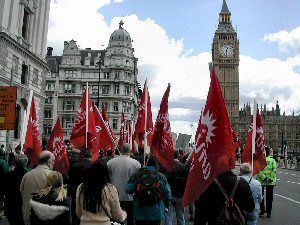 Over 1,000 people turned out for the protest march organized by Willie Riggans (ex UEF) in conjunction with Amicus, T&G, and GMB trade unions. The march started at Tothill Street (by Westminster Abbey) then proceeded down Whitehall finishing with speeches at Whitehall Place. Speakers included Lord Melvyn Bragg, Jack Dromey (Deputy General Secretary T&G), Graham Goddard (Regional Secretary Amicus), Rahana Azam (GMB), Brian Gallagher (Amicus) and Willie Riggans. Over 1,000 people turned out for the protest march organized by Willie Riggans (ex UEF) in conjunction with Amicus, T&G, and GMB trade unions. The march started at Tothill Street (by Westminster Abbey) then proceeded down Whitehall finishing with speeches at Whitehall Place. Speakers included Lord Melvyn Bragg, Jack Dromey (Deputy General Secretary T&G), Graham Goddard (Regional Secretary Amicus), Rahana Azam (GMB), Brian Gallagher (Amicus) and Willie Riggans.
Before the march a phone call had been received from David Blunkett asking to meet with representatives at Richmond House, the DWP offices in Whitehall. The meeting with David Blunkett was attended by Jack Dromey, Rahana Azam, Graham Goddard, Brian Gallagher and Willie Riggans.
The Minister opened the meeting by informing us it was a fact finding mission for him, pointing out that this was his first meeting on the subject on his first day in the job.
Jack Dromey began by taking him through the problems of not having in place over the years, a protection fund; the FAS £400m not being good enough - that £3.2bn was needed; and comparison with the farmers who had received £4.2bn from the Government, i.e. full compensation.
He said that we want the Government to make it compulsory for employers and employees to contribute to workers' pensions. He also went through pensions in general including the Old Age Pension.
Graham Goddard spoke about independent trustees and the cost and spoke about employers like Venture Capitalists, in the UEF case owned by The Prudential.
Brian Gallagher spoke about the campaign and the European Court action.
Willie Riggans told him about the shock of losing his life savings.
The Minister listened and was sympathetic and seemed to understood our requests. He asked to give him time to get more familiar with the pension problems and then we could meet him again with the Unions.
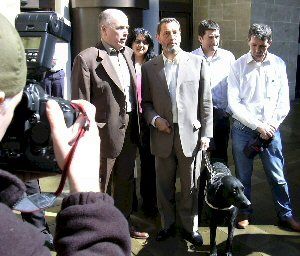 When outside, the Minister told the media he would be looking into the injustice that had befallen thousands of people who had lost their pensions. When outside, the Minister told the media he would be looking into the injustice that had befallen thousands of people who had lost their pensions.
All in all, it was felt by all of us that it was a very worthwhile first meeting and that the Unions can work with David Blunkett to hopefully, end this misery for all of us.
Thanks to Willie Riggans and Brian Gallagher for organizing a very successful day, and, as usual, to the Metropolitan police for their help. Thanks also to Malcolm Leaning (UEF Lincoln) for the photographs in this report.
* * * * * * * * * * * * * * * * * * * * * *
Pat Sargent & the General Election, Kirkcaldy May 2005
Pat Sargent (Dexion Gainsborough), bravely stood as an independent candidate in Gordon Brown’s constituency of Kirkcaldy and Cowdenbeath. The aim was to bring pensions to the attention of the media as Gordon Brown is regarded as the block on compensation being paid. Other people had come to the same conclusion; Liz Kwantes also stood as a candidate on behalf of the Equitable Life members and a chap called James Parker stood on the general issue of state pensions.
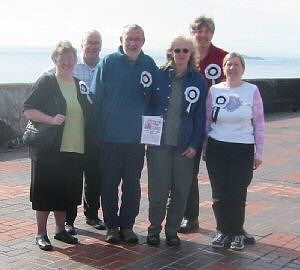 Pat and Keith drove their caravan up to Fife, and were joined by Alan & Jennie Marnes (Samuel Jones, Cambridgeshire) who also took their caravan and Andrew & Alison Parr (ASW Sheerness) who had flown up by EasyJet. The photograph shows Pat and Keith centre with Alison & Andrew to the left and Alan & Jennie to the right. Everyone is sporting the rosettes made by Alison which, by chance, were in the colours of the local football team! Pat and Keith drove their caravan up to Fife, and were joined by Alan & Jennie Marnes (Samuel Jones, Cambridgeshire) who also took their caravan and Andrew & Alison Parr (ASW Sheerness) who had flown up by EasyJet. The photograph shows Pat and Keith centre with Alison & Andrew to the left and Alan & Jennie to the right. Everyone is sporting the rosettes made by Alison which, by chance, were in the colours of the local football team!
Peter Wheeler and Brian Mealing had made 10,000 very professional flyers; a bit of a logistical problem as they had to be produced at very short notice and were delivered to a camp site in Dovedale Derbyshire where Pat & Keith were staying on their way North.
The campaigning was very interesting, being a mixture of delivering flyers to houses, talking to people in the street and asking local shops to take small piles of flyers (non refused, and everyone said what a scandal it was). We all came away feeling sorry for postmen, surely it is not beyond the whit of man to invent a letter box which blocks the weather but allows letters to be delivered without crumpling the mail or removing your fingers? And that is to say nothing of the dogs lurking behind many of the doors. Alan Marnes deserves a medal for delivering flyers to THREE 14 storey tower blocks!
Andrew & Alison had to return on Wednesday evening, but on election day the rest of team went round polling stations putting up A3 posters (all of which had to be taken down again when the polling stations closed).
The count started at 22:30 and Pat was pleased to see she was actually getting votes. After the count, all the candidates were called to the returning officers table, they had to wait for the arrival of Gordon Brown They all went up on the platform to hear the result read. Well you all know the result, our Pat got 44 to Gordon Brown’s 24,000, but the best was yet to come.
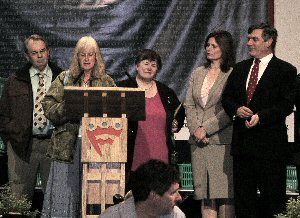 After Gordon’s speech all the other candidates had their chance, our Pat was on top form (although she said she was shaking in her boots), Pat read out what she stood for, and why she felt compelled to do this for the 80,000 of us affected by the theft of our pensions. In the photo, the lady behind Pat is Liz Kwantes who also spoke about pensions. After Gordon’s speech all the other candidates had their chance, our Pat was on top form (although she said she was shaking in her boots), Pat read out what she stood for, and why she felt compelled to do this for the 80,000 of us affected by the theft of our pensions. In the photo, the lady behind Pat is Liz Kwantes who also spoke about pensions.
Pat was brilliant, Keith stood there awe inspired by Pat's deliverance of her speech, he and indeed Jenny and I were so proud. At the end of her speech, Pat got the second biggest round of applause of the night, second only to Gordon Brown’s, Indeed all the Labour supporters applauded the loudest.
After the speeches Gordon Brown spoke with everyone and Pat & Liz left him in no doubt about why they had done it and how strongly we all feel.
The campaign certainly aroused a lot of media interest, including a two thirds page coverage in the Independent (see media comments page). She was also interviewed by all the radio and TV channels.
Whilst it was a lot of work and not insignificant costs, it is something we should consider repeating at the first by-election
* * * * * * * * * * * * * * * * * * * * * *
Bank Holiday Weekend Demonstrations
The bank holiday weekend has allowed many groups to arrange small demonstrations in their local area. Two typical events were held in the marginal Hemel Hempstead and Dover constituencies
Hemel Hempstead
Nearly 100 people turned out for the Dexion demo in Hemel Hempstead shopping precinct. Hemel Hempstead being the marginal seat for Tony McWalter (Lab) with whom we have crossed swords in the past (for example, see report on the recent Pensions Summit on the Documents Page).
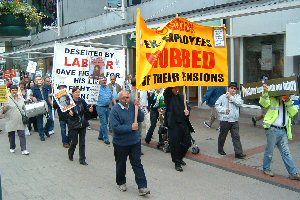 The group gathered in the town centre and marched up and down the pedestrian precinct for about nearly two hours. Weekend shoppers were handed flysheets explaining our predicament and were very sympathetic. Ironically both the Labour & Liberal parties had also picked this venue for campaigning on the last weekend prior to the Election. The prospective Conservative candidate, Mike Penning, used the opportunity to join the group and walked with them.. The group gathered in the town centre and marched up and down the pedestrian precinct for about nearly two hours. Weekend shoppers were handed flysheets explaining our predicament and were very sympathetic. Ironically both the Labour & Liberal parties had also picked this venue for campaigning on the last weekend prior to the Election. The prospective Conservative candidate, Mike Penning, used the opportunity to join the group and walked with them..
During the groups walkabout they confronted the Labour Party campaign bus containing Tony McWalter and entourage. The bus had come to a halt in the area and the group enjoyed the opportunity to make a special effort to make sure all those on the bus knew what we were about. Mr McWalter in his usual bombastic manner, hurled references from the top level of the open top bus, muttering and finger gesturing about how much the New Labour had done to help our cause, even though everyone now knows it is not enough to restore our pensions. The group responded with equal shouts describing how they had actually failed us.
Whilst this interchange was taking place the bus started and appeared to be drivenstraight at the protesters only the quick side-stepping of those in his immediate pathway prevented what could have been a very nasty incident. Tomorrow's media headlines could easily have read ' MP's campaign bus mows down protesters'.
Even with his own personal predicament Dave Cheshire (who has terminal cancer) along with his wife Marlene and daughter Claire still felt able to come and support us. The protest was very successful and well done to all those that turned out. The trademark Dexion Coffin, Drum and Yellow Banner were foremost in the parade followed by other banners, placards, whistles, fancy dress
 Tony Brown (ex Dexion) has used many of the posters from recent marches to decorate his house. The result is most impressive, and makes a welcome change from the usual "Vote for Joe Bloggs" posters Tony Brown (ex Dexion) has used many of the posters from recent marches to decorate his house. The result is most impressive, and makes a welcome change from the usual "Vote for Joe Bloggs" posters
Dover
At the same time, a group from ASW, organised by John and Sally Hayter and family, were demonstrating in Dover, the marginal seat held by Gwyn Prosser. The demonstration, complete with banners and flyers, attracted a lot of public support
Unfortunately the day was somewhat tarnished by Mr. Prosser the Labour candidate and his activists who told us we had no right to be there as we weren't local (so much for democracy!) and accused us of being members of The Country Alliance and wanting to kill foxes! They were totally unwilling to have any mature discussion with us, refused to accept flyers and said they were glad we had been robbed of our pensions and it served us right! A remarkable approach to public relations from someone in a marginal seat.
* * * * * * * * * * * * * * * * * * * * * * * * * *
Meeting with Malcolm Wicks at Croydon North Hustings
Marlene Cheshire, accompanied by John & Sally Hayter and Jacquie and Peter Humphries, attended the hudtings meeting at Croydon North on Sunday 24th April 2005. Although the subject of occupational penaions was not raised at the hustings itself, Malcolm Wicks kindly offered to talk with them at his campaign headquarters. The following points were discussed:
Q: Was the Dexion pension scheme to be definitely included in the FA Scheme? A: Yes.
Q: Who would be eligible for FAS? A: All those within the three year window in the included schemes.
Q: At what age could the FAS be claimed? A: 65 years of age with allowances being made for exceptional circumstances such as Dave and Marlene Cheshire.
Q: When would the legislation be passed? A: By the end of this year.
Q: If Dave died before the legislation was passed would money be available in order to help Marlene until it was passed? A: No.
Q: How did he expect her to survive? A: He advised her to claim benefits. (Marlene said they had been told she would not be eligible).
Q: Mr. Wicks was asked why the Government could provide over £6m to give a week’s wages to Rover workers ( which we do not begrudge them) but could not give help to Marlene, or anyone else in the same position as herself, in order to tide them over until the legislation was passed? A: No reply.
Q: Would the FAS be backdated to the company scheme date? A: Not known
The conversation then broadened to include the following:
During the open hustings meeting Mr. Wicks quite often used the word "fair" so he was asked if he thought it was fair that
1) A person who had paid into a scheme for say 15 years and fell within the three year window would receive some assistance, while another, who had paid into a scheme for 41years and fell outside the three year window would not?
2) A man who had paid into a scheme for 28 years, was seven months outside the three year window, died leaving a widow, 58 years of age, with a heart condition, having to sell her home and is now excluded from what little help is on offer?
Mr. Wicks said a line had to be drawn somewhere. We were unable to extract from him any confirmation of help for those outside the three year window. We did request a meeting with him should he be re-elected and then the meeting ended. Jacquie will be writing to him regarding this request.
Meanwhile, in the outer office, John and Peter were "educating" Mr. Wicks' activists with the facts of our situation. They thought it was terrible. One person actually said the £20m per year put into the FAS Scheme was exactly that, FA and the £80m per year needed was peanuts and they couldn't understand why it had not been made available!
* * * * * * * * * * * * * * * * * * * * * *
St Georges’ Day March Saturday 24th April 2005

About 100 people turned out for the march. It started at the County Hall side of Westminster Bridge then proceeded over Westminster bridge to St Stephen’s Gate at the House of Commons, accompanied by the usual banners, whistles, hooters and the famous Dexion drum and the equally famous Heidi’s horn.
 The procession was led by Alan Marnes (ex Samuel Jones) remarkably dressed as St George mounted on his faithful steed “Black Mess” who vanquished the green dragon containing Dave Postelthwaite (ex Kalamazoo) who sportingly agreed to wear the (very warm) outfit at the last minute when it proved too small for the original dragon The procession was led by Alan Marnes (ex Samuel Jones) remarkably dressed as St George mounted on his faithful steed “Black Mess” who vanquished the green dragon containing Dave Postelthwaite (ex Kalamazoo) who sportingly agreed to wear the (very warm) outfit at the last minute when it proved too small for the original dragon
St George also vanquished TWO Tony Blairs; Tony Brown (ex Dexion) and Mark Robinson
(from T&N)
At Stephen's Gate the crowd was addressed by Lord Matthew Oakeshott, the LibDem pensions spokesman in the House of Lords and Mike Penning the Conservative candidate for Hemel Hempstead (where Dexion were based). John Benson (ex ASW Cardiff) read statements of support from Adam Price (PC MP) and Owen John Thomas (PC AM) who both apologised for not attending because of previous engagements. Sally Hayter also read a letter of support from Sir Jack Jones who said he wished he could be with us but at the age of 92 it was a little difficult, and he concluded with the words “Keep up the fight”. A speaker from the DWP was requested but they declined our invitation
We had good media coverage with, amongst others, camera crews from Sky and Channel 4 with Liam Halligan who interviewed Pat Sargent at length about her election bid in Gordon Brown’s Kirkcaldy constituency. As the march was through one of the most popular tourist spots we received a lot of public support. It is remarkable, but even the drivers we delayed did not appear to mind.
We must particularly thank Peter Wheeler and Brian Mealing for the really remarkable posters they provided for the day. They were a real work of art. The text on the posters says it all.
As ever the Metropolitan Police handled us with good humour and common sense. The individual officers appear to sympathise with our case and help us wherever possible
Thanks to Sally Hayter & Jacquie Humphrey for organising another very successful day.
* * * * * * * * * * * * * * * * * * * * * *
Pensions Theft Candidate in the General Election
 Pat Sargent, (a wife, mother, grandmother, worker, saver and now campaigner) has decided she must challenge Gordon Brown and is standing as a candidate in his Kirkcaldy and Cowdenbeath constituency on the single issue of workers' destroyed pensions. Her husband, Keith, lost his pensions when Dexion slid into receivership Pat Sargent, (a wife, mother, grandmother, worker, saver and now campaigner) has decided she must challenge Gordon Brown and is standing as a candidate in his Kirkcaldy and Cowdenbeath constituency on the single issue of workers' destroyed pensions. Her husband, Keith, lost his pensions when Dexion slid into receivership
Questioning Gordon’s current inadequate ‘assistance’ proposals for pensioners, Pat is an independent, non party-political candidate. She knows that, for the tens of thousands of families affected (incl. her and husband Keith's), this issue really is beyond politics. It deserves true cross-party support to finally resolve it.
The recent inspiration for her stand has been the plight of some of the Pensions Action Group’s widows, as well as witnessing a terminally ill, courageous fellow-campaigner still having to plead with the Government for his stolen pension rights.
Gordon Brown speaks with conviction of his vision for those who work hard and ‘play by the rules’. We all played by the rules that Gordon set, and have found ourselves without the pensions we were told were safe and protected by law. At last year’s Party Conference he himself acknowledged that our plight was "simply wrong", and promised to “work with the unions to do what it takes to tackle the gross injustice of workers who through no fault of their own find their pensions have been destroyed.”
Fine words, but to date the Financial ‘Assistance’ Scheme (FAS) fund he had already made available is now proposed to be divided between just a small proportion of the affected families. The FAS doesn't have anywhere near enough money made available to it, and is certainly not the ‘justice for all’ his speech proclaimed.
* * * * * * * * * * * * * * * *
Protest Saturday 16th April 2005
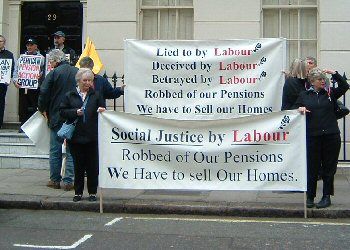 Many people caught in a pension wind-up have to sell their family homes to survive. To emphasise this point the protest on Saturday 16th April was held outside Tony Blair’s newly acquired mansion which he has purchased as an investment ready for when he steps down from being Prime Minister. Tony Blair does not live there at present, the house is currently being rented out. Many people caught in a pension wind-up have to sell their family homes to survive. To emphasise this point the protest on Saturday 16th April was held outside Tony Blair’s newly acquired mansion which he has purchased as an investment ready for when he steps down from being Prime Minister. Tony Blair does not live there at present, the house is currently being rented out.
The group met at Marble Arch tube station then walked round to the house in Connaught Square. Leaflets were put through local doors explaining who we are, why we were there, and apologising for any inconvenience
The banners neatly tell the message
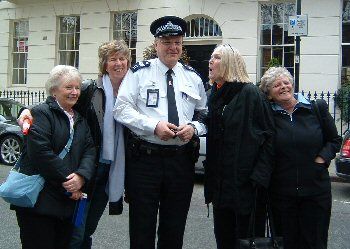 From the left, Marlene Cheshire (wife of David Cheshire ex Dexion who is in a hospice with terminal cancer), Jacquie Humphrey, Sally Hayter and Jean Wade with a friendly policeman. As ever the Metropolitan Police deserve our thanks for their good humour and common sense. The protest was particularly poignant for Jean Wade because, as a widow from ASW Sheerness, she has already had to sell her home to raise money. From the left, Marlene Cheshire (wife of David Cheshire ex Dexion who is in a hospice with terminal cancer), Jacquie Humphrey, Sally Hayter and Jean Wade with a friendly policeman. As ever the Metropolitan Police deserve our thanks for their good humour and common sense. The protest was particularly poignant for Jean Wade because, as a widow from ASW Sheerness, she has already had to sell her home to raise money.
Thanks to everyone who attended plus Jacquie Humphrey and Sally Hayter who organised the day.
* * * * * * * * * * * * * * * * * * * *
Vigil for David Cheshire, 9th April 2005
David Cheshire, 62, an ex employee of Dexion, is in a hospice with terminal cancer. Like other Dexion employees David lost his pension, along with his job, when Dexion closed in 2003. David is desperate to know that his wife, Marlene, will be financially secure when he dies. Unfortunately the FAS provisions of survivor benefits and pensions for people with severe illness have still to be revealed.
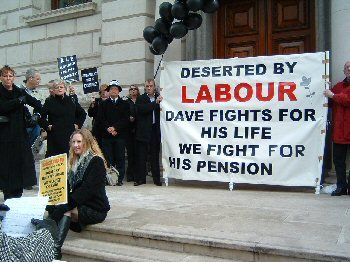 A party from the Pensions Action Group met at the DWP headquarters at Richmond House in Whitehall then walked to the Treasury where a one hour silent vigil was held. At the end of the vigil a cloud of black balloons was released. A party from the Pensions Action Group met at the DWP headquarters at Richmond House in Whitehall then walked to the Treasury where a one hour silent vigil was held. At the end of the vigil a cloud of black balloons was released.
The photograph shows David’s daughter, Claire, who bravely took part and was deeply moved by the vigil for her father.
Special mention should also be made of Jean Wade, the first widower from ASW Sheerness, who had traveled up from Gosport to show support. Thanks, as ever, to the Metropolitan Police who assisted us with their usual good humour and common sense. Apparently many officers had seen David’s plight on Channel 4. Thanks to John & Sally Hayter for organizing the day
* * * * * * * * * * * * * * * * * * * * * * * * * *
Cardiff Protest March Saturday 26th March 2005
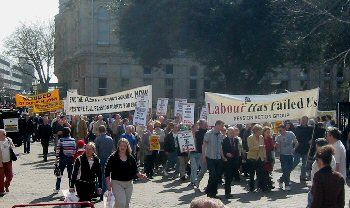 Over 200 workers from ASW Sheerness and Cardiff joined forces with employees of other failed companies from all over the United Kingdom in a protest march through the centre of Cardiff from St David’s Hall to the Welsh Office in Cathays Park. The march was to protest about the occupational pensions which had been lost when the pensions schemes were wound up, despite the government having said such pensions were safe, guaranteed and protected by law. Because the Welsh/Austria World Cup qualifying match was taking place just a few hundred metres away at the Millennium Stadium, Cardiff city centre was very busy and our march attracted much public interest Over 200 workers from ASW Sheerness and Cardiff joined forces with employees of other failed companies from all over the United Kingdom in a protest march through the centre of Cardiff from St David’s Hall to the Welsh Office in Cathays Park. The march was to protest about the occupational pensions which had been lost when the pensions schemes were wound up, despite the government having said such pensions were safe, guaranteed and protected by law. Because the Welsh/Austria World Cup qualifying match was taking place just a few hundred metres away at the Millennium Stadium, Cardiff city centre was very busy and our march attracted much public interest
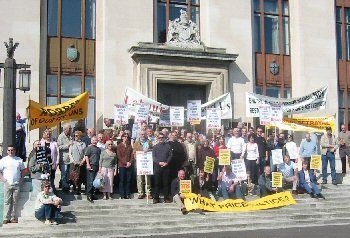 At the end of the march there were very supportive speeches from Adam Price MP (PC) who was the instigator of the union’s ongoing Article 8 legal action via the European Court, Assembly Members Owen John Thomas (PC) and Jenny Randerson (LibDem), and prospective parliamentary candidates Jenny Wilmott (Lib-Dem) and Victoria Green (Cons). It was very noticeable that, despite being invited, no Labour MPs or Assembly Members attended. At the end of the march there were very supportive speeches from Adam Price MP (PC) who was the instigator of the union’s ongoing Article 8 legal action via the European Court, Assembly Members Owen John Thomas (PC) and Jenny Randerson (LibDem), and prospective parliamentary candidates Jenny Wilmott (Lib-Dem) and Victoria Green (Cons). It was very noticeable that, despite being invited, no Labour MPs or Assembly Members attended.
The march was well covered by the media and reports and interviews appeared on BBC and ITV news.
Many thanks to John Benson, (ex ASW Cardiff), who organised the march and the people who travelled from all over the United Kingdom to give support. We must also, as ever, thank the local police for their good humour and assistance in what, with the World Cup qualifying match, was a very busy day for them
* * * * * * * * * *
Reactions to Pensions Group Press Release
On March 7th 2005 we issued a press release querying the details of the FAS which had just been announced. This release can be found on our documents page. This release triggered a furious response from many Labour MPs, notably Tony McWalter MP for Hemel Hempstead, who were “appalled” by its contents and demanded its withdrawal and the issuing of an apology. It would seem this response was caused by drawing attention to the fact that it would be some time before people outside the three year window would know what they would get. In addition it stated that it was thought likely that people outside the window would receive smaller payments and there would be a lower cut-off age
A second Press Release (also on our documents page) was therefore issued challenging the government to dispute these suggestions. As yet there has been no response
* * * * * * * * * * * * * * * * * * * * * * * * * * * * * * * *
Scheme/State Retirement Age
Despite inclusion in the FAS window being set by the time to your scheme retirement age and the phrase “core benefits” being used, it has become apparent that the FAS will not pay out until the state age of 65, and there is no possibility of earlier retirement. Everybody; MPs, the media, scheme members and pensions experts, had all been led to believe by government statements that the FAS would kick in at scheme age
As Ron Dawson has commented in a group e-mail there are four possible interpretations:
1) The DWP statements are textually incorrect, and the DWP actually meant age 65 all along but just forgot to say so ! . . . . . . . . . . . .
2) The word 'core' has a deeper (but still undefined) meaning which can be used to represent anything that the DWP cares to dream up ! . . . . . . . . .
3) The statements were issued with a known terminological inexactitude with the intention satisfying MPs’ questioning, and to quell the obvious unrest in many sectors. In other words willful deception.
4) The original intention was for a FAS kick in age at scheme retirement age, but someone higher up moved the goal posts.
Of these options 3 and 4 seem the most likely. Is it any wonder that people do not trust politicians?
* * * * * * * * * * * * * * * * * * * * * * * * * * * * *
Pensions Summit Monday 21st March 2005
Sandra Osborne, Labour MP for Ayr, chaired a Pensions Summit at Portcullis House on the afternoon of Monday 21st March. The summit was organised to discuss recent announcements about the implementation of the Financial Assistance Scheme (FAS)
Willie Riggans (UEF) started the meeting by outlining how the problem had been caused by the 95 Pensions Act, and how he had lost his pension when UEF became insolvent
There were many powerful case studies where people described how the loss of their pension had affected the lives of them and their families.
In an emotional address, John Benson told how he had paid into his company scheme for 28 years. He has lost this, plus a £50,000 lump sum due upon retirement. "I am on the verge of a nervous breakdown," he said, adding: "I have been married to a wonderful woman for 30 years and at one stage I thought I might lose my marriage”.
David Cheshire a Dexion worker who is ill with cancer and came directly to the Summit from hospital, powerfully described how he could not receive any of his promised pension despite his ill health and how he was worried about how his wife would manage on the pittance of a widow’s pension
Ronnie Martin described what had happened at Richardsons Fertilizers, a company which had plant on both sides of the Irish Border. The Republic has implemented Article 8 so when Richardson failed employees from the Southern Ireland plant received their pension in full, whereas those from the Northern Ireland plant (governed by UK law) lost their pensions
Jim Glover, from Kilmarnock, told how he worked for almost all of his life for Rowats food building up, because of his long service, a reasonable pension. Because of the low capping in the FAS he will only receive about 45% of his expected pension. He is not a high paid executive, simply someone who has been a loyal employee for many years
Frank Bramley, from Leicester had worked for BUSM since 1968 and has over 35 years service. He was expecting to retire at 60 with a full 2/3rds pension. After BUSM wound up his expected pension is less than the Guaranteed Minimum Pensions (GMP) He is, however, just a few weeks the wrong side of the FAS window and has no idea what he will get
Sue Day told how both she and her husband had both lost their pensions after the firm they worked for went into administration in 2002. Her husband died of cancer five months ago and she now faces a financially uncertain future, which may see her having to sell her home to provide extra income. Like many widows she was surprised to learn that widow’s benefit ceases after twelve months.
The final case study by Richard Nicholl discussed solvent companies whose employees have been specifically excluded from the FAS. These people have suffered in exactly the same way, and their numbers are small so it is difficult to see whty they are npt included.
The leader of the FAS team, Mike le Brun, bravely came along and spoke about how the FAS will be implemented. He said he could not give any details as the implementation was still under discussion, but in the short following Q&A session the 65 FAS age was confirmed
Dr Ros Altmann, Governor of London School of Economics and Independent Pensions Policy Advisor described the pension collapses that have left thousands of people without an income in their old age "the biggest social injustice of our time", told the affected workers: "The government is responsible for what has happened to you. This is cruelty beyond anything I've ever seen." and explained how a fair solution could be implemented at minimal cost.
Other speakers included:
Ronnie Sloan Independent Consulting Actuary, Bryan Freake, Amicus member of the FAS working party, the Amicus lawyer who is handling the Article 8 European Court case (and appeared very confident about the outcome)
Brian Gallagher (Amicus) and Mike Penton (Community) spoke about the shortcomings of the FAS and said they were continuing to apply pressure on the government. They expressed support for the Parliamentary Ombudsman investigation
To show cross party support John Denham MP (Lab), Nigel Waterson MP (Cons) and Steve Webb MP (LibDem) all attended and spoke.
After the meeting had finished, and the media had left, there was an extraordinary outburst from Tony McWalter MP (Hemel Hempstead) which is reported in a press release on our documents page. He stated that Labour MPs had been instructed not to attend the Summit
We had a good turn-out from the media and many supportive articles in the press during the following week. Thanks to Sandra Osborne for organising and chairing the Summit and to everyone who attended. A very successful afternoon.
* * * * * * * * * * * * * * * * * * * * * * * * * * * * * *
FAS Implementation Announcement 22nd February 2005
On Tuesday 22nd February 2005 the DWP issued a press release about the implementation of the FAS. The press release can be found on our here. The implications of this needs some time to consider, but some initial thoughts are:
1) The only people to benefit are those within three years of their scheme retirement age. The majority of people who have lost their promised pensions are not included
2) What is meant by “core benefits” is not clear. Does this include indexing, spouse’s benefits etc?
3) What is the proposed level of capping?
4) There appears to be a total exclusion of the employees of solvent schemes. These people were often placed in the impossible position of having to choose between their jobs and their pension.
Until these, and other, questions are answered our response will be a very guarded statement that the government’s response, whilst welcome, does not fully address the problems caused by scheme wind-ups. The Pensions Action Group's stance remains the same: We have pension entitlements that the government told us were safe, promised and protected by law. We expect the government to honour these statements.
Community Union (previously ISTC) has issued a press release saying it will continue its action via the European Court
The announcement does not affect the investigation by the Parliamentary Ombudsman
* * * * * * * * * * * * *
The St Valentine’s Day Massacre (of our pensions by Gordon Brown)
Saturday 12th February 2005
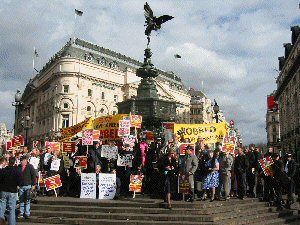 Over 200 people turned up for our February protest which was held at Eros in Piccadilly Circus. The theme of the day was Gangster and Molls and many people dressed appropriately for the occasion. Leaflets were handed out to the crowd and signatures collected on protest post cards that will be forwarded to Gordon Brown Over 200 people turned up for our February protest which was held at Eros in Piccadilly Circus. The theme of the day was Gangster and Molls and many people dressed appropriately for the occasion. Leaflets were handed out to the crowd and signatures collected on protest post cards that will be forwarded to Gordon Brown
A BBC2 film crew attended, filmed our protest and took interviews for a BBC2 Money programme on occupational pensions which will be shown in early March. Other media crews were present including a reporter from the Thailand State TV
After leaving Piccadilly we passed the Treasury, leaving our spare leaflets and placards on the front doorstep for Gordon Brown to collect on Monday morning
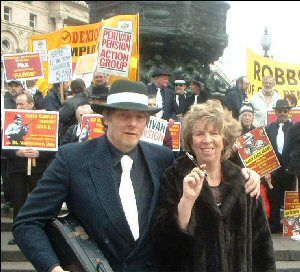 Thanks to everyone who turned up, particularly Dave Allen for his public speaking, and the group from Kalamazoo who provided the postcards and placards. As ever we must thank the Metropolitan Police for the good humoured presence at the event. Thanks to everyone who turned up, particularly Dave Allen for his public speaking, and the group from Kalamazoo who provided the postcards and placards. As ever we must thank the Metropolitan Police for the good humoured presence at the event.
Two of the many gangsters and molls; Alan Marnes (from Samuel Jones) and Jacquie Humphrey (from Dexion). The costumes, complete with violin cases, were quite remarkable.
* * * * * * * * * * * * * * * * * * * * * * * * * * * *
Rich will cash in on pensions change
As much as £4bn of taxpayers' money could be used by top-earning executives, accountants, lawyers and other professionals to boost their personal pensions. Much of the pension money is expected to be used to buy holiday homes and buy-to-let properties, which investors will be allowed to purchase for the first time tax-free using their pension fund.
The government has announced that under new rules the maximum contribution to a pension will rise from £102,000 to £215,000, allowing high earners to double the amount of tax relief they currently receive. For every 78p individuals contribute to their pensions, the government adds 22p. Higher rate taxpayers get an additional 18p, and although they make up only 10% of workers, receive 50% of all tax relief.
The national audit office estimates that a quarter of the £10bn tax relief goes to the top 2.5% of earners.
By way of comparison it is estimated that 70,000 workers have seen all or some of their expected pension disappear following the collapse of their employer or the wind-up of their schemes.
Dr Ros Altmann, who has been advising Downing Street on a package of measures to support these workers said she was appalled at the new scheme.
"At a time when thousands of people have seen their pensions wiped out through no fault of their own, it is outrageous that a Labour government is prepared to hand out huge sums to people who are already well-off," she said.
"I have repeatedly been told by ministers there is not enough money to help poor pensioners in this situation. Yet there seems to be enough in the kitty to give high earners a helping hand to buy their gite in France,"
* * * * * * * * * * * * * * * * * * * * * * * * *
Simultaneous Protests in Glasgow & Birmingham 11th December 2004
Simultaneous road closures were held in Glasgow and Birmingham on the morning of Saturday 11th December. The Glasgow event was co-ordinated by Willie Riggans and the Birmingham event by Mickie Ball, both of whom have lost their UEF pensions
The Glasgow Protest was at the junction of Hope Street & St Vincent Street, and the Birmingham Protest on Queensway by the Albany Hotel on the approach to New Street station.
Both events stopped the traffic for about thirty minutes and were covered by the local and national media. As usual the protests ended at the request of the local police.
* * * * * * * * * * * * * * * * * * * * * * * * * * *
Meeting with Alan Johnson 7th December 2004
Alan Johnson, the new Secretary of State for Work & Pensions and Malcolm Wicks, Minister for Pensions, held the first of what are believed to be a series of meetings with people who have been affected by pension wind-ups. People from UEF, Ravenhead Glass, Richards Textiles and ASW attended accompanied by their MPs and some union representatives. With MPs’ researchers and civil servants there were over thirty people present which unfortunately meant the meeting was rather formal and there was only time for a small number of questions.
Alan Johnson ran over the background to the FAS making the following points:
The FAS is an assistance scheme, it is not compensation. The government is not admitting any liability
They had considered pooling the assets as this would lead to economies of scale, but time considerations meant that dealing with schemes on a one to one basis was the only practical approach.
There will be an announcement at the end of January indicating the percentage of pension that people can expect from the FAS. It will not be as good as the 90% from the PPF.
The scheme will start in Spring 2004. Reports in the FT about delays until the end of 2004 or later were inaccurate and scaremongering.
The government believe that the £400 million, along with contributions from industry and the money in the schemes, will be adequate to give substantial assistance. They would not be drawn on the word “substantial” saying figures were still being calculated and would be released at the end of January.
Asked about contributions from industry they admitted that none had been received so far.
The FAS will be targeted at the most needy and a priority would be older workers at or near retirement age
There will be a lower cut off at £10 per week
There will be a start cut-off date of 1st January 1997
There was about twenty five minutes for questions. Topics covered included the three year review, again said to be procedural rather than a review of the funding, however Alan Johnson did acknowledge that it would be hard to have a review without funding being discussed. However at present there were no plans to increase the funding but If the funding was proving inadequate it is something we (individuals, groups, unions) should take up at the political level.
Comments were made about solvent companies, whose employees seem to have been excluded. We were told this was a complex subject as each solvent wind-up was different, e.g. was it a company decision, or was it negotiated with the trustees. They said they were mindful of the position and the relatively small number of people, and inclusion had not been ruled out.
The group from UEF firmly stated their view that they wanted their full pension entitlement and if this is not received the protests would continue.
* * * * * * * * * * * * * * * * * * * * * * * * * * *
Notch Meeting 4th December 2004
The regular Notch meeting was held at Southoe on Sunday 4th December. Thanks to Alan Marnes for arranging the venue and the welcome refreshments. Dr Altmann attended to give feedback and support and suggested possible future strategies. We would like to publicly record our appreciation of her help; how she finds the time and energy we do not know. Recent events such as the Labour Party Conference and the protest in Oxford Circus were reviewed and schemes discussed for future events. The probability of an election in 2005 was noted and several ideas for our future campaign considered. It is probable that Notch meeting will be held at shorter intervals as the election approaches
The next meeting will be held at Groby village Hall near Leicester on Sunday January 16th 2005. Details of this will be circulated to the e-mail group and posted on the web-site after Christmas. Please come along and give your views, we have more effect if we work together as a group and new ideas are always welcome.
The next event will be held on Saturday 12th February 2005, please keep this date clear in your diary. With an election approaching we need as many people as possible at our events in 2005.
* * * * * * * * * * * * * * * * * * * * * * * * * * *
Early Day Motion 40
You will probably remember EDM200 from the last Parliamentary Session. It was raised by Kevin Brennan and Derek Wyatt and achieved a very commendable 300 signatures with over half of Labour MPs signing it. EDMs are closed at the end of the Parliamentary session so EDM200 is now defunct.
Sandra Osborne (MP for many UEF workers), assisted by MPs Derek Wyatt, Bill Tynan, Anne Begg, Frank Roy and Rosemary McKenna, has raised a new EDM, known as EDM40. The actual wording of EDM40 is:
That this House recognises the suffering of those members of final salary schemes who have lost their pensions when their schemes were in wind-up and their need for urgent assistance; welcomes the provision of £400 million for the Financial Assistance Schemes but is concerned that this is not a sufficient sum to provide the substantial assistance promised by the Government; asks the Government to consider pooling the assets of winding-up schemes, rather than purchasing annuities, and paying pensions on an ongoing basis, as will be the case with the Pension Protection Fund, so that costs to the Exchequer can be spread over a long period of time which would provide an affordable option without overburdening the public funds; notes that if the Financial Assistance Scheme lasts 20 years those people currently in their fifties will only be in their seventies when the Scheme runs out; further notes that estimates suggest that if the Government will commit to pay a sum of £75 million a year, index linked, for 40 years into a central fund and pool all the assets of the schemes which have not yet bought annuities, promised pensions to non-retired members could be paid to at least the level of the Pension Protection Fund; calls on the Government to acknowledge that further resources will be required to fulfil the Government's desire to rectify this injustice and restore confidence in pensions; and finally urges the Government to settle this matter as soon as possible and in advance of a general election
EDM stands for Early Day Motion and is a form of internal House of Commons petition. The rather strange wording and tortuous grammar arises because it has to be a single sentence.
EDMs have no direct legislative effect but they can be a powerful tool for showing support from MPs. EDM200, for example, showed that over half of the backbench MPs supported us and directly lead to the amendments to the Pensions Bill. Unfortunately the FAS was established as a buy-off and many MPs believed the problem had been solved.
If we can repeat the 300 signatures on EDM200 on EDM40 it will be a powerful demonstration that the FAS is inadequate and show that the backbench MPs still support us. In the last session we had problems with MPs not signing EDMs from "the other party". Please emphasise that this is a cross party issue and get your MP to sign it regardless of their party.
The progress of EDM40 can be tracked here
Please contact your MP and ask them to sign EDM40.
Most, but not all, MPs have an e-mail address of the form
<surnamefirst_initial>@parliament.uk
for example Joe Soap would be soapj@parliament.uk
Alternatively by snail mail to
Joe Soap MP, House of Commons, London SW1A 0AA
or phone the House of Commons on 020-721-93000 and ask to speak to Joe Soap. You will probably get his/her secretary but ask for them to phone you back.
* * * * * * * * * * * * * *
Conservative Party EDM199
The Conservative party have also raised their own EDM199 which asks for our pensions to be paid out of the orphan assets held in banks, building societies and insurance companies, an idea first proposed by Frank Field MP and raised by him as a private member’s bill last year. Unfortunately it did not get parliamentary time and was not heard. Whilst EDM199 is very laudable, it is unlikely to have the impact of EDM40.
* * * * * * * * * * * * * * * * * * * * * * * * * * *
Meeting with Financial Assistance Team Wednesday 24th November 2004
Several members of the Pensions Action Group took part in an information meeting with Mike le Brun and other civil servants from the DWP FAS team. Minutes of this meeting are being prepared separately by the DWP and ourselves and will be circulated shortly. Essentially the group forcibly re-stated our view that the proposed £400million fund was woefully inadequate and the announcement that the scope of the FAS, whilst laudable, meant that the fund would be further diluted. Mike le Brun again stated that the size of the fund was a political decision. He would notify ministers of our views, but he had no power to change the size of the fund.
* * * * * * * * * * * * * *
London Protest Saturday 20th November 2004
Between 150 and 200 members of the Pensions Action Group met up at Oxford Circus on Saturday 20th November. The theme of the day was “Gordon Brown Stop Clowning Around” with many of the members dressed appropriately as clowns.
The event was filmed by Channel 4 news who will be showing us in a fifteen minute slot on occupational pensions during the 7pm News sometime in the next two weeks, date as yet unknown. The Channel 4 film crew had travelled down from Birmingham with Pete Wheeler and other ex Kalamazoo employees.
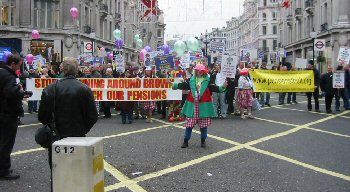 After a few minutes protesting on the pavement we moved out in to the centre of the Circus stopping the traffic in Oxford St and Regent St. After discussions with the police, who arrived in a commendably short time, we cleared back on the pavements. After a few minutes protesting on the pavement we moved out in to the centre of the Circus stopping the traffic in Oxford St and Regent St. After discussions with the police, who arrived in a commendably short time, we cleared back on the pavements.
We must, as ever, complement the Metropolitan Police for their understanding and sense of humour. There were apparently many demonstrations in London that day and they asked us politely to move on once we had our photographs as they were rather undermanned. Needless to say we complied.
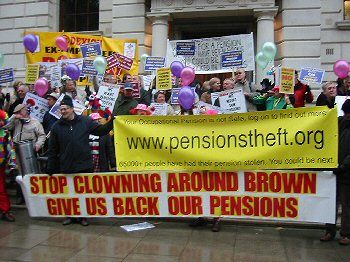 It is generally thought that the main obstruction to our case is Gordon Brown and the Treasury, so it was suggested we did a “photo-opportunity” outside the Treasury. We walked (on the pavements!) down from Oxford Circus, via Piccadilly Circus (more photo-shoots by Eros), to the Treasury where we did our thing on the steps. The rain had started to fall by now, oddly enough it was raining the last time we visited the Treasury! It is generally thought that the main obstruction to our case is Gordon Brown and the Treasury, so it was suggested we did a “photo-opportunity” outside the Treasury. We walked (on the pavements!) down from Oxford Circus, via Piccadilly Circus (more photo-shoots by Eros), to the Treasury where we did our thing on the steps. The rain had started to fall by now, oddly enough it was raining the last time we visited the Treasury!
 It was here that one of the photos which perhaps best sums up the current campaign position was posed - The HM Treasury plaque; with one of Dexion's many spectacular 'clowns' (Peter Humphrey) bearing a brilliantly incisive Kalamazoo plaque. It was here that one of the photos which perhaps best sums up the current campaign position was posed - The HM Treasury plaque; with one of Dexion's many spectacular 'clowns' (Peter Humphrey) bearing a brilliantly incisive Kalamazoo plaque.
Despite rather poor weather and problems with the Underground (a large part of it was closed for weekend maintenance; come to London, the world’s largest interactive transport museum), it was a very successful day, Thanks to everyone who turned out
Thanks to Peter & Jacquie Humphreys, Paul Gill and Tony Brown for organising the day, Heidi (from Felix Schoeller) for the wonderful horns, and everyone who came along and supported us. It was a very good turnout.
Peter Wheeler and the folks from Kalamazoo deserve praise for preparing the many excellent banners including the superb “FAS pronounced Farce”
We need more events like this; our next event will be sometime towards the end of January. Details will be announced via this web-site and the e-mail group in the new year
* * * * * * * *
News 17th November 2004
The Parliamentary Ombudsman, Ann Abraham, has announced that her team will investigate government actions relating to occupational pensions. If this investigation finds in our favour it is probable that she will recommend that our pensions are paid in full. A press release from Dr Ros Altmann, who has done most of the work preparing the case, can be found on the Documents page. Thanks also to all the 100 or so MPs who forwarded our complaints to the Ombudsman and Steve Webb MP who made the initial contacts. The investigation will take about a year.
* * * * * * * *
News 15th November 2004
On Monday 8th November Malcolm Wicks made a surprise announcement in the House saying that some employees may, under certain circumstances, be eligible for the PPF even if the company was in trouble before the PPF starts. This is a direct contradiction of earlier statements that said the PPF could not be retrospective.
Originally the FAS would only apply to companies that became insolvent before May 2004. Companies failing after that date would benefit from the revised priority order (freezing pensions in payment would increase payments for employees yet to retire). Surprisingly, on Friday 12th November Malcolm Wicks announced that the FAS would be extended to the commencement of the PPF. He said he could not, however, increase the funding of the FAS, so any future company failures will reduce the already minuscule aid the FAS can provide.
In Moneybox on BBC Radio 4 on Saturday 13th November Malcolm Wicks confirmed these statements and said he was disappointed that there had been no contributions to the FAS from companies or the pensions industry. Christine Farnish (CEO of the NAPF) was on the program and said that Malcolm Wicks was “not on the same planet as the rest of us” as all pension providers were already struggling to fund their schemes & the PPF without the imposition of further expense.
This all sounds like policy making on the hoof.
Amicus and Community have been successful in having their Article 8 action taken to the European Court of Justice. A copy of the Community Press Release can be found on the Documents page.
* * * * * * * * * * * * * * * *
FT Pensions Management Award Ceremony
The FT journal Pensions Management held its annual award ceremony on Friday 22nd October 2004. Shelagh Fogarty, from BBC Radio Five Live, was guest speaker and host for the awards ceremony.
At the end of the normal annual awards, Pensions Management made a special award to Dr Ros Altmann for her outstanding contribution to pensions and in regard to her work in raising the issue of lost pension benefits from schemes in wind-up.
As Ros was out of the country and unable to attend to collect the award, she invited Peter Humphrey and Andrew Parr to attend on her behalf. Peter made a powerful short speech:
"It is worth recording the work Ros has done for people like ourselves who, through no fault of their own, have lost their pension because of scheme wind-ups
Alan Johnson recently said there wasn't a pensions crisis, believe me for 60,000 people who have lost their pensions there is a pensions crisis NOW
In Autumn 2002 the group met with Ian McCartney, then Pensions Minister. He said he sympathised with our case but:
The 95 Pensions Act provided valuable protection and would not be changed
An insurance scheme for pensions had all sorts of difficulties
He could offer us no hope whatsoever for the restoration of our lost pensions
Since then Ros has worked with us on a “Pro-Bono” basis and as a result of her efforts and knowledge of parliament and the industry:
The Pensions Bill should come into effect in 2005 preventing other people being put in the same dreadful position as ourselves
The Government has acknowledged our plight and established the Financial Assistance Scheme. A step in the right direction but woefully underfunded. The pledged £400 million should be £75 million pa to resolve the issue.
In addition Ros has worked with us on our case for the Parliamentary Ombudsman and with the Amicus and ISTC unions on the case for the European Court
How she finds the time and energy we do not know, but the 60,000 people who have lost their pensions will be eternally grateful.
We would also like to record our thanks to her family. We know the work she has done has been incredibly time consuming and the impact on them has been large. We appreciate their tolerance and understanding"
This speech was received with tumultuous applause.
It was very encouraging to hear the supportive comments made by many pension professional experts and the day certainly raised the profile of our case.
We can only repeat our heartfelt thanks to Ros.
* * * * * * * * * * * * * * * * * * * * * * * * * *
Parliamentary Ombudsman
We understand the PO office has received signed complaint forms on behalf of nearly 200 people from MP's of all parties, including Conservative, Lib-Dem, Welsh Nationalists, Ulster Unionists and, of course, from Labour backbenchers. The PO has confirmed that these complaints will be used as 'representative cases', so it is not essential for others to submit any more complaints, but, of course, if you want to, then by all means do so.
The only thing that is delaying an announcement of an investigation is the possibility that the case being brought to the European Court by the unions may mean the PO cannot investigate some people's complaints. The PO has met with the Community union (previously known as the ISTC), to talk about their case and is now taking its own legal advice as to what it can investigate and what it can't. It would obviously be best if the two actions could run alongside each other, to keep up the pressure on the Government.
The PO has powers to investigate different aspects of the situation, from those that will be covered by the legal action. This should be another possible way of getting redress and the two challenges are complementary strategies to force the Government to come up with the commitment of £75million a year for 40 years and to pool all the assets and not buy annuities with the money, in order to make the Financial Assistance Scheme work.
Legal action alone is both lengthy and uncertain. The PO itself cannot deal with failures of legislation or policy, but can look at the way in which Government and its Departments administered the law. Therefore, a PO investigation will be able to look at other aspects of the dreadful injustice we have suffered, hopefully alongside the action taken by the Community Union.
The PO is a very attractive route to pursue, when trying to seek redress for failures of administration and careless actions by the Government. The courts cannot deal with maladministration, only with illegality. The PO is the only remedy for maladministration.
Unlike a legal case, the PO process does not require absolute proof, but can make a decision on the balance of probabilities, with a reasonableness test. The PO is impartial, not adversarial, and has really powerful evidence powers. The PO has extensive powers with respect to evidence and witness statements. They can interview anybody, including Ministers, and the Crown cannot rely on privilege or confidentiality in refusing to provide any evidence (other than Cabinet papers).
Once the PO has taken its advice we hope that it will be able to launch its enquiry, to try and identify the failings of Government departments, which left people without any opportunity to protect themselves against scheme wind-ups and led them to believe their money was safe and protected by the law.
* * * * * * * * * * * * * * * * * * * * * * * * * *
Labour Party Conference Brighton 29th September 2004
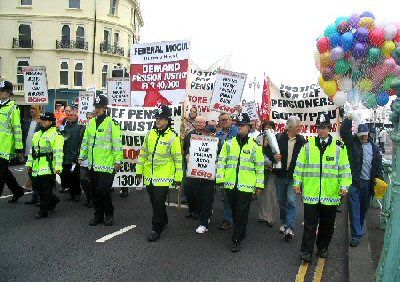 About 1,000 people attended our protest march at the Labour Party Conference in Brighton on Wednesday 29th September. The trade union Amicus arranged for several hundred people from Turner & Newall (T&N) to travel down from Derbyshire and elsewhere to join in the day. We assembled at the Palace Pier then, escorted by the police, we marched down the seafront to the conference centre. After the usual whistle blowing and banner waving the special events commenced. About 1,000 people attended our protest march at the Labour Party Conference in Brighton on Wednesday 29th September. The trade union Amicus arranged for several hundred people from Turner & Newall (T&N) to travel down from Derbyshire and elsewhere to join in the day. We assembled at the Palace Pier then, escorted by the police, we marched down the seafront to the conference centre. After the usual whistle blowing and banner waving the special events commenced.
Thanks are due to Jacquie & Peter Humphreys and Sally & John Hayter for organising the day, and the police who handled our march and events with good humour.
The photographs in this report were provided by Tony Brown, Neil Crick, Keith Dolbear, Alan Marnes, Andrew Parr and Keith Sargent.

After arriving at the conference centre a group of ladies illustrated what a “boob” the government had made of pensions. The brave “Brighton Belles” were, from left to right, Jenny Marnes, Jacquie Humphrey, Angela Brown, Valerie Day, Barbara Evans, Alison Parr, Pat Sargent. Thanks to these for being good sports and (90 year old) Joan Lightfoot who made the ladies’ bloomers.
The display understandably attracted a wide amount of interest, including a Coastguard patrol boat which came dangerously close to the shore, presumably for a better view. A hoard of reporters and photographers surrounded the ladies and backed them in to the sea. A photograph of the Belles appeared in the Daily Sport which is some form of claim to fame.
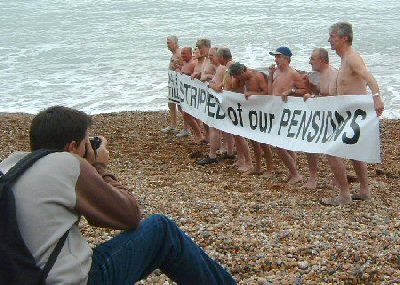 As a follow up the “Brighton Boys” also did a striptease with a banner announcing “Still Stripped of our Pensions”. Following on from last year they were tastefully attired in moonie shorts. This also attracted a lot of media interest. As a follow up the “Brighton Boys” also did a striptease with a banner announcing “Still Stripped of our Pensions”. Following on from last year they were tastefully attired in moonie shorts. This also attracted a lot of media interest.
 Peter Wheeler had the hardest job of the day. He provided an advertising trailer with the message "PENSIONS- STILL NOT SAFE", drove it down from Birmingham with his colleagues and trusty navigators Mark Hamilton and Larry Hickey, and then spent the entire day driving round and round Brighton’s busy streets and queuing in the inevitable traffic jams caused by the conference. The print union GPMU, (shortly to merge with AMICUS) funded most of the costs of this display. The Sussex police again deserve our thanks. They were most helpful with advice and allowed the trailer to park up on the Kings Road promenade close to the conference centre during our demonstration. Peter Wheeler had the hardest job of the day. He provided an advertising trailer with the message "PENSIONS- STILL NOT SAFE", drove it down from Birmingham with his colleagues and trusty navigators Mark Hamilton and Larry Hickey, and then spent the entire day driving round and round Brighton’s busy streets and queuing in the inevitable traffic jams caused by the conference. The print union GPMU, (shortly to merge with AMICUS) funded most of the costs of this display. The Sussex police again deserve our thanks. They were most helpful with advice and allowed the trailer to park up on the Kings Road promenade close to the conference centre during our demonstration.
Many people came over to talk with us whilst we were demonstrating outside the conference centre. Amongst these was Tony Robinson (also known as Baldrick) shown here talking with Pat and Keith Sargent. He came across quite seriously, arguing the need for Tony Blair & Gordon Brown's 'hard-working families' strategy to include ourselves. His attention was drawn to how the £20million pa represented a loaf of bread a day. Appearing to concur with the points we were making he repeated his general view that there was a disproportionate emphasis currently being placed on young families & was arguing for this to be addressed
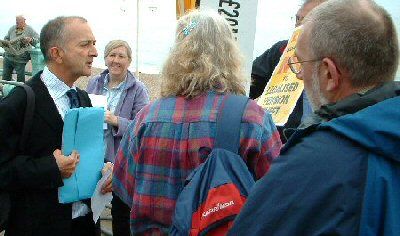
Several people spoke with Malcolm Wicks during the day at meetings organised by constituency MPs. There was nothing new to report but everyone strongly expressed the view that the proposed FAS of £20 million pa was inadequate and we are not looking for compensation or charity, we simply want our promised pensions. More frequent updates on the work being done by the FAS team was requested. At the meeting organised by Derek Wyatt MP union representatives from Community (previously known as the ISTC) said they felt let down by the government and their union had restarted the action via the European court.
* * * * * * * * * * * * * * * * * * * * * *
Demonstration at Hartlepool 25th September 2004
Twelve people from all over the country travelled to Hartlepool on Saturday 25th September to raise the issue of pensions wind-up. Hartlepool will have a by-election on Thursday 30th September, which has been caused by the appointment of the local MP, Peter Mandelson, as Britain’s European Commissioner and may well be the last by-election before the General Election which is expected in Spring 2005. Previously a safe Labour seat the result of this by-election will be interesting. Yet again we were lucky with the weather, and the rain which affected the rest of the country did not fall on the area around Hartlepool.
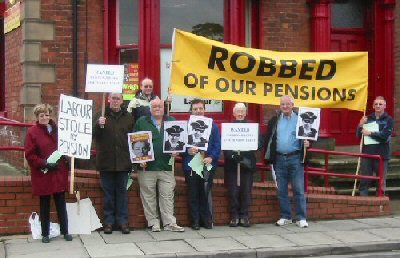 We started outside the Labour Party campaign office where we were interviewed and photographed for the local newspaper (the Hartlepool Mail). We then went to the office door where the reception was not at all welcoming. They refused to open the door or talk with us. This is a sharp contrast to the Labour campaign office at Leicester South who invited us in, listened to our problems and gave us tea and coffee. The Hartlepool office could do with some customer relations training. After one of our party produced a Labour Party card they said they would get someone to talk to us but we had to wait outside on the street. We started outside the Labour Party campaign office where we were interviewed and photographed for the local newspaper (the Hartlepool Mail). We then went to the office door where the reception was not at all welcoming. They refused to open the door or talk with us. This is a sharp contrast to the Labour campaign office at Leicester South who invited us in, listened to our problems and gave us tea and coffee. The Hartlepool office could do with some customer relations training. After one of our party produced a Labour Party card they said they would get someone to talk to us but we had to wait outside on the street.
After a few minutes Kevan Jones, MP for Durham North, came to see us. We had a fairly spirited, but good humoured, discussion in which the old chestnut of “taxpayers should not pay other people’s pensions” was raised, and we countered with the usual examples of MPs, civil service and council pensions for which the taxpayer pays. He said he had signed EDM200 and would speak with Kevin Brennan and bring our points to the attention of the Labour candidate Iain Wright.
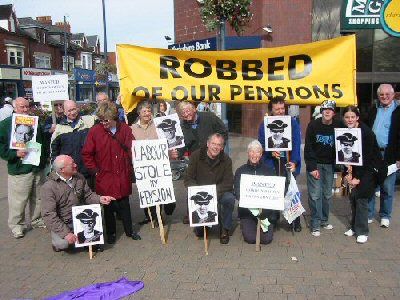 We then moved to the entrance of the Middleton Grange Shopping centre in the middle of Hartlepool where we set up our banner and handed out leaflets to passers-by. We shared the area with campaigners for the Green Party, Fathers for Justice and the UK Independent party. We got a good response from the public and it was surprising how many people knew of the risk to their pensions because of what they had read in the press or seen on TV. Many seemed very concerned. It shows the importance of using the media to keep our case in the public eye. We then moved to the entrance of the Middleton Grange Shopping centre in the middle of Hartlepool where we set up our banner and handed out leaflets to passers-by. We shared the area with campaigners for the Green Party, Fathers for Justice and the UK Independent party. We got a good response from the public and it was surprising how many people knew of the risk to their pensions because of what they had read in the press or seen on TV. Many seemed very concerned. It shows the importance of using the media to keep our case in the public eye.
We contacted the Conservative and LibDem campaign offices and asked to speak to someone. Both said they would come to Middleton Grange, but only David Rendal, LibDem MP for Newbury arrived. He was well aware of the issues and the work that was being done by Steve Webb MP. He said he would talk with Jody Dunn, the LibDem candidate, and pass on our leaflets.
Thanks to everyone who travelled to Hartlepool from all over the UK and in particular to Barry Digwood who organised the day.
* * * * * * * * * * * * * * * * * * * *
Press Release from Community (formerly ISTC & KFAT)
ASW union to push ahead with pension legal action against Government
Community, the union representing the vast majority of ex-employees of the former ASW steel company in Cardiff and Sheerness, has announced that it is to carry on with its legal action against the UK Government on behalf of its members who have lost a large percentage of their expected pension, which they were told was guaranteed. Community’s lawyers will present their case before a High Court Judge at some point between 9th and 11th November 2004. At this point the union will ask the Judge to refer the case straight to the European Court of Justice in Luxembourg.
Whilst welcoming the Financial Assistance Scheme (FAS) announced by the Government on 14th May 2004, which came about following a two year campaign by the union, Community has concluded that the £400 million announced will not provide sufficient retirement income for its members and feels its has no option but to pursue its legal case. If successful, it has been estimated that the case could end up costing the Government anywhere between £1.5 and £2.5 billion.
Community is taking the action because of successive UK Governments’ failure to implement European law to protect workers pensions when their employers are declared insolvent. The law, Article 8 of the European Insolvency Directive, should have been implemented in member states by 1983, but the Conservative Government failed to do so properly, the union believes.
Commenting, Michael Leahy, Community General Secretary, said:
“Earlier this year Community and other unions secured the establishment of the FAS after two years of hard campaigning, but we never believed that the £400 million allocated to the fund was enough and that is why we argued that there should be a review of the fund after three years. However, in the process of discussions with the Government they have made it clear that the review will only cover administrative issues and not the adequacy of the funding. To us, this is unacceptable.
“Some of our members affected have made 30 years of compulsory pension contributions but now face destitution instead of the safe and comfortable retirement they had saved for. The FAS will not provide nearly enough money to change this situation.
“We have been advised by senior Counsel that we have a strong case and we therefore have a duty to pursue the case to a satisfactory conclusion. Therefore, Community has concluded that we have no option but to pursue our legal case against the UK Government on behalf of our members formerly employed by ASW. We shall do this in November, when we will be asking the High Court to refer the case to the European Court of Justice.
“The Pensions Bill is currently before Parliament, and there is a lot in it that we welcome, particularly the Pension Protection Fund. Community would still prefer if the Government were to use this opportunity to right the wrongs of previous Tory Administrations, rather than force us to go to Court. If not, rather than spread the payments sensibly, the Government faces the prospect of having to pay billions of pounds in one lump sum some time during its third term.”
Article 8 of the Insolvency Directive reads:
“Member States shall ensure that the necessary measures are taken to protect the interests of employees and of persons having already left the employer’s undertaking or business at the date of the onset of the employer’s insolvency in respect of rights conferring on them immediate or prospective entitlement to old-age benefits, including survivors’ benefits, under supplementary company or inter-company pension schemes outside the national statutory social security schemes.”
If successful, the case, which is being taken to the European Court of Justice, will set a precedent for the estimated 65,000 other workers throughout Britain who have lost pension benefits when their employers have gone out of business.
* * * * * * * * * * * * * * * * * * * * * *
Pensions Group Notch Meeting 5th September 2004
The meeting was held at Southoe Village Hall near Huntingdon, the venue being kindly organised by Alan Marnes (ex Samuel Jones) with refreshments provided by Pauline Black and Geraldine Thornton
Jacqui Humphrey took the chair in the absence, through illness, of Sally Hayter
Activities since the last meeting were reviewed including John Benson’s 4000 signature petition to the Welsh Assembly and the demonstration at the Leicester South by-election. There have been few events during August because of holidays, but activities will pick up again now
The various meetings with the FAS team were discussed. FAST are working with a fixed sum of money and have no direct influence on the sum. The review in three years time will be procedural only and the sum will not be part of this review. It was agreed that we would continue discussions with FAST but our disapproval of the FAS should always be brought to their attention at any meeting. Letters would be sent to all MPs who signed EDM200 drawing their attention to the inadequacy of the proposed FAS
Alarm Marnes has written to ALL members of the House of Lords and has received many encouraging replies. Other members will write to members who support our campaign.
Dr Altmann and Steve Webb had a useful meeting with the Parliamentary Ombudsman’s team. Submissions are being prepared based on individual cases. These will be presented in late October. This will be followed by a cross-party meeting of several MPs who support our claim (see elsewhere on the News page)
Press coverage remains good; thanks are due to Nina Montagu Smith, Justin Harper and Jeff Prestridge. It is down to us to make the news that will keep the subject in the public eye
The group finances were discussed. It was agreed these should be put on a proper footing so people who cannot attend events can contribute to the costs of banners, costumes, publicity material etc.
Activities for the future include a demonstration at the Hartlepool by-election and, of course, a demonstration at the Labour Party conference in Brighton. Peter Wheeler (ex Kalamazoo) has organised a trailer to drive round the town and there will be another media attractive event on the sea-front. With the holiday season now over the number of events will increase.
The next meeting is scheduled for Sunday 5th December, but this maybe moved depending on other events (e.g. FAST meeting, General Election etc.) keep watching this web-site for details.
* * * * * * * * * * * * * * * * * *
Meeting with the Ombudsman 29th July 2004
Steve Webb MP and Dr Ros Altmann attended a preliminary meeting with the office of the Parliamentary Ombudsman (PO) on Thursday 29th July.
The PO can investigate maladministration by government bodies, but cannot investigate bad legislation. That is for MPs to discuss.
Ros has drafted a document with details of the complaint which many members have forwarded via their MP. If you would like a copy of this document see the document page, or contact us for a Word version. You can download a copy of the complaint form (which is surprisingly short) from the PO website. Note: the PO web-site seems to be frequently off-line.
At the time of writing this report the PO has received about fifty complaints.
The staff at the PO explained the procedures and said they will need further and more detailed evidence before they can decide whether there are grounds for investigation. This evidence will be assembled during August, and when presented the PO hopes to give us a decision on whether they will investigate by September. If they do start an investigation it may take about twelve months before their conclusions are published.
* * * * * * * * * * * * * * * * * * * * * * * * * * *
Meeting with the FAS team 22nd July 2004
A group from the Pensions Action Group met with members of the DWP on Thursday 22nd July to discuss the Financial Assistance Scheme. The agenda for the meeting was:-
* Whilst the Pensions Action Group welcomes the introduction of the Financial Assistance Scheme as an acknowledgement of our case, we have severe doubts about the detail.
* The Group strongly believes that people should receive their full pension entitlement. They were promised an occupational pension by their employers and told by governments of both parties that their pensions were safe, guaranteed and protected by law.
* Everyone should be treated equally and there should be no exclusions.
* Public confidence in pensions has been eroded, and restoration of our promised pensions will send a positive signal.
* There is consensus amongst experts that the proposed size of the assistance fund is far too small, and with a life of twenty years it will only benefit people currently over the age of sixty. We therefore wish to learn how the fund will operate after this period and what other means of funding have been investigated.
* The Group wish to know how schemes which have completed wind-up (e.g. Kalamazoo) will be handled.
* Similarly we wish to know what will happen with people who have already taken buyouts or retired before the scheme wind-up is complete
* The scheme is due for review in three years. We wish to discuss how this review will work and what will be considered.
* We strongly believe that the current mechanism of annuity purchase is not in the member’s best interest (very low rates and practically zero competition amongst providers). Non retired members are hit twice by annuity purchase: more money is removed from the fund to pay existing pensions, and the return on the remainder is severely reduced.
* We wish to discuss the advantages / disadvantages of a centralised fund compared with leaving individual schemes in existence and financing these schemes directly.
* We wish to know how we can be certain that the scheme will act in our best interests. We expect to have a continuing role in its design and implementation.
- - - - - - - - - - - - - - - - - - - -
Principle points from the meeting were:
The PAG strongly expressed the view that people who have had their pensions stolen from them on scheme wind-up should receive their full entitlement. The DWP said the FAS would provide a "significant" part of the pension but would not be drawn on what this meant.
The PAG stated that the scheme should include everyone who has been affected .
There is consensus amongst experts that the fund of £400million over 20 years is totally inadequate in amount and duration to provide the promised pensions
It became obvious that the FAS team are working to distribute an insufficient fixed sum of money in as fair a way as possible. They are not working to discover what is required to give everyone the pensions they were promised.
It was indicated that no firm decisions have been made about how the scheme will operate because research is still being undertaken.
As principal stakeholders, the PAG demanded a continuing role on the working party.
If you would like a full copy of the minutes or the FAS team follow up notes (as Word documents) please contact us.
* * * * * * * * * * * * * * * * * * * * * * * * * *
FAS Consultation Event 21st July 2004
Based on a report by Paul Gill (BUSM)
Pensions Action Group members Peter Wheeler (Kalamazoo), Jean Wade (ASW Sheerness), Brian Mealings (Kalamazoo), Bill Adams (Richards), Brian Bailey (UEF) and Paul Gill BUSM) attended a consultation event organised by the FAS team. The event was also attended by a number of other people with an interest in the scheme from organisations such as the NAPF, OPAS, OPRA, Engineering Employers Federation, Amicus trade union, TUC, CBI, BCC, Age Concern, Pensions Ombudsman, Actuaries and Pension professionals. Of the thirty people attending, five came from the Pensions Action Group.
The meeting was first addressed by Malcolm Wicks who stated that the payments would be less than the PPF but “very substantial”. He would not be drawn on this but said figures based on the £400m and 60,000 people were misleading.
The meeting then split into four groups to discuss:
a) how the FAS scheme might be funded.
b) who should be eligible
c) how to administer the scheme effectively and how
d) how assistance might be provided
It was made clear that the £400m million was a fixed sum which could only be increased by industry contributions. The representative from the Engineering Employers Federation said plainly that no more money would be coming from industry.
The general view was that the sum was too small and the duration too short. The DWP said they would take suggestions from the meeting on board.
The FAS team will be producing notes from this meeting. These will be made available when they are received.
* * * * * * * * * * * * * * * * * * * * * * * * * * *
TUC Pay Up for Pensions Rally, Saturday 19th June 2004
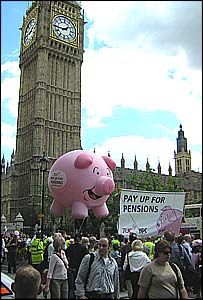 The "Pay Up for Pensions" rally - organised by the TUC - called for a decent retirement for all and a new pensions partnership. Nearly10,000 people, including a contingent from the Pensions Action Group, took part in the event. Led by a large inflatable pink pig called Prudence, the march started at the Embankment and finished with a rally and speeches in Trafalgar Square The "Pay Up for Pensions" rally - organised by the TUC - called for a decent retirement for all and a new pensions partnership. Nearly10,000 people, including a contingent from the Pensions Action Group, took part in the event. Led by a large inflatable pink pig called Prudence, the march started at the Embankment and finished with a rally and speeches in Trafalgar Square
It was the first TUC-organised rally to protest against what has been described as "a growing pension crisis" and "a ticking time bomb". The protest covered many pension issues including the linking of state pensions earnings, the end of defined benefit pensions and, of course, the security of occupational pensions in the event of scheme wind-ups.
TUC General Secretary Brendan Barber said pensions are an issue that is top of the union's concerns. "We have got something like two million of today's pensioners living below the poverty line.
"It's getting clearer that millions more are going to face poverty in retirement because ministers are walking away from promises they made," he added. "We are calling for a new fairer system where everybody plays their part to provide a decent pension for everyone else."
Among the organisers' demands is a long-term guarantee from all the parties that the state pension will keep up with earnings. This would ensure that state pensions keep up with the rate at which salaries are rising.
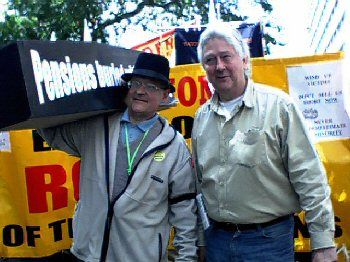 Dave Allen (Ex Dexion) and John Hayter (ex ASW Sheerness) with the famous and well traveled Dexion coffin. Photo by Jean Wade Dave Allen (Ex Dexion) and John Hayter (ex ASW Sheerness) with the famous and well traveled Dexion coffin. Photo by Jean Wade
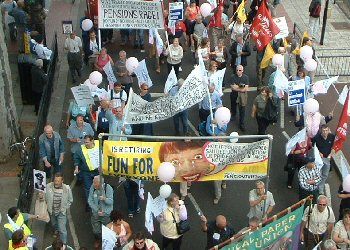 The group representing people who lost their Samuel Jones’ pensions photographed from Hungerford Bridge by Alan Marnes The group representing people who lost their Samuel Jones’ pensions photographed from Hungerford Bridge by Alan Marnes
The Scottish Trades Union Congress (STUC) organised a similar protest in Edinburgh at the same time ending with a rally in the capital's Princes Street Gardens
STUC general secretary Bill Speirs claimed nearly a quarter of people in Scotland would not live to pick up their pension
Fellow speaker, Amicus regional secretary John Quigley called for the government's proposed Pensions Bill to be improved to make employers contribute to their employee's pensions. He also asked for it to strengthen the rights of workers in companies which go bust.
He said: "People have to realise if they want a decent pension they are going to have to pay for it, so we need compulsion both for employees and employers. There are people who have paid pensions for years and now have nothing so the government must take strong action to build confidence into the system."
* * * * * * * * * * * * * * * * * * * * * * * *
March and Petition to the Welsh Assembly, Tuesday 15th June 2004
 A group of 50 former workers from Cardiff's ASW steelplant and other companies marched from Cardiff City Centre to the Welsh Assembly where they handed over a 4,500 signature petition to First Minister Rhodri Morgan. The petition called for greater clarity about how much pension they will receive following the announcement of the £400 million pensions assistance fund. The protest was organized by ex ASW Cardiff employee John Benson. There was excellent coverage from HTV, BBC TV Wales, local radio and the press. A group of 50 former workers from Cardiff's ASW steelplant and other companies marched from Cardiff City Centre to the Welsh Assembly where they handed over a 4,500 signature petition to First Minister Rhodri Morgan. The petition called for greater clarity about how much pension they will receive following the announcement of the £400 million pensions assistance fund. The protest was organized by ex ASW Cardiff employee John Benson. There was excellent coverage from HTV, BBC TV Wales, local radio and the press.
 Plaid Cymru AM Owen John Thomas, who helped organise the 4,500 signature petition is shown here with, from the left, John Benson, Gary Young and Tony Atkinson. Plaid Cymru AM Owen John Thomas, who helped organise the 4,500 signature petition is shown here with, from the left, John Benson, Gary Young and Tony Atkinson.
Owen Thomas said: "What is concerning is that former members of the Allied Steel pension fund are still in the dark as to how much of their pension entitlements will be paid to them.
“While this may appear as detail to the Westminster government it is a matter of continuing concern which has been troubling ex-steelworkers for the past two years. Their request to receive detailed information on their pension entitlement is both reasonable and understandable. The London government should act immediately to allay genuine anxieties."
 First Minister Rhodri Morgan AM, on the right, with ex ASW worker Selwyn Evans, received the petition personally on this occasion and told the steelworkers he had raised the issue with Westminster ministers at "every possible opportunity”. He said: "I raise it with Westminster at every opportunity. Gordon Brown was here last week and I raised it with him." First Minister Rhodri Morgan AM, on the right, with ex ASW worker Selwyn Evans, received the petition personally on this occasion and told the steelworkers he had raised the issue with Westminster ministers at "every possible opportunity”. He said: "I raise it with Westminster at every opportunity. Gordon Brown was here last week and I raised it with him."
The petition, given below, calls on the Assembly, together with the Scottish parliament and English local authorities, to put pressure on Westminster to ensure those who have lost out are compensated in full.
Petition for Restoration of Full Pension Rights
We the undersigned, former workers of ASW Cardiff & Sheerness, UEF, Dexion, Kalamazoo and others totalling 60,000 in all, call upon the Westminster Government to issue a detailed statement illustrating how they will restore and pay out our full pension entitlements.
Whilst we welcome the Government’s decision to set aside £400 million to make retrospective compensation for the loss of our so called ‘guaranteed’ pension subscriptions, we seek assurance that this sum is indeed sufficient to meet the full pension entitlements over the years of all those concerned.
We call upon the National Assembly for Wales, the Scottish Parliament and relevant English local authorities to bring pressure upon the Westminster Government to ensure that justice is delivered.
* * * * * * * * * * * * * *
Pension Action Group Protest Saturday 22nd May 2004
The group welcome the announcement of the £400million fund established by the government to aid people who have lost their pensions through scheme wind-ups. We do, however, have many concerns and questions regarding the structure and implementation of the scheme.
The protest on May 22nd was based of the theme of the suffragettes. Our suffragette ladies carried symbolic loaves of bread because the government’s recently announced £400 million fund over 20 years, whilst welcome, when distributed to the 60,000 people who have lost most of their pension entitlement amounts to about one pound a day; just enough to buy a loaf of bread.
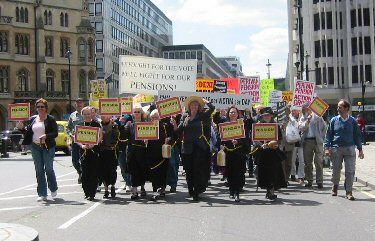 The event started with a march, lead by eight brave ladies, from Tothill Street, round Parliament Square to Downing Street. We were stopped by the police but after some discussion we were allowed to continue on our way to Downing Street. The event started with a march, lead by eight brave ladies, from Tothill Street, round Parliament Square to Downing Street. We were stopped by the police but after some discussion we were allowed to continue on our way to Downing Street.
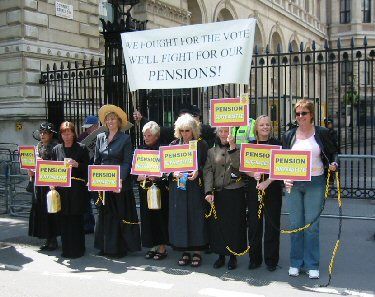 Here the eight ladies were allowed to “chain” themselves (albeit with plastic chain) for photographs whilst the rest of the march watched from the other side of Whitehall. The Suffragettes “chained” up with loafs of bread at Downing Street were, from left to right, Jenny Allen (Dexion), Val Day (Dexion), Jacquie Humphrey (Dexion), Jean Wade (ASW Sheerness), Pat Sargent (Dexion Gainsborough), Joan Spencer (Dexion Gainsborough), Tina Raven (Kalamazoo) and Chris Atersuch (Kalamazoo). Thanks to all of these for being good sports. Here the eight ladies were allowed to “chain” themselves (albeit with plastic chain) for photographs whilst the rest of the march watched from the other side of Whitehall. The Suffragettes “chained” up with loafs of bread at Downing Street were, from left to right, Jenny Allen (Dexion), Val Day (Dexion), Jacquie Humphrey (Dexion), Jean Wade (ASW Sheerness), Pat Sargent (Dexion Gainsborough), Joan Spencer (Dexion Gainsborough), Tina Raven (Kalamazoo) and Chris Atersuch (Kalamazoo). Thanks to all of these for being good sports.
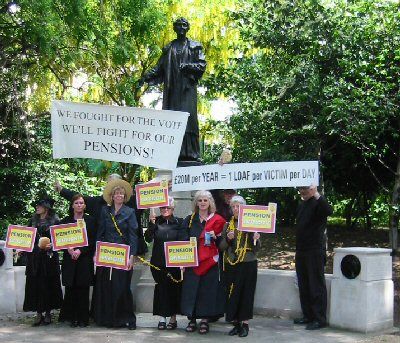 After the photographs the march was allowed to continue back down Whitehall, round Parliament Square and along Millbank to Victoria Tower Gardens where there is a statue of Emmeline Pankhurst. After the photographs the march was allowed to continue back down Whitehall, round Parliament Square and along Millbank to Victoria Tower Gardens where there is a statue of Emmeline Pankhurst.
We must praise the Metropolitan Police for their courtesy, patience and good humour. Although we arrived unannounced they quickly turned our unofficial march in to an official march and gave us escort officers and police vehicles and much help with practical details such as traffic control.
- - - - - - - - - - - - - - - - - - - -
Comments from Pat Sargent, one of the suffragettes:
This symbolic gesture was conceived when, like the disenfranchised suffragettes, we were being totally excluded from the Pensions Bill. Despite our having helped drive it and Government acknowledgement that legislation's failed, we're still, effectively, excluded. Some, totally, others through being 'offered' what - without real guarantee - could still, for some, prove peanuts or the price of a loaf of bread a day! Suffragettes fought for justice in respect of voting rights, we'll continue the fight for justice in the restoration of our pension rights.
We don't want 'assistance' or a 'hardship' fund - we're 'proper' people, so we just want what's rightfully ours & what we've paid for (as even Malcolm Wicks conceded on Wednesday). We want our pensions - you know, the ones we were all assured were already protected by law! Restoration of which is easily affordable, especially if Government can use hundreds of millions of extra pounds of our, taxpayers', money to additionally benefit, in tax relief, the highest earners who have accumulated £1.5m pension pots!
Remember, the suffragettes succeeded....... their cause was just too!
* * * * * * * * * * * * * * * * * *
All Night Vigil 18th/19th May 2004
Compiled from reports from Alan Marnes and Dave Allen
We started at around 15:00hrs with the sun was beating down, and had to set up our base camp on the opposite side of the road to the St. Stephen’s Gate, (the public entrance to the House), as the police wouldn't let us do our thing on their side of the road.
Our banners were tied to the railings of the Westminster Abbey fence; they made a good show, especially the candles and lights provided by Dave Allen. His replica bombs complete with firework type sparklers were a master stroke.
The banners did their job, our first visitor was Mike Penning, Cons prospective candidate for Hemel Hempstead. He explained that David Willetts MP had asked him to visit us to explain his position, and outline the Conservative tactics for the debate. Mike Penning went back into the house, but soon returned with Edward Leath MP, and much welcome bottles of water.
As the Parlimentary day drew to a close we were joined by Adam Price MP who gave a very good illustration of where he thought the Parliamentary procedures would take us as the Bill progressed. We were later joined by Steve Webb MP who outlined his Amendment proposals and encouraged us with his usual enthusiasm. Before he left for an early night to prepare for his assignment the next day he organised some more refreshments of coffee for us all.
As darkness fell the candles and lanterns took effect and the Press photo-shoot took place.
A security man from the Cathedral tried to move us on, and he called his officer of the church, who just happened to be a trustee of the Abbey’s pension fund. We spent over half an hour talking to him before he said that as long as we took down our banners before 07:30 we could stay. This was the first time they had ever permitted their property to be used in that way, we think it was Dave's charm that that won him over.
We felt slightly over-shadowed by the firework event taking place by the London Eye to celebrate the London Olympic bid.
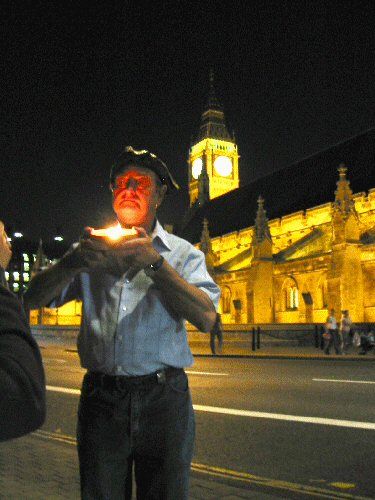 As night drew on and all the candles were lit and fold up chairs suitably placed . When the press turned up Dave again took to the task of making the most impact. His portrayal of Dickens's Oliver Twist on his knees with a begging bowl albeit with a lighted candle and his trusted tricorn hat made a good picture As night drew on and all the candles were lit and fold up chairs suitably placed . When the press turned up Dave again took to the task of making the most impact. His portrayal of Dickens's Oliver Twist on his knees with a begging bowl albeit with a lighted candle and his trusted tricorn hat made a good picture
The lights went out on the Cathedral and the House of Commons just after midnight and we just had the street light to keep the vampires away, along with the scented candles that Dave had salted away from his wife Jenny's store. It was a job to keep up with changing the candles all night as Dave's trusty lighter failed, and if we weren't careful there were going to be some burnt fingers by the morning.
We took it in turns to wander over the Westminster Bridge to use the facilities in the County Hall hotel room that Dave had arranged. This was a most welcome opportunity to top up with tea or coffee and I'm sure that the reception staff wondered what was going on with a steady stream of shady looking characters going back and forth all night.
The traffic never ceased; loads of drivers gave a toot and put their thumbs up. It was amazing the amount of buses that run through the night.
Dawn came at around 04:30 and the birds started to sing, the long night was being overtaken by bright blue sky. At 06:00 the café round the corner did a roaring trade from tea, coffee and bacon buttie's as we refreshed our frail bodies.
As promised, at 6:00am we moved the banners along the road to near the statue of King George V. When the Archbishop of Canterbury (Rowan Williams) walked by at 07:30am he asked if we had been there all night and seemed to accept that ours was a very just cause.
The visits from MPs started again, the first of which was Sue Doughty, MP for Guildford (where the Mayflower group are in wind up). She asked lots of questions and quoted many of the answers in the debate. Later we were joined by Kevin Brennan MP. He gave a good assessment of what he considered to be a successful breakthrough in a long campaign and the way ahead to achieve the required final result.
The camp disbanded at midday as we felt by that time all MP's would be in the House preparing for Question Time and we had done everything we had set out to achieve.
* * * * * * * * * * * * * *
Midnight Vigil 18th/19th May 2004, short report
This report is going to be very short as everyone who took part needs a good night sleep. A full report will follow in a day or so.
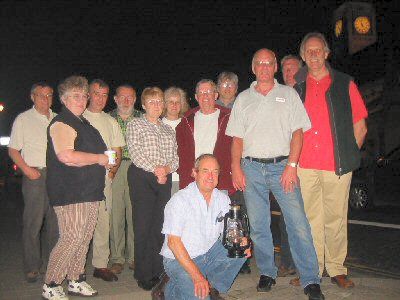 First of all many thanks to Dave Allen from Dexion, (seated in the front), who organised the event, and everyone who attended. It was an interesting, and effective, way of expressing our disapproval of some of the detail in the government’s proposal. Many MPs we spoke with thought the whole issue had been resolved until we told them the truth: i.e. the proposals provided just six pounds per week for every person who had lost their pension, roughly the cost of a loaf of bread a day. People tend to be impressed by the big numbers (wow, £400 million!) without realising this is spread over twenty years and 60,000 people. You need to look at the details. First of all many thanks to Dave Allen from Dexion, (seated in the front), who organised the event, and everyone who attended. It was an interesting, and effective, way of expressing our disapproval of some of the detail in the government’s proposal. Many MPs we spoke with thought the whole issue had been resolved until we told them the truth: i.e. the proposals provided just six pounds per week for every person who had lost their pension, roughly the cost of a loaf of bread a day. People tend to be impressed by the big numbers (wow, £400 million!) without realising this is spread over twenty years and 60,000 people. You need to look at the details.
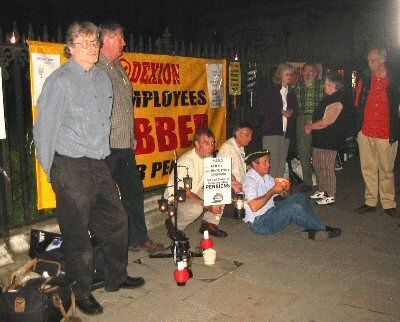 The vigil started at 3pm on Tuesday 18th May and ran through to late morning on Wednesday 19th May. All told about twenty people from various companies took part. Our good luck with weather continued; it was a very mild and dry night. A room had been booked with one of the hotels in County Hall to provide rest, refreshments and (most important) toilet facilities. The vigil started at 3pm on Tuesday 18th May and ran through to late morning on Wednesday 19th May. All told about twenty people from various companies took part. Our good luck with weather continued; it was a very mild and dry night. A room had been booked with one of the hotels in County Hall to provide rest, refreshments and (most important) toilet facilities.
We were visited by many MPs who discussed the issues and offered their support. Particular thanks to Steve Webb who supplied very welcome coffee and tea for the campaigners.
* * * * * * * * * * * * * * *
Government Amendment, a Reality Check
The government amendment is encouraging but it is worth doing some back of an envelope calculations to do a reality check of the government’s figures. These figures are nowhere near the accuracy of those produced by Dr Ros Altmann, but they come out in the same ballpark and can be used to quickly explain the position to the media and your MPs.
An average pension is £5,000 pa, this may seem low but it is the arithmetic mean of employees and people already deferred (who generally have small entitlements).
Pensioners retire, on average, for 15 years (i.e. on average you live to 80).
Each person will thus draw £5k x 15 = £75k from the fund
Total for 60,000 people is £60k x £75k = £4.5 billion
Oddly enough this is just about what Gordon Brown takes from his pensions stealth tax every year.
This money is not required as a lump sump, but will be paid over 50 years giving an average yearly rate of £90million. The actual figure will start small, rise to a peak then slump down again as the original recipients die.
Dr Altmann came out with around £80million pa and the unions have suggested a figure of £60 million pa. This shows that the very quick calculation above is in the right ballpark
The government’s proposal of £400 million over twenty years gives £20 million per annum. This is out by a factor of at least three in value and out by a factor of 2.5 in length.
It is also worth pointing out that spread over the whole of the group the income works out as just £333 per person per annum for twenty years. Yes, just over three hundred pounds a year; about six quid a week!
Governments can make themselves sound very generous (so many billion into the NHS, so many hundreds of million for us) but the simple fact is the detailed reality is often hidden by the smoke-screen of the impressive total.
On the good side, it is most certainly a step in the right direction, and we should use Malcolm Wick’s quote on Radio 4 MoneyBox on every possible occasion:-
“it's a major step forward that we've announced this week in terms of helping this group of people, they've effectively had their money stolen from them and through no fault of their own and we think it's right that the public should support them and that’s what we're going to do”.
The government have said they will review the figures in three years. Because the payment rate starts low, (covering just the people who retire each year) it is probable that £20million pa will be adequate for this period of time. Hopefully the review will bring out the real requirements. It will be interesting to see what the House makes of this during the debate this week.
We must push our MPs to make sure they understand what the figures mean and ask them how they intend to vote. Phone them at the House as soon as possible. The number is: 02072-193000
We must push them to include everyone who has lost their pension. The number of wind-ups by solvent employers is a small part of the total so their exclusion seems petty.
We must continue to protest. We have won a small victory but not the war.
* * * * * * * * * * * * * *
The National Association of Pensions Funds (NAPF) ran an online poll about pension windups. 90% of voters said we should receive our pensions. When the poll closed there were 744 votes, 595 of whom thought we should be compensated by the government and 72 said we should be compensated by the PPF. Only 10% of voters (77 votes) said we should not receive any compensation.
* * * * * * * * * * * * * * *
A Chink of Light at the End of the Tunnel or a Train Coming the Other Way?
Tony Lloyd, Labour MP for Manchester Central, asked Tony Blair about pension scheme wind-ups during Prime Minister’s question time on Wednesday 21st April 2004. The reply, quoted below, was more encouraging than Andrew Smith’s mantra of “we do not want to raise false hopes”
Tony Lloyd: On rip-off Britain, is my right hon. Friend aware that the clearing banks are believed to hold some £15 billion in assets from people whose accounts they cannot trace? Given that those banks absorb those assets into their profits, is there not an overwhelming case for a windfall tax to take away the gains from that exercise in corporate greed? Perhaps some of that money should be deployed to prop up people in failed pension schemes such as Allied Steel and Wire, whose futures have been jeopardised by corporate incompetence within the private sector.
The Prime Minister: I think that my right hon. Friend will acknowledge that there are two separate issues. First, on unclaimed assets, we support the efforts of the British Bankers Association, the Building Societies Association and National Savings and Investments either to try to reunite owners with their assets or to make sure that that money is used in a different way, although those bodies have fiduciary obligations to their various stakeholders. Secondly, we are actively considering the position of people who, having been forced to contribute to occupational pension schemes, find that all the money that they have invested yields absolutely nothing. We are examining what we can do in such special cases, and, in the context of the current debate on pension protection issues and legislation, I hope that we can come forward with the solution.
This encouraging statement was followed by a slot on the BBC 10 o’clock News which contained a very up-beat interview with Andrew Smith (Secretary of State for Work and Pensions).
The BBC website has three reports on these announcements which can be found here, and here and here.
The press has also been commenting with positive articles in The Times (paywall), (twice), The Independent, The Telegraph and The Mail. You will have to subscribe to the Telegraph on-line service to see their article but this is free.
Although all of this is very good news we must be careful not to celebrate until we see what is actually proposed. It would seem likely that something is likely to appear before the Third Reading, (expected around 10th May), to head off the amendments proposed by Kevin Brennan MP. To be really cynical you could read Tony Blair’s statement as only applying to people who were compelled to join a pension scheme AND lost everything. The devil will be in the detail and we must keep on making ourselves heard.
* * * * * * * * * * * * * * * *
Where's the Thief Protest Saturday April 17th 2004
There's no 'f' in pensions and there's one 'f' in thief!
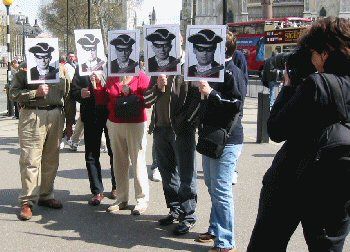 About eighty people turned up at the end of Tothill Street for our April protest. Starting about 1:15pm we marched off down Victoria Street, the main road from Parliament Square down towards Victoria Station. At the junction with the Broadway (just by New Scotland Yard) we did our usual spread across the road junction blocking traffic in all directions. There was a policeman on the corner who stood and watched us but made no attempt to intervene. About eighty people turned up at the end of Tothill Street for our April protest. Starting about 1:15pm we marched off down Victoria Street, the main road from Parliament Square down towards Victoria Station. At the junction with the Broadway (just by New Scotland Yard) we did our usual spread across the road junction blocking traffic in all directions. There was a policeman on the corner who stood and watched us but made no attempt to intervene.
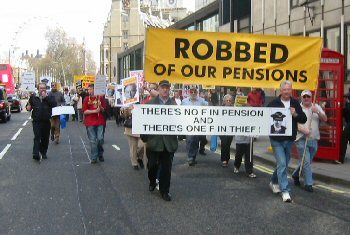 Whilst we were blocking the road a car tried to force its way through the group. There was an altercation which resulted in one of our group being taken to Belgravia Police Station. The police, as ever, were sympathetic and supportive despite this unfortunate occurrence. Whilst we were blocking the road a car tried to force its way through the group. There was an altercation which resulted in one of our group being taken to Belgravia Police Station. The police, as ever, were sympathetic and supportive despite this unfortunate occurrence.
In general the public were, with a few exceptions, on our side, and the driver of a white van at the head of the queue actually got out and sat down on the road with us.
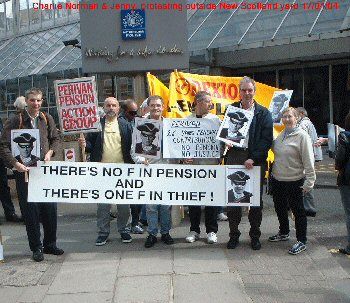 After about twenty minutes we left Victoria Street and walked down the Broadway to New Scotland Yard. A letter asking the Chief Commissioner to investigate the theft of our pensions was handed in. Note the carefully worded banner. The picture is Gordon Brown After about twenty minutes we left Victoria Street and walked down the Broadway to New Scotland Yard. A letter asking the Chief Commissioner to investigate the theft of our pensions was handed in. Note the carefully worded banner. The picture is Gordon Brown
After the letter had been handed in those who were not bound by previous travel arrangements marched down to Belgravia Police Station to demonstrate our support.
The protest achieved its aim, but the actions of two unsympathetic and rude people in a car cast a bit of a damper on the day.
Many thanks to everyone who turned up and Sally and John for organising the day.
* * * * * * * * * * * * * * * * * *
NAPF Statement 1st April 2004
The NAPF believes that, in the interests of fairness, those who have lost most or all of their pension due to company failure should be compensated by the government. The compensation should be equivalent to what each individual would have received had the PPF been in operation. This does not mean the PPF should be retrospective.
NAPF Press Office
It is also encouraging to see on the NAPF web-site that 91% of people think we should receive compensation, either from the government (81%) or from the PPF itself (10%)
* * * * * * * * * * * * * * * * * * *
March Protest, Thursday 25th March 2004
Some fifty people turned out for the March protest, marching from Tothill Street round Parliament Square to the Treasury where we demonstrated on the steps. The group then returned to Whitehall, blocking the traffic for several minutes.
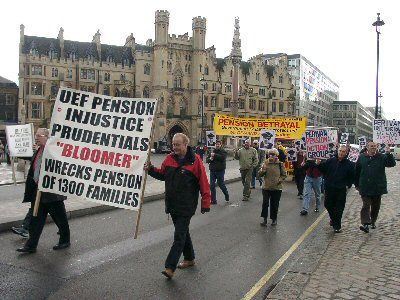 The theme of the day was “Robbed of our Pensions” and the demonstrators were well turned out with Dick Turpin masks and outfits. The theme of the day was “Robbed of our Pensions” and the demonstrators were well turned out with Dick Turpin masks and outfits.
Dave Allan (from Dexion) was very well turned out again in his best Dick Turpin outfit, the only thing he was missing was Black Bess and a blunderbuss, but under the present circumstances it’s probably as well they were left at home! Special thanks to Jean Wade for the Highway Robber’s masks, Oh you were a picture when the black ran out of the paper..... you really had beautiful black eyes.......you made our day.
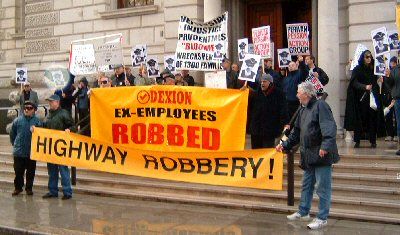 We have been very lucky with the weather on all our protests to date, but on this occasion we had to deal with the lot; rain wind and snow, but it didn’t dampen our support and it just goes to show those in high places that we won't go away. Banners make passable umberellas! We have been very lucky with the weather on all our protests to date, but on this occasion we had to deal with the lot; rain wind and snow, but it didn’t dampen our support and it just goes to show those in high places that we won't go away. Banners make passable umberellas!
As in the past the police were very understanding and supportive and we would like to thank them, and the members of the public, for the patience and understanding they showed
Thanks to everyone who turned out on a working day, and special thanks to John and Sally Hayter for organizing the event.
Watch this space, or join our e-mail group, for details of our next event
* * * * * * * * * * * * * * * * * * * * * * * *
Pensions Action Group Meeting with David Willetts, Thursday 4th March 2004
Notes taken by Joanne McCulloch of Professional Pensions
David Willetts: All of us across all parties when faced with constituents who have saved for 55 years only to be left with little or no pension, you realise you have to do something. We raised the issue during opposition time and again after the second reading of the Pensions Bill. That is the background. What is it you want to raise with me?
John Hayter: All of us in this room have not lost our pension - it has been taken from us to pay for other people's pensions. That, is as a result of the 1995 Pensions Act from the previous Conservative government. This government as well has done absolutely nothing. If they had done so from 1997 onwards, we would not be sitting here now.
DW: We could sit here and have a historical argument - and this is something on your website as well. We feel some of the blame that is heaped on the 1995 Pensions Act is unfair. The party does believe that when we have made a mistake or something has gone wrong or something needs to be changed we should say so. Some of the blame is misplaced. There have been changes to the MFR. This preoccupation with the 1995 Act is not right and it creates a problem for us.
JH: The MFR is completely inadequate and the priority order on windups. That has robbed us of our pension - our deferred pay. I'm sorry, but there is no way you can get away from that. That does not excuse the current government. We have been robbed and we look to the government for justice. The EDM200 was an opportunity for the Conservatives to sign it. Instead only 20 have signed it, which is very disappointing. Why don't the Tories join the mutiny and sign 200?
DW: Because, as a responsible Opposition, we could not support an EDM that could have been taken as meaning full retrospective compensation paid for out of public expenditure. That was for lots of reason. One was that we didn't know what the size of the Bill was. Ros has been making some progress on this, but we didn't know how many people were affected or what the scale of the loss was. It would have been impossible for me to get it past my colleagues - and they would have been quite right in saying how can we commit ourselves to an expenditure commitment that could last for 50 years - a commitment that is open-ended and ill-defined. Equally, I do not think we can sit and do nothing. We are interested in hearing proposals put forward by the likes of Frank Field.
Ros Altmann: This is the fault of successive governments. They told people their pensions were safe when practically, they weren't. What I don't understand is why the taxpayer shouldn't stand behind that kind of mistake. It wasn't meant to happen, but why can't you use taxpayers money to rectify something like this? Using unclaimed assets is an attractive option, but we both know the banks and building societies will not give up that money easily.
DW: We are open to proposals about how the problem can be tackled. EDM200 would have been committing us to something I don't think I can commit the party to.
JH: We have a problem with that because you write an open check for justice for the people of Iraq. How much was that going to cost - we didn't know - but the Conservatives signed up with Labour for the war in Iraq. What about justice for decent, hard-working people in this country? You yourself want to restore the confidence in pensions, but what confidence does the youth have in the system? None.
DW: That is a very powerful argument. But the best way we can use this
meeting is to see what morals there might be. Maxwell happened and there was a very imaginative way identified of using contracting out rebates. But we want to listen and hear about what you think might be done.
RA: There are assets in the scheme if you don't have to buy annuities you won't have to pay anything up front. We know the money is in the DWP budget unallocated - £150m to £200m a year. Politically, you could simply back the principle and leave it up to the government to find out where the money comes from.
DW: You deserve to get assistance because of what you have gone through and I think it will happen. The government can see the looming prospect of us, Labour rebels, the Liberal Democrats combined to defeat them. What I am not sure about, and what I can't commit my party to is to re-pay up to the full pension what you would have earned from now until the last person who has any entitlement to a pension. What we are looking for is compromise solutions that might help tackle this solution.
Nigel Waterson: I don't have any red boxes or chauffeur driven cars. What annoys me is that the government has thousands of people - this massive resource - but won't do anything about the problem. We are the only ones that have tabled amendments and put down any ideas.
JH: Let's go back to Maxwell. They went in with £100m of tax to enable the pension fund to pay out the pensioners. This came out of taxpayers money, so why then doesn't the taxpayer initially pay for the victims, then that gives the government plenty of time to look at Frank Field¹s ideas and Ros Altmann's ideas to pay back the Treasury. Why string everyone along and at the same time say you have upheld Conservative Party values? We've worked hard to stand on our feet.
DW: That is a very constructive point. One thing we will take away from this meeting is that we will table an amendment to delay the full purchase of annuities until a solution can be worked out.
* * * * * * * * * * * * * * * * * * *
Pensions Bill Second Reading, Tuesday March 2nd 2004
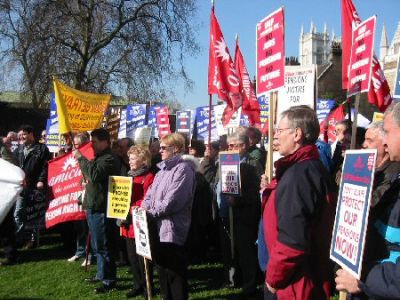 The Metropolitan Police estimate that over 750 people were involved with the pensions protest held on College Green outside parliament on Tuesday 2nd March. All praise to everyone who had to take holidays and suffer the extra cost of midweek travel. People came to the protest from all over the British Isles, with representatives from England, Scotland, Wales and Ireland. The protest was held by members of the ISTC & Amicus unions plus members of the Pensions Action Group who were all protesting about the loss of their pensions caused by the flawed 1995 Pensions Act. We seem to be making a habit of good weather for our protests! The Metropolitan Police estimate that over 750 people were involved with the pensions protest held on College Green outside parliament on Tuesday 2nd March. All praise to everyone who had to take holidays and suffer the extra cost of midweek travel. People came to the protest from all over the British Isles, with representatives from England, Scotland, Wales and Ireland. The protest was held by members of the ISTC & Amicus unions plus members of the Pensions Action Group who were all protesting about the loss of their pensions caused by the flawed 1995 Pensions Act. We seem to be making a habit of good weather for our protests!
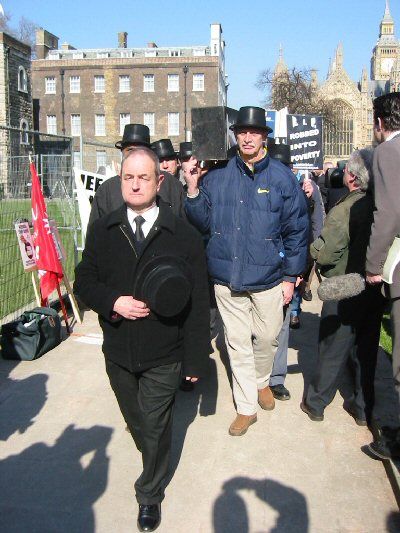 Among the protesters were people from Dexion at Hemel Hempstead and Gainsborough who brought along their coffin and pall bearers to mourn the death of occupational pensions. Among the protesters were people from Dexion at Hemel Hempstead and Gainsborough who brought along their coffin and pall bearers to mourn the death of occupational pensions.
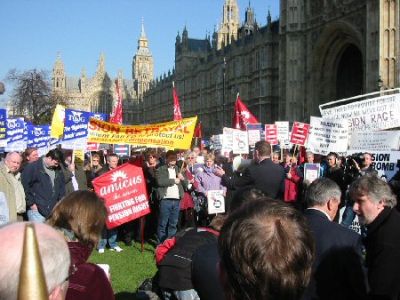 Many people spoke to the group including Ken Penton (ISTC), Derek Simpson and Brian Gallagher (Amicus), Dr Ros Altmann, Kevin Brennan MP and Adam Price MP. (the originator of the unions’ legal action under Article 8 of the European Insolvency Directive). There was good media coverage of the day, including very powerful interviews with John Benson (ex ASW Cardiff) and Dr Ros Altmann on GMTV. The presenters were clearly shocked, and their reaction was very good publicity. Many people spoke to the group including Ken Penton (ISTC), Derek Simpson and Brian Gallagher (Amicus), Dr Ros Altmann, Kevin Brennan MP and Adam Price MP. (the originator of the unions’ legal action under Article 8 of the European Insolvency Directive). There was good media coverage of the day, including very powerful interviews with John Benson (ex ASW Cardiff) and Dr Ros Altmann on GMTV. The presenters were clearly shocked, and their reaction was very good publicity.
After the protest, many of the protesters were admitted to the House of Commons to directly lobby their MPs.
The protest was held because the second reading of the Pensions Bill was being made in the House on the same day. Whilst this will provide an insurance fund to protect people’s pensions in the future it will do nothing to rectify the losses suffered by ex employees of ASW Sheerness and other people. The unions and the Pensions Action Group are pressurizing MPs to ensure that amendments to correct this omission are made at the committee stage or at the third reading.
Kevin Brennan MP, Derek Wyatt MP, Frank Field MP, Adam Price MP and Steve Webb MP all spoke eloquently in favour of payment of the pensions which had been promised. The Conservative speakers were slightly more guarded, preferring Frank Field’s unclaimed assets proposal to payment from public funds. Nobody spoke against compensation, but government spokesmen Andrew Smith MP and Malcolm Wicks MP did their usual “not wanting to raise false hopes” act. The Hansard report on the debate can be found here.
There are several more stages the Bill has to go through in the House, including the committee stage (where ammendments are added), the third reading and the House of Lords. Further protests will be held.
Early Day Motion EDM200 has reached 250 signatures including well over half of the Labour Backbenchers and almost exactly half of the MPs in the house who are able to sign EDMs. The 150 Labour MPs who have a government position are not allowed to sign EDMs
* * * * * * * * * * * * * * * * * * * * * * * * * * * * *
Pensions Bill Publication
The long awaited Pensions Bill was published on Thursday 12th February 2004. As feared it made no mention of the 50,000 or so people who have already lost most, in same cases all, of their pension. The DWP Press Release can be accessed on the DWP website here. It can also be found on our Documents page.
The details of the Pensions Protection Fund can be found here:
The full bill will be available here. If it is like previous parliamentary bills it will be very heavy reading
We had good coverage on the day; Don Banham of Dexion appeared live on BBC Breakfast Time along with Cliff D’Arcy of the Motley Fool website. Don did an excellent presentation of our plight. Cliff D’arcy wrote up a very good report on their website. His report can be found on our Media Comments page. There was also good coverage of our campaign on BBC News, ITN News, Sky News, Today on Radio 4 and many local radio stations. Newsnight, on BBC2, ran a 20 minute slot in which Dr Ros Altmann gave a powerful explanation of our plight and why we should receive the pensions we have been promised. Malcolm Wicks was also on this programme and did his usual “do not want to raise false hopes” routine but seemed slightly more conciliatory than usual. Andrew Smith used the same script on BBC Breakfast Time
* * * * * * * * * * * * * * * * * * *
Protest at the Royal Courts of Justice, Friday 13th February 2004.
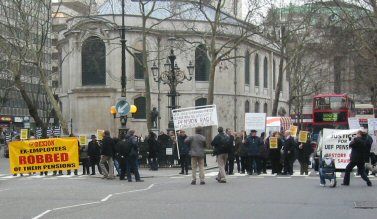 Over fifty people turned up to demonstrate on the Strand. There is a convenient zebra crossing opposite the Courts which allowed us to block the traffic. We stopped the flow of traffic in both directions for about half an hour. As before it took the police fifteen minutes to arrive. After courteous and civil discussions, they agreed we could stay for a short time. Public response was again surprisingly good. Over fifty people turned up to demonstrate on the Strand. There is a convenient zebra crossing opposite the Courts which allowed us to block the traffic. We stopped the flow of traffic in both directions for about half an hour. As before it took the police fifteen minutes to arrive. After courteous and civil discussions, they agreed we could stay for a short time. Public response was again surprisingly good.
* * * * * * * * * * * * * * * * * *
Cardiff Protest and Petition to the Welsh Assembly
John Benson, ex ASW Cardiff, organised a petition and protest march to the Welsh Assembly.
The march was held on Wednesday 4th February 2004, from The Hayes, City Centre, Cardiff to the Welsh Assembly.
The Welsh Assembly has cross party support for ammendments to the Pensions Bill to include compensation and the petition calls for representation to the national parliament. The text of the petition was:
The National Assembly was established by the UK Government to provide a dedicated democratic voice for the people of Wales. There is cross party support in the Assembly for the view that the Pensions Bill currently before parliament should be ammended so that retrospective payments be made to guarantee the full pension entitlement of those whose pension trusts are in the wind-up process.
We, the undersigned, former workers of Cardiff Allied Steel and Wire and members of the general public call upon the National Assembly for Wales to make further representations to the UK Government urging them to carry out the wishes of the people of Wales with reference to the aforementioned
The leader of the Welsh Assembly, Rhodri Morgan, would not accept the petition personally. He later made a press release which can be found on our documents page. The petition was handed to the Plaid Cymru members of the Assembly who later submitted it to the Assembly
* * * * * * * * * * * * * * * * * * * * * * * * * * * * *
Protest at Oxford Circus Saturday 10th January 2004
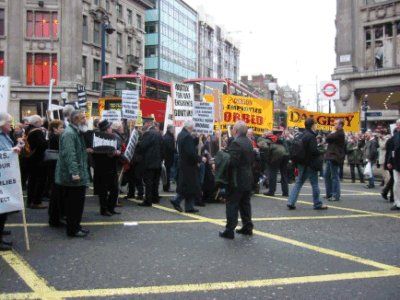 Between 150 and 200 people who have lost the pensions promised to them by their employers turned up to protest at Oxford Circus. People had travelled from all over the country to take part, arriving from Wales, Birmingham, East Anglia and even Scotland. Dexion employees even brought a symbolic black coffin complete with supporting undertakers to represent the death of occupational pensions in this country Between 150 and 200 people who have lost the pensions promised to them by their employers turned up to protest at Oxford Circus. People had travelled from all over the country to take part, arriving from Wales, Birmingham, East Anglia and even Scotland. Dexion employees even brought a symbolic black coffin complete with supporting undertakers to represent the death of occupational pensions in this country
Spot on noon we moved out into the centre of Oxford Circus blocking traffic in all directions in Regent Street and Oxford Street. Several people then sat down in the road whilst the group made lots of noise with chanting, whistle and hooters.
There was one rather bemused lady constable at the junction when we started and it took fifteen minutes for reinforcements to arrive. The police were surprisingly tolerant and when they realized that we were not indulging in any malicious damage we came to an agreement that we would leave promptly at 12:30 without any trouble. Overall our protest stopped the traffic in the area for thirty minutes.
After the sit-down, Dexion workers led a march with their banners and coffin up and down the pavements of Oxford Street handing out more flyers along the way.
There were many many spectators on foot, and flyers were handed to out to those we could reach. Many people even asked for them. Everyone expressed sympathy for our cause and the general view was “good on yer”. The BBC, who were filming the event, went down the queue of cars talking to drivers and passengers and seeing what they thought. Very surprisingly the view was again one of support, not anger. Despite inconveniencing many people we seemed to have gained, not lost, public support.
We, and the police, were concerned about the emergency services and we would obviously have cleared immediately had any appeared. In practice, though, because we had closed all four roads, each had a totally empty lane which emergency vehicles could have used with no delay at all.
Television crews from BBC, ITV and Sky were present and we made national evening news on these channels. Sky News also did a live interview after the event. The Japanese state broadcaster NHK also had a crew present. They are making a documentary for Japanese TV about the collapse of pensions in Britain.
You can see what BBC Online said about it here. they even included a link to our web-site.
There will be a one hour program on pensions in the middle of 2004 (date yet to be fixed). The company producing this has followed our activities since Summer 2003, they were at Bournemouth and the Pensions Summit, and they were filming again in Oxford Circus. Should be an interesting programme.
Reporters from the newspapers and pensions journals also attended. The Telegraph photographer had arranged to use a room overlooking the junction so he could shoot from above.
It was a really successful day. Thanks to everyone who turned up (and those forgotten ones who stay at home looking after dogs, cats and children). Thanks to the police for their tolerance and to John and Sally Hayter for organizing the event.
A reminder to Tony Blair, Andrew Smith and Malcolm Wicks:
WE ARE NOT GOING AWAY.
* * * * * * * * * * * * * * * * * * * * * * * * * * *
Report from Peter Humphrey of Dexion Action Group
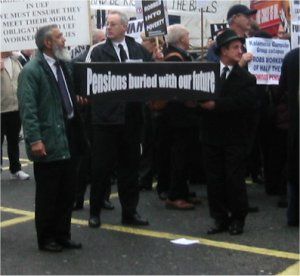 As far as I was concerned Saturday turned out to be a very successful demonstration in everything that was done. The turnout from various companies was excellent, supported with groups from Dexion, ASW, Samuel Jones, Kalamazoo, Salvage Association, Pervian White Dove, UEF, Dalgety swelling the numbers to approx 200. Well done to everyone who came along. As far as I was concerned Saturday turned out to be a very successful demonstration in everything that was done. The turnout from various companies was excellent, supported with groups from Dexion, ASW, Samuel Jones, Kalamazoo, Salvage Association, Pervian White Dove, UEF, Dalgety swelling the numbers to approx 200. Well done to everyone who came along.
At noon the first wave of protesters moved into Regent Street and promptly held up the traffic long enough for the remaining group to join them. The whole group them moved into the centre of Oxford Circus crossroads and initially stood there. It didn’t take long to affect a complete shutdown of traffic movement as far as one could see. What with the banners, placards, drums, trumpets, whistles etc it was some spectacle and very moving.
Right from the off we had photographers, TV cameras and reporters eager to catch the spirit of the demonstration and from all due accounts this was flashed around the country as a pension demonstration in London, going out live on Sky News at one point and reported on other channels in their News slots.
Ann Montgomery and Jacquie Humphrey from Dexion had respectively suggested the dress code for the day be black and the carrying of a coffin to signify our losses. From comments that were heard this went down very well and we have been urged to use it again. Certainly it caught the eye of the various cameramen that were present and was clearly seen in TV reports.
The demonstrators then had a sit down in the road and continued to hold the traffic for 25 minutes. This must have had a devastating affect right across this very busy intersection of the capital and full marks to everyone who joined in.
Fair play to all those that got held up, there wasn’t one angry word from any quarter during the whole period of the demonstration. Also one has to thank the Metropolitan Police for their patience and support whilst proceedings were going on.
The mourners from the Dexion contingent then led a procession westwards down Oxford Street with their drum and coffin handing out leaflets to on lookers to highlight our cause.
Thanks go to John and Sally Hayter for organising another successful demonstration.
* * * * * * * * * * * * * * * * * * * * * * * * * * *
Notes on Sedgefield Protest, 13th December 2003, by Willie Riggans
Sedgefield is Tony Blair's constituency
I wish to say thank you to all those who gave up their own time on Saturday for this most justifiable cause.
The demonstration went very well. It was covered by both B.B.C. and I.T.V. and many people were interviewed. I have been told that we had a good few minutes on all channels on the News Programmes in Scotland.
The speakers at the demonstration were:
Willie Riggans (UEF),
G. Goddard (Amicus Full Time Official)
S. Syston (Amicus Full Time Official)
John Hayter (ASW)
Pat Sargent (Dexion)
B. Bailey (Shardlows)
Mick Ball (Garringtons) and
Bill Kennedy (Scottish Stampings).
Letters were handed to the police to be delivered to the Prime Minister on his next constituency date.
All the Speakers spoke about the injustice of this whole sorry mess and the determination of all to carry on the fight for justice.
The police were very helpful and out thanks goes to them for all their trouble.
WE WILL NOT GO AWAY MR. BLAIR.
* * * * * * * * * * * * * * * *
Pensions Summit Glasgow Monday 8th December 2003
This Summit was organised by the Ayr M.P. – Sandra Osborne at the Transport & General Workers’ Union Offices in Bath Street, Glasgow. Sandra Osborne chaired the Meeting. The Summit was well attended.
Present were: -
MPs from various constituencies in Scotland.
Actuaries Club and FFA former Scottish Chairman.
Trade Union Officials from T&GWU, Amicus, ISTC. and STUC.
Dr. Ros Altmann – Governor of London School of Economics and Independent Policy Advisor.
Companies present were: -
Ex UEF, ASW, Dexion, Melville Dundas, Motherwell Bridge.
Sandra Osborne opened the Meeting by welcoming everyone and giving an introduction to the plight of the Companies present and how it had happened – see attachments.
The speakers were: -
Jackson Cullinane - T&GWU Regional Education Organiser.
Ian Tasker - Assistant General Secretary STUC.
Willie Riggans - ex UEF Scottish Stampings Convenor.
John Benson - ASW Cardiff
Brian Gallagher - Full Time Official for Amicus.
Ken Penton - ISTC
Dr. Ros Altmann
Ronnie Sloan - Actuary.
All the speakers contributions were excellent and supportive and showed consistency in asking the Government to compensate all who had been robbed of their “wages in retirement”.
The main speaker was Dr. Ros Altmann who gave a clear and concise speech, illustrating and expanding each of her points with the help of slides which made it easy for everyone to understand and certainly educated all who were present to the causes of and the solutions to our plight. She showed how compensation would cost very little, if anything, for both the taxpayer and the government if they adopt her proposals regarding the funds of the Schemes still in wind-up and even if the Government eventually had to help fund them it would cost less than £100 million per annum to do so and nothing at all for at least seven years.
Various MPs had questions for Ros, who answered everyone to their satisfaction and they left the Summit with a clearer understanding and educated to the fact that there is a painless solution for the Government – all they need is the will to implement it.
If the proposal from Ros was married to Frank Field’s proposal on unclaimed assets, compensation would cost the Government and Taxpayer nothing.
Ken Penton, ISTC spoke about the European Directive and the Writ issued to the Government by ISTC and Amicus and how they are confident of success.
All MPs were asked to support the amendments to the Bill when it comes to Parliament.
The Meeting was excellently chaired by Sandra Osborne and she has our thanks for her continuing support in our campaign.
Willie Riggans
* * * * * * * * * * * * * * * * * * * * * * * * * * * * * *
The first “notch group” meeting was held at Reading on Sunday 30th November 2003. There was a very good turnout and we more than filled the meeting room booked for the event. The meeting was organized by Sally Hayter whose minutes are given below:
Dr. Ros Altmann was unable to attend due to an important family commitment.
I am happy to report it was a productive meeting with the following action agreed:
1) Organize protests for the 2nd and 3rd readings of the Pension Protection Bill and the Lords debate on same. Andrew will post the dates on the web-site when known.
2) Each group to organize their members to write to their MPs asking them to support the amendments to the Pension Protection Bill.
3) Each group to organize their members to write to all MEPs in their area.
4) John has written to numerous MPs asking for their support. Only one agreed to back our claim for compensation. He will write to them again and if no change in their stance he will ask his local paper to interview them regarding this issue.
5) Pat will write to Cherie Blair explaining what has happened to us and ask for her comments and hopefully some help. She will also contact the Is It Fair group for help and information.
6) Richard Nicholl will contact relevant audience participation programmes i.e. Any Questions, Question Time etc. with a view to asking pointed questions and keeping us in the news.
7) Julie Kirkbride is Peter Wheeler’s MP. She had a high profile job in the BBC and is apparently very supportive. He will ask her if she can gain access to relevant people in the Corporation who could potentially help us.
8) Jacque will write to Max Clifford explaining our position and asking if he could help or advise us on the PR front.
9) All groups will make lists of people who can be called upon to participate in protests.
10) Targets for direct action protests have been agreed for December, January and February. These will be organized by John and Sally Hayter. The dates will be released in due course.
11) The Notch Group will have quarterly meetings which will be held in various parts of the country allowing as many people as possible to participate. The next meeting will be on 7th March 2004 at 12 noon in the Midlands area. Paul will organize the venue and full details will be posted on the web-site as soon as the booking is confirmed.
12) A Press Release will be issued regarding the meeting.
* * * * * * * * * * * * * * * * * *
Pensions Summit 4th November 2003
Following the Pensions Summit on 4th Nov 2003, Derek Wyatt MP has written to Andrew Smith and Malcolm Wicks to ask them to include in the upcoming Pensions Bill a National Compensation Board for Occupational.Pensions to be.funded to the tune of £100 million a year for 25 years from The Treasury. Derek Wyatt accepts that there would still be an issue over moral hazards and so has asked them to consider listing those Occupational Pensions that would qualify for relief in the Third Reading. There would still be Occupational Pensions going into administration between Third Reading and 5th April 2005, (when Insurance would kick in), and these would have to be handled by the NCB who would have reserved powers for just this issue.
* * * * * * * * * * * * * * *
Pensions Summit, Portcullis House 4th November 2003
Report from Peter Humphrey, Dexion
My summary of the meeting that was held in Portcullis House on Tuesday that was very well attended. Apart from 50/60 delegates from various affected companies there was good media coverage and quite a number of MP's.
MP's Derek Wyatt and Kevin Brennan representing ASW Sheerness and Cardiff opened the meeting and thanked everyone who had come along, both saying that the purpose was to highlight the plight that so many people now found themselves in due to no fault of their own but due to their Companies going into receivership/insolvency and ultimately pension funds being wound up.
MP Frank Fields spoke about how sad he was that people had been put into this dreadful situation and that he had attempted to get his Reform Bill through the House of Commons that would have helped prevent this. He spoke about the Unclaimed Assets Register where perhaps millions of pounds sit in Banks and Building Societies. Money that technically was other peoples but in fact some of had been sitting there for over 200 years. He moved on to talk about MP's pension schemes being wound up and wondered how quickly they would move in stopping it happening.
Former ASW worker John Benson gave a brave powerful account of how this had affected not only his own personal life but that of his family, pointing out that like everyone else he had done what the Government had asked responsible people to do, save for their future. The whole episode had left him devastated and destroyed.
MP Malcolm Wicks made a typical Government statement. Whilst he had sympathy for all those involved he couldn't see a way of helping, was it fair that taxpayers to foot the bill he asked, and also saying that no responsible Government can hold out a blank cheque.
The Government were in the process of changing parts of legislation that would help future people in similar situations, but this could not be made retrospective. It would be wrong of him to make vague promises, but that they were open to sensible suggestions. They were currently looking at a number of suggestions and in particular Dr Ros Altmann plan in some detail.
Former Dexion worker David Allen added his story of how it had affected him and his family and their future plans. David would have worked at the Hemel plant for 40 years early next year, but now finds himself like most others looking to a much reduced pension but not until he is 65.
MP Steve Webb added his support for the fight for injustice also saying that David had spoke at their party meeting in Brighton . He went onto say that the Department for Works & Pensions had approx £100 million not allocated in their budget. What finer cause than what we are hearing about today.
MP Oliver Heald added his support to the campaign, without committing himself too far, saying that changes would take a long time.
Dr Ros Altmann again outlined her plan, explaining that it would not cost the Government or taxpayers anything for a least 7 to10 years if all pension fund monies were pooled and individuals pension paid as due.In total it would probably cost less than £100 million a year for 50 years, and that this figure was peanuts compaired to some of the outgoings this Government has. Dr Altmann also added that the cost to purchase annuities for protected pensioners must be put on hold at least whilst the Government look at suggestions.
Other individual cases were interspersed with these speakers all highlighting similar cases where their schemes had been wound up, often without notice leaving hundreds high and dry.
All in all the meeting was succesful and demonstrated the impossible position we find ourselves in.
Derek Wyatt thanked everyone for their contribution and in closing said the Queen's speech later this month should contain amendments to the 1995 Pension Act. But unless we indulge in some serious lobbying it will not include any compensation package.
* * * * * * * * * * * * * * *
Notes from Peter Wheeler (Kalamazoo) about their meeting with Malcolm Wicks:
Kalamazoo Action Group: Malcolm Wicks Meeting on November 4th 2003
Kalamazoo representatives, Pete Wheeler and Brian Mealings, together with Northfield, Birmingham MP Richard Burden met with Malcolm Wicks at the Department of Work and Pensions in London on November 4th.
Mr Wicks said how sorry he was that people like us found ourselves in this unfortunate position over our pension failure. He was particularly concerned with our situation at Kalamazoo. We explained that Kalamazoo was an old established Birmingham company, but had suffered a downturn in its fortunes in the last 15 years. This resulted in our division, Kalamazoo Security Print being sold off in 1997. At that point we became deferred pensioners in the Kalamazoo pension scheme. We were assured at the time by the trustees of the scheme that our pensions were rock solid and that they would be unaffected if Kalamazoo subsequently went bust. In the year 2000 Kalamazoo did just that and went into voluntary liquidation, and then we learnt the real truth that as deferred pensioners we are last in the queue when it comes to the distribution of the pension fund. We now know that we have lost roughly half of our pension.
We raised with the minister why no one warned us. Surely trustees, actuaries, fund managers and the government must have known. We mentioned Ros Altman and Frank Fields proposals and he assured us that the government were considering these but it would be wrong of him to raise people’s hopes. He expressed his concern about the introduction of what would be retrospective legislation and that what we were asking was for the tax payer to make good our pension losses. We reminded him that that is exactly what the tax payer has to do with MP’s pensions and their shortfalls.
There was much sympathy from the minister but little else, but then again we didn’t expect him to agree to our demands. Our parting words to him were that we were not going to give in on this as we can’t afford to.
We thank our MP, Richard Burden for all his efforts.
* * * * * * * * * * * * * * *
Dexion’s Meeting with Malcolm Wicks on Thursday 16th October 2003
Those attending the meeting were: Tony McWalter Labour MP for Hemel Hempstead, Peter Humphrey, Brian Selwood, David Allen all representing Dexion and Peter’s Son Tony. Dr Ros Altmann joined this group a little later.
Malcolm Wicks opened the meeting and was interested in the particular details of our case and we each gave a brief summary on our individual circumstances and how we were affected by this situation.
The group spoke about the 1995 Pension Act and how flawed legislation was affecting us and that the new legislation that is to be introduced would have no bearing on our particular problem as it was not to be retrospective. He like Andrew Smith asked where would they start and finish any such claim for retrospective payment and we reminded him that to our knowledge there had not been any claims before 1997. His main concerns were how many others would come out of the woodwork claiming.
The Minister’s attitude changed somewhat when Ros Altmann joined us and it appeared he was not at all comfortable with her presence, Mr Wick’s making a comment about her already meeting with officials from his department. However Ros was not daunted by this and proceeded to deliver admirably a case for compensation on our behalf, at least he appeared to be listening by the time she had finished.
One point of interest that did make him uncomfortable was when Ros talked about the impending Unions taking legal action against the Government and implying that the Unions would win if it went to court. He was even more taken aback when she spoke about the DWP emergency fund and that it could be used for funding her scheme.
We were all encouraged by our local MP Tony McWalter, it was quite pleasing that his attitude, involvement, encouragement and commitment to our cause has changed over the last 2/3 weeks. He interrupted the Minister on a couple of occasions and kept the meeting from diversifying.
If there was one particular aspect from the meeting that all affected groups need to do now as a matter of urgency, and that is to encourage their MP’s to support Ros’s plan, especially the urgency in suspending wind-ups and the purchase of annuities by trustees, whilst her plan has been thoroughly analysed.
* * * * * * * * * * * * * * * * * * * * * * * * * * * * * * * * * * *
Labour Party Conference Bournemouth 28th September to 2nd October 2003
We had demonstrations at Bournemouth on all the days, thanks to people from Dexion, ASW, UEF and many others who turned up to protest. We joined in the Amicus demonstration on the Monday, and had our own day on Wednesday when we did our "Stripped of our pensions" event in the morning and held a fringe meeting in the afternoon.
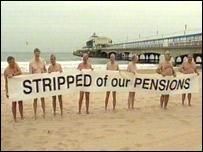 Special thanks are due to the mad souls who stripped off in front of a host of camera men and TV crews. We made the national and local news and even merited a half page photograph on the front page of the Daily Telegraph money section on Saturday 4th October. Special thanks are due to the mad souls who stripped off in front of a host of camera men and TV crews. We made the national and local news and even merited a half page photograph on the front page of the Daily Telegraph money section on Saturday 4th October.
The afternoon fringe meeting was attended by about sixty people. The majority were people who had lost their pensions and their MPs, but we also had representatives from the BBC, various pension journals and a TV crew who are making a documentary on pension wind-ups. This will be shown on BBC4 TV early next year. The meeting was introduced by Keith Plowman and presentations were made by Andrew Parr, Dr Ros Altmann, Dave Allen, Derek Wyatt MP, Kevin Brennan MP and Graham Goddard (Amicus). Thanks to all the speakers. If you would like a copy of the Powerpoint slides send us an e-mail
* * * * * * * * * * * * * * * *
Lib Dems demand compensation for pension scheme robbery
25th September 2003
The Liberal Democrats today issued a demand to the Government urging them to stop the injustice suffered by thousands of people who contributed to company pension schemes all their working lives only to lose out on all, or much of, their pensions nest egg on the eve of their retirement.
Currently when a company goes bust with its occupational pension scheme in the red, the pensions of those yet to retire are not protected. The pot of money has to firstly be set aside for those already retired, often resulting in there being little or nothing left for those yet to reach retirement.
The Government's proposed Pensions Protection Fund will only promise protection for occupational pension schemes that collapse after its introduction in 2005.
The Government has actively promoted the value of occupational pension schemes and has not adequately warned of the risks.
Steve Webb MP, Liberal Democrat Shadow Work and Pensions Secretary, has written to the Secretary of State, Andrew Smith, demanding that the people betrayed by Government assurances that their money was safe, be compensated.
Steve Webb MP said:
"Every week we hear about another group of workers who thought their pensions were safe and discover that the value of their nest egg has been slashed.
"The toll of victims mounts whilst the Government sits idly by. The Government is betraying a generation who worked hard and saved hard.
"The Government's Pension Protection Fund only promises to secure pension schemes from 2005. There must be provision for those who are and will be affected before then. The Government has a moral duty to compensate them."
* * * * * * * * * * * * * * * *
Meeting with Andrew Smith
9th September 2003
A small group from ASW (Sheerness & Cardiff) and Dexion met with Rt Hon Andrew Smith MP Secretary of State for Work and Pensions on the morning of Tuesday 9th September. This followed what we gather was a rather turbulent meeting that Andrew Smith had with the ISTC & Amicus on Monday 8th.
We presented our case for compensation, mainly based on the facts that nobody warned us of the risk and government action (through the 1995 Pensions Act) had meant that increased protection for pensioners had come at the expense of employees. Even today material from the FSA, NAPF and the DWP give risk warnings on personal pension plans but no risk warnings on occupational pensions
We detected a slight, but significant, shift in the government's attitude. Andrew Smith acknowledged that we had been let down by the system and said that he would not give false hopes but he was prepared to listen to suggestions. This is a million miles away from the reception we had last November when we were told that tough, that was the law and nothing could be done. Since then the government has blocked the closure of pension schemes by solvent employers such as Maersk and it is expected that the Queen's speech in November will
a) Introduce a pension insurance scheme
and
b) Ammend the statutory order of the 1995 Pensions Act which is the cause of much of our problem
The major points we made are in the attached briefing paper, and, with the help of Dr Ros Altmann, (to whom we are deeply indebted) we presented a proposal for compensation which would have little cost (in government terms) The details of this compensation proposal are also attached.
Essentially wound up pension funds would be combined into a common fund which would be used to pay pensions as they become due. This avoids the major losses incurred by purchasing index linked annuities. It is calculated that this gives the government a breathing space of at least five, and possibly as much as ten, years. Thereafter a very small amount of government cash is required each year. The money required is finite, calculable and bounded. Even if we are out by a factor of ten the proposed scheme is still viable.
It is a very good sign that Andrew Smith asked Ros Altmann to visit the DWP and discuss the proposals with DWP officials.
Note the suggestion of 1997 as a suggested start date for compensation. Although there have always been pension wind-ups we think the vast majority of failed schemes where people lost significant amounts of their pension are post this date. This reasoning is based on the fact that until this time annuity rates were high and pension funds were healthy. The 1995 Pensions Act with its inequitable statutory order also became active in 1997. If you fall outside this window please let us know. The "where do you draw the line" is one of the DWPs arguments for not compensating people. 1997 seems sensible.
Also note the proposed caps which are included to reduce the costs of the scheme. These should not affect the average person. Again please let us know your thoughts.
We also spoke with Steve Webb MP (Liberal Democrat spokesman on pensions) and Oliver Heald MP (ditto Conservatives). We explained the points that we had put over to Andrew Smith. Both indicated that they would examine our proposals and support them if their research showed the proposals were viable. We felt these discussions were worthwhile as both MPs seemed to understand our problems (which was unusual nine months ago)
Our final meeting was with the Plaid Cymru MP Adam Price who first showed the relevance of the EU Article 8. We went briefly through our proposals but spent most of the time discussing possible routes of legal action including human rights. You are probably aware that legal action will almost certainly be taken jointly by the ISTC and Amicus and there is a high probability that a Legal Aid funded case (aided by Adam Price) will also be brought.
We had good media coverage including MoneyBox from Radio 4 who reported on our meetings on Saturday 13th September.
Note added Wednesday 25th June 2003:
Frank Field's Bill did not get heard on June 20th. As feared it was talked out of the house by the two previous bills.
There is a small possibility it may be heard on Friday July 11th, but even if it is heard the chances of it being completed in this session of parliament are slim.
Andrew Smith (Secretary of State for Works & Pensions) has agreed to meet people from ASW and UEF. We have no further details, not even a date, at present.
The ISTC have issued a press release which can be found on the documents page
Note added Saturday 14th June 2003:
Many thanks to everyone who attended the march on Sunday 8th June. We think there were about 500 people on the march, it certainly looked impressive on the television. The petition handed in to number 10 from ex-employees of a wide range of companies contained over 1,000 signatures. Special thanks to the three MPs who attended and spoke on the day: Derek Wyatt MP, Oliver Heald MP and Rt Hon Frank Field MP. Special thanks also to everyone else who made speeches at the end of the march, and the people from ASW Sheerness who organised an excellent day.
Overall we had very good media coverage both before, on the day and afterwards. Two excellent articles from the FT and Telegraph have been added to the Media Comments section of the web site.
Andrew Smith's announcement in the house on Wednesday 11th June was a mixture of good news and bad news. The good news was that the government have acknowledged that there is major problem with the security of defined benefit pension schemes, and have stated that a pension insurance scheme, (based on the American Pension Benefit Guarantee Corporation) will be established by 2004 or 2005. Details of this American scheme can be found here: https://www.pbgc.gov/about/factsheets/page/guar-facts
The bad news is that no real mention was made of compensation for people who have already lost their pension. This was widely reported in the media as "there will be no compensation". Examination of the Hansard report below, however, shows Andrew Smith is still willing to listen to proposals and compensation was not ruled out.
Derek Wyatt MP and Frank Field MP met Rt Hon Andrew Smith MP, Secretary of State for Works & Pensions on Thursday 12th June. They discussed making the proposed insurance scheme retrospective, analyzing the implications of the Orphan Funds and Frank Field's Private Members Bill. Andrew Smith agreed to meet the pensions group from ASW Sheerness.
We now have the moral high ground because the government have admitted there is a very real problem. We must continue to push our case. Write as many letters as you can to every newspaper. Contact local TV & Radio stations. Complain to Andrew Smith at the Department of Work and Pensions. Make ourselves heard.
Points to make are.
Nobody warned us of the risk, in fact until recently joining a company pension scheme was a condition of employment. The Inland Revenue would not allow you to have a company and a private pension at the same time so the government forced us to accept the risk without telling us. For Private Pensions and Endowment Mortgages the government has said compensation should be paid if people were not warned of the risk when they were sold the product. Similar rules should apply to us.
There are precedents for retrospective payments, the Mirror Pension fund received retrospective compensation (and in the Green paper the increase of this finance is proposed) How can retrospective payments be made for fraud, and no retrospective payments made when a scheme is prematurely closed through no fault of its members?
Frank Field's bill is scheduled for Friday 20th June. It is third on the day so it may not be heard in full.
Pensions Debate Wednesday 11th June 2003
The full content of Wednesday's debate can be seen in Hansard here:
Contrary to what the press says, the question of compensation was not dismissed outright. References to compensation are:
Mr. Smith: I have taken note of the proposals of my right hon. Friend the Member for Birkenhead (Mr. Field) about orphan assets. The Under-Secretary of State for Work and Pensions, my hon. Friend the Member for Liverpool, Garston (Maria Eagle) pointed out in the debate last week that just because those assets are unclaimed does not mean that they do not belong to anyone. She also said, however, that she and I stand ready to meet people and to engage constructively with any sensible proposals on the subject. The experience of workers at Allied Steel and Wire and others who have suffered so cruelly shows why it is so necessary that we introduce these protection measures and get on with it.
Mr. Derek Wyatt (Sittingbourne and Sheppey): As my right hon. Friend knows, ASW workers in Sheerness were made redundant last July and their pension funds were put into administration. Although they will be pleased to learn of the protection measures, there will be heavy hearts in Sheerness and Cardiff, for 1,350 have lost their pensions. If my right hon. Friend cannot accept the recommendations of my right hon. Friend the Member for Birkenhead (Mr. Field) in relation to the capping of banks and building societies, will he find another solution? I know of 41 companies in the UK in which the same thing has happened during the last 18 months. Two billion pounds would be needed. That is not much money, and this is a very serious matter. It was a condition of employment for ASW workers that they would have both the jobs and the pensions. They thought that they would receive pensions, but they will not.
Mr. Smith: I understand how my hon. Friend feels, and, more important, I understand how his constituents feel. A number of my own constituents were affected by the Maxwell pensions saga. As I have said, it is because of the seriousness of those people's position that we are introducing the measures that I have described. As I told my right hon. Friend the Member for Birkenhead, I stand ready to engage in meetings and to consider any constructive proposals, but I do not want to raise false hopes.
Adam Price (East Carmarthen and Dinefwr): As the Government looked into the idea of a pensions insurance system four times and, by the Secretary of State's own admission, in rejecting it on those occasions they got the decision wrong, do they not have a moral responsibility to those at ASW, Blyth and Blyth and other companies? I urge the Secretary of State to look at the experience of the US Pension Benefit Guaranty Corporation, which we are led to believe is the template for his proposal. When it was established in 1974, it brought more than 200 companies retrospectively under its provisions. Surely natural justice dictates that rights promised be rights that are also delivered for the workers who have inspired the Government to change their policy.
Mr. Smith: As I said, the legislation is yet to come forward. The insurance fund is yet to be established. Therefore I cannot give the undertaking that the hon. Gentleman is seeking, but I listen carefully to the points that he makes, and will reflect on them.
Julie Morgan (Cardiff, North): I welcome my right hon. Friend's proposals, but I express my deep disappointment that they do not appear to cover the steel workers from Allied Steel and Wire in Cardiff and Sheerness, many of whom are my constituents. Will he look at a possible way of helping those people, who invested their life savings in pensions and are now likely to get nothing? Is there any possibility that they might benefit from this legislation if, by the time that it is introduced, their pension fund has not been wound up?
Mr. Smith: I understand how my hon. Friend and her constituents feel about this issue but as I have said, nothing could be crueller than for me to say that this legislation will offer them help when I do not envisage at this stage that it will apply in the way that she advocates. Every hon. Member knows of the difficulties in introducing such proposals and then applying them retrospectively-not the least of which is the very difficult question of where we draw the line. I am afraid that we will always find tragic cases that fall the wrong side of any line that we draw.
- - - - - - - - - - - - - - - - - - - - - - - - - - - - - - - - - -
Press Release from Frank Field MP & Derek Wyatt MP
Frank Field, Member of Parliament for Birkenhead, and Derek Wyatt, Member of Parliament for Sittingbourne & Sheppey, are introducing a backbench Bill to ensure that when occupational schemes close – “wind-up” – the assets are distributed fairly.
At present when an occupational scheme winds-up the Pensions Act 1995 offers much greater protection to those members who are already receiving their pension than to those members who are still working for the firm or have moved to another firm but are not yet drawing the pension.
Recently the Allied Steel & Wire Company, based in Derek Wyatt’s constituency, wound-up their pension scheme. Pensioner members of the scheme received their full pension while workers and those who had transferred to other firms got just 50 per cent of their pension rights.
Frank Field today commented “It is unfair that workers can lose 50 per cent or more of their expected pension rights while pensions in payment receive a high-degree of protection. The Government has rightly recognised this injustice and I hoping that they will work with Derek and I to shape this Bill.”
Derek Wyatt commented “Most of our people thought the occupational pension crisis ended when the Maxwell scams were addressed. Not so. cccupational pension schemes that are in deficit is this Government's simmering "poll tax" issue. There has to be a balancing of these funds retrospectively and I fully support Frank Field's clever solution to this issue. Going forward I believe the Government must use National Insurance as a way of compensating occupational pension schemes that get into debt.”
The new Bill will propose a fairer distribution of assets on the winding-up of a scheme by offering every member of the firm the same level of protection for their particular share of the assets. This will be at no additional cost to occupational schemes.
The Pensions (Winding-Up) Bill will propose 4 other measures:
1. A Government review of the status of pensions related debt on insolvency. Pensions debt is currently ranked the lowest of all debt when a firm ceases to trade.
2. A limit on the fees charged by professional advisers. During the winding-up process. Recently there was a case of a £5m occupational pension fund where the advisers took fees of £800,000 from the fund in return for administrating the wind-up. The Bill proposes that fees are limited to the greater of 1 per cent of the fund’s value or a sum determined by the Secretary of State.
3. Workers such as those at Allied Steel & Wire have suffered losses in expected benefits of about 50 per cent due to the current wind-up rules. Membership of their scheme, as with many other schemes, was originally a condition of employment and members of final salary schemes such as these were very seldom warned of the risks. The Bill will therefore suggest that a distribution is made from unattributed assets listed on the Unclaimed Assets Register. Only those assets where the last contact with an owner was before 1900 and where every reasonable effort has been made to locate the rightful owner would be distributed in this way. The proceeds from this will be used to provide some compensation to those adversely affected by the scheme wind-up rules.
4. The Bill introduce a levy scheme on occupational pensions to ensure that where an insolvent employer winds-up an underfunded scheme, there are funds available to top the scheme up to a pre-specified funding level (currently the Minimum Funding Requirement). Such a scheme has been suggested by the Faculty/Institute of Actuaries.
EU Insolvency Directive
Michael Leahy, General Secretary of ISTC, has confirmed in a press release that the union has appointed Thompsons Solicitors to advise it on a possible legal action against the UK Government for failure to correctly implement the 1980 European Insolvency Directive. Commenting, Mr Leahy said:
"The ISTC has appointed the pensions team of Thompsons Solicitors to advise us on whether we can pursue a case on behalf of our members against the UK Government for failure to adequately implement the 1980 Insolvency Directive. Should we find evidence that they have done so, we shall begin proceedings against the Government on behalf ISTC members at the ASW steel plants in Cardiff and Sheerness. They face the prospect of losing a large amount of their expected pension income following the decision to wind up the scheme at each plant when each was in deficit following the appointment of Receivers in July of this year."
"This is a complex issue and the initial research will take some time and we not wish to raise our members hopes only to have them dashed. However the ISTC believes that it is scandalous that workers can save for up to 30 years - as did some ISTC members at ASW - and have their expected pensions snatched away from them if their employer becomes insolvent"
|